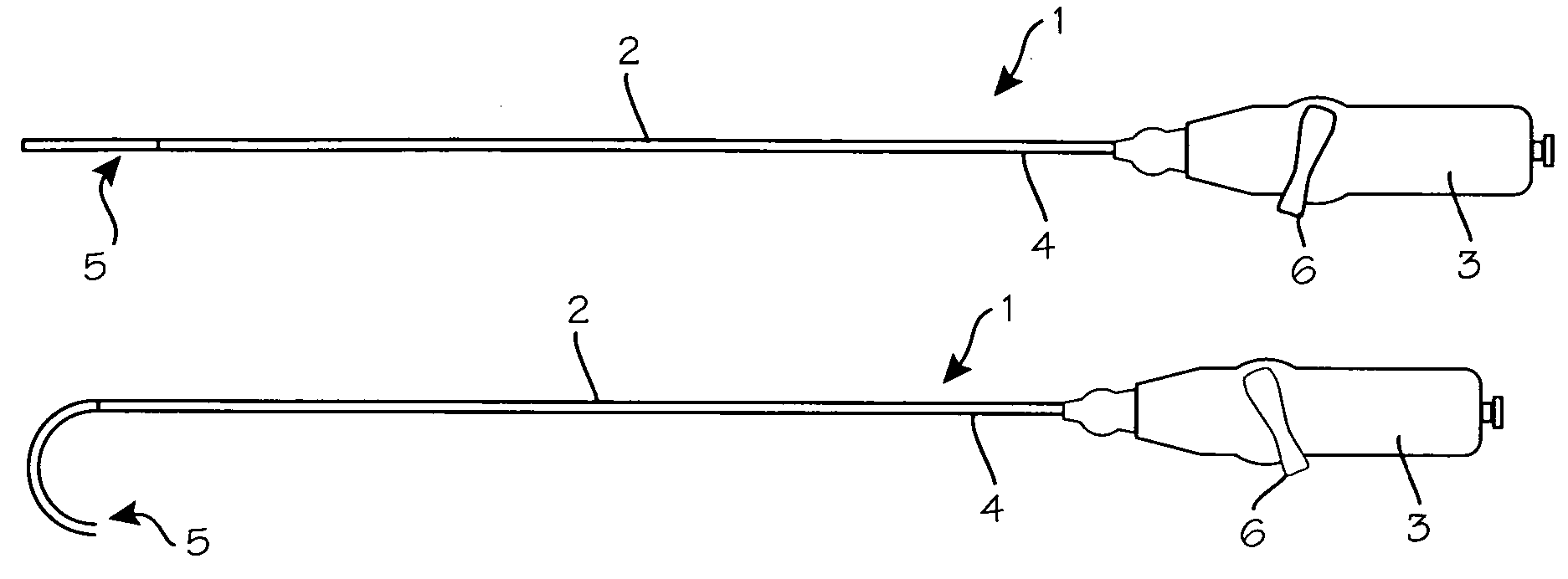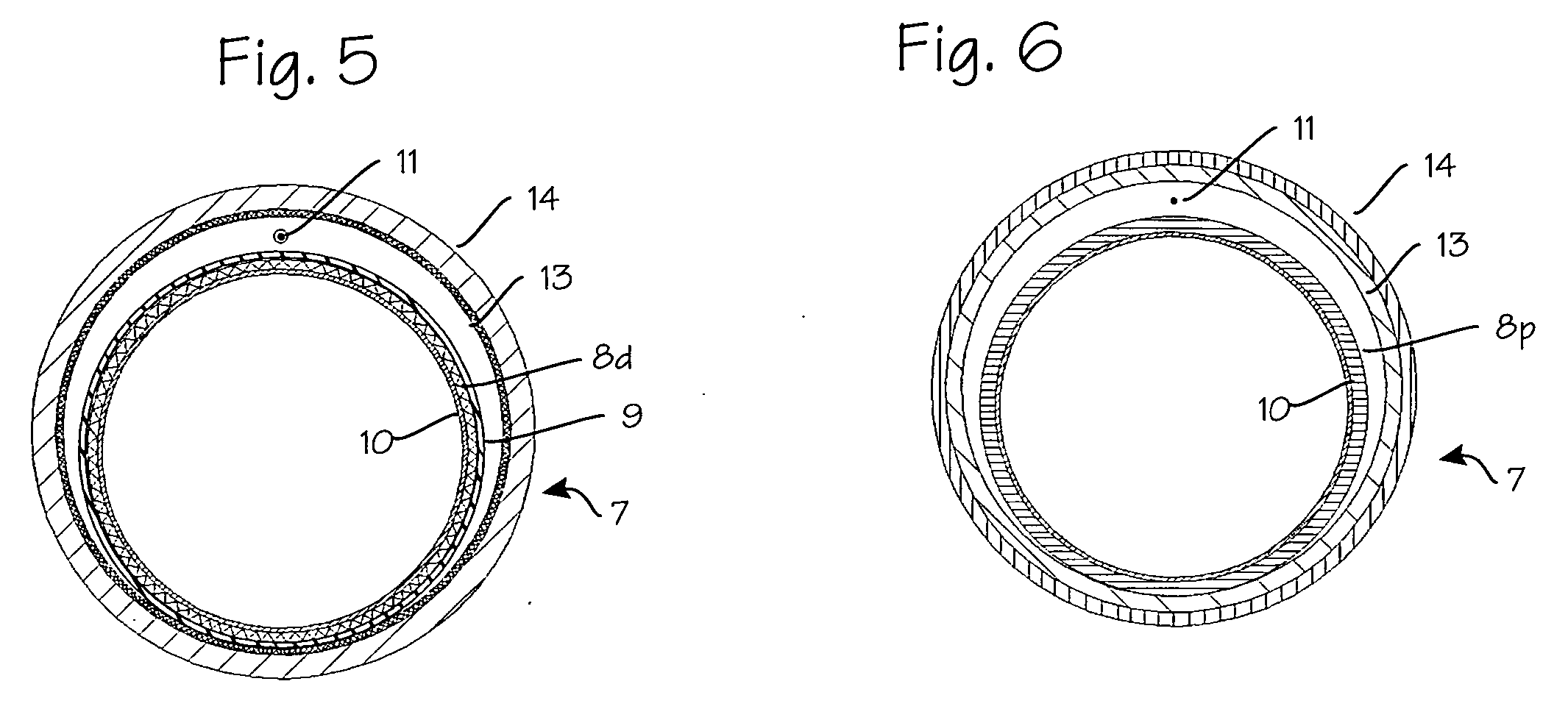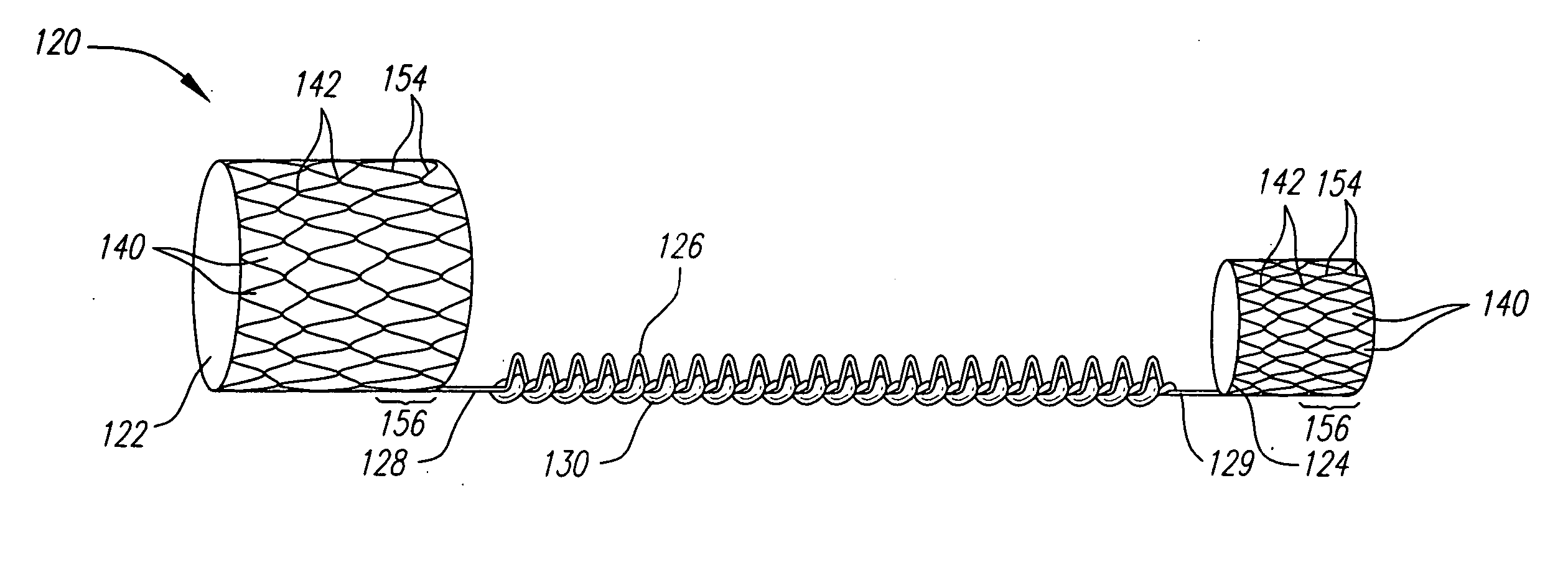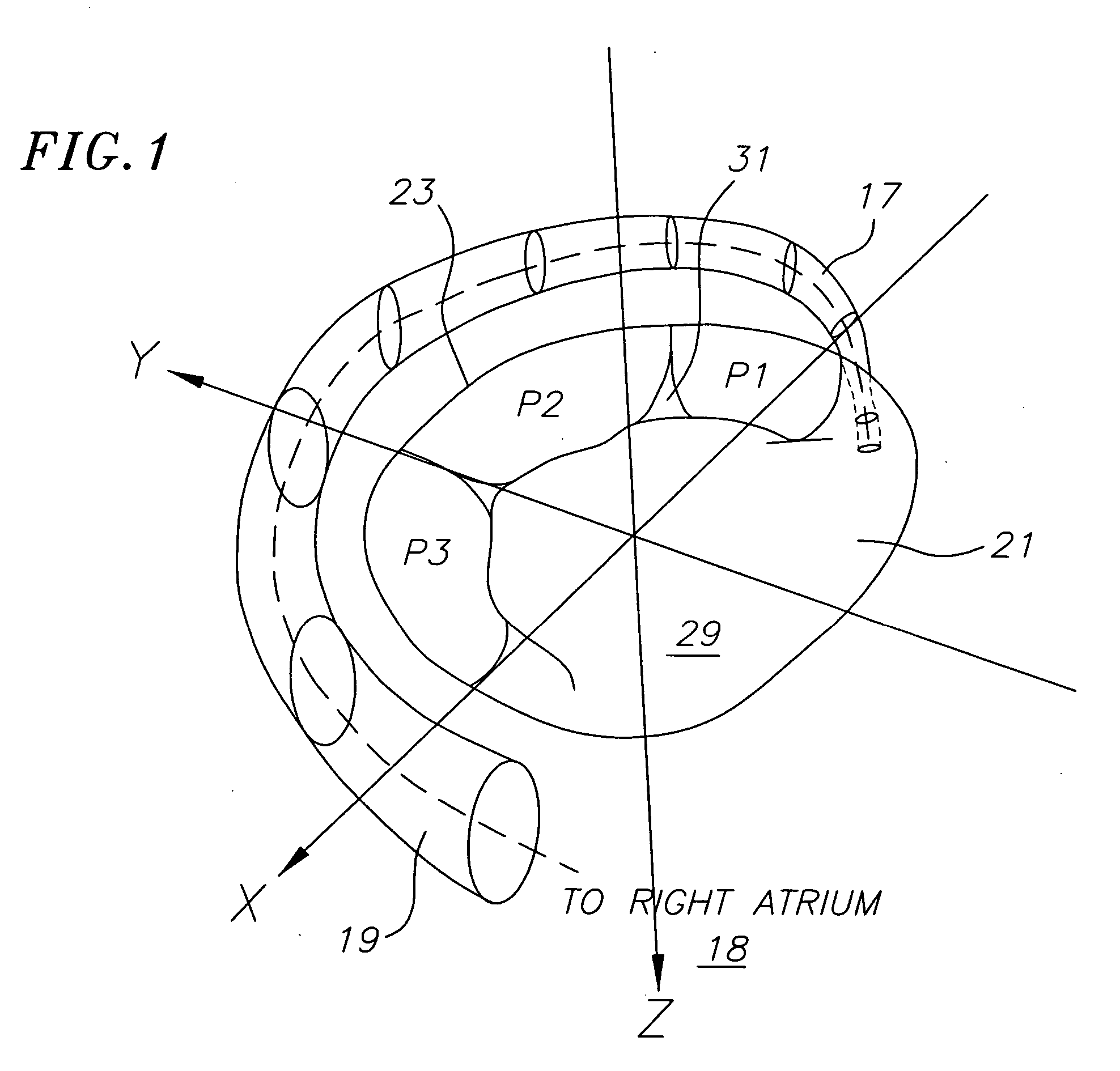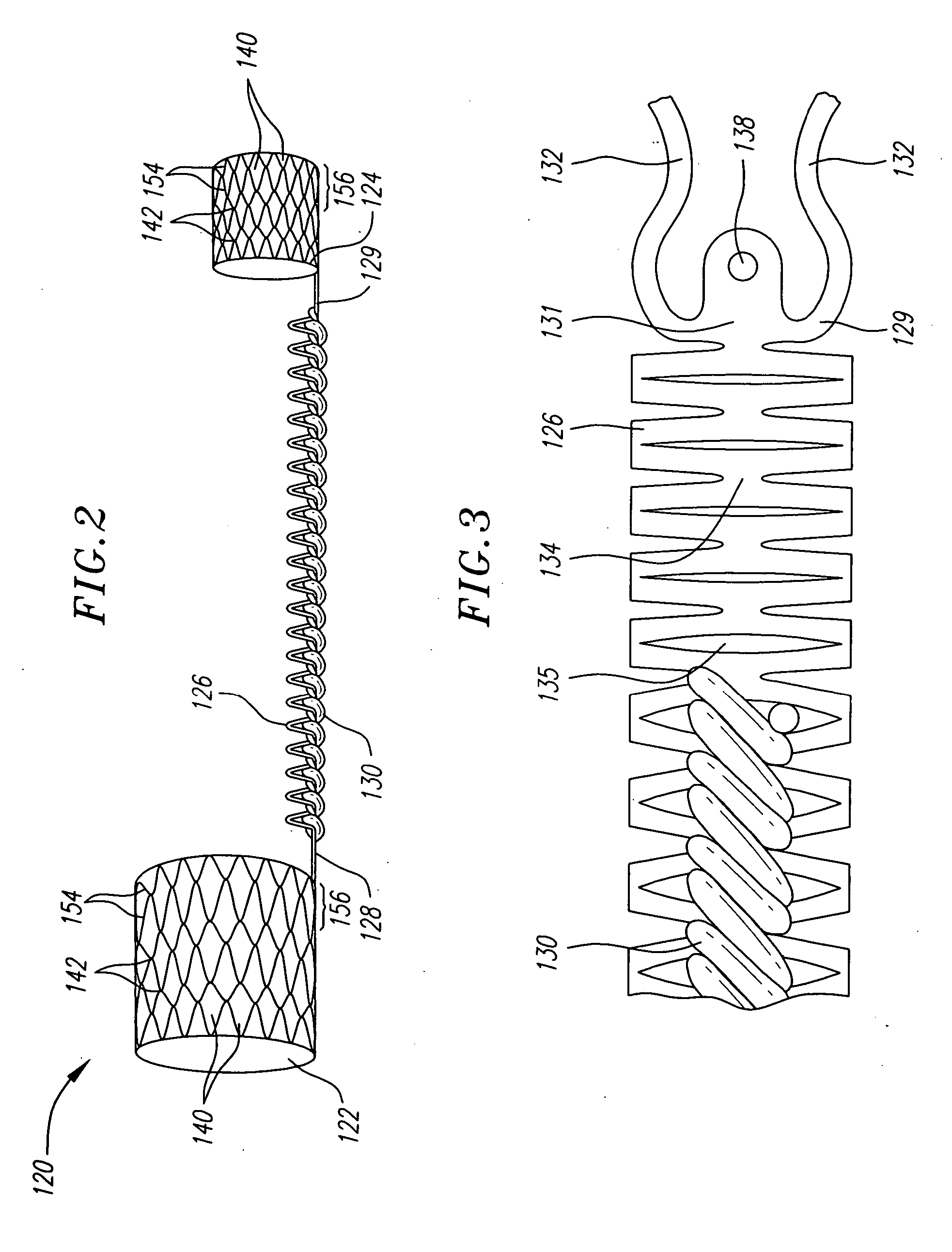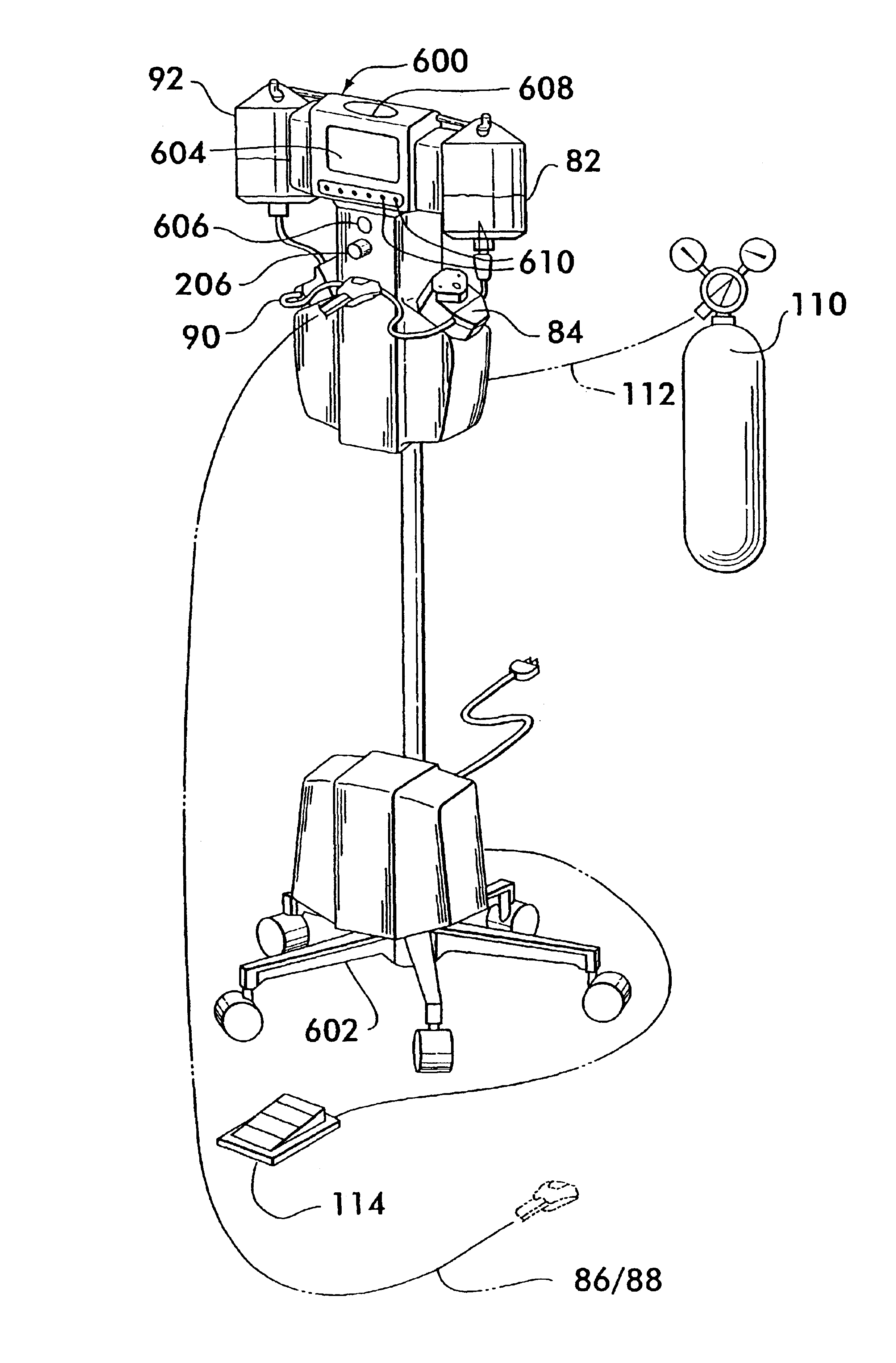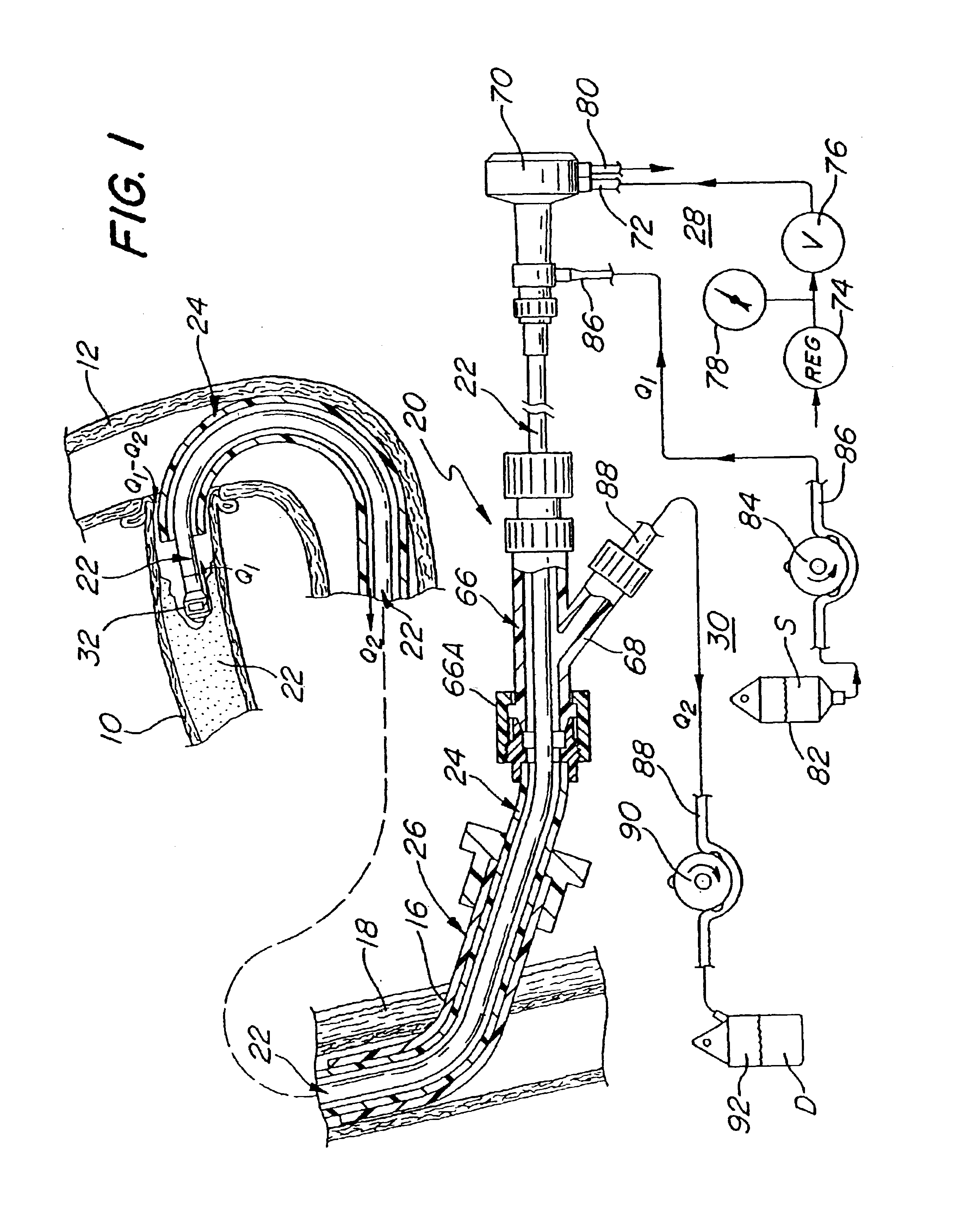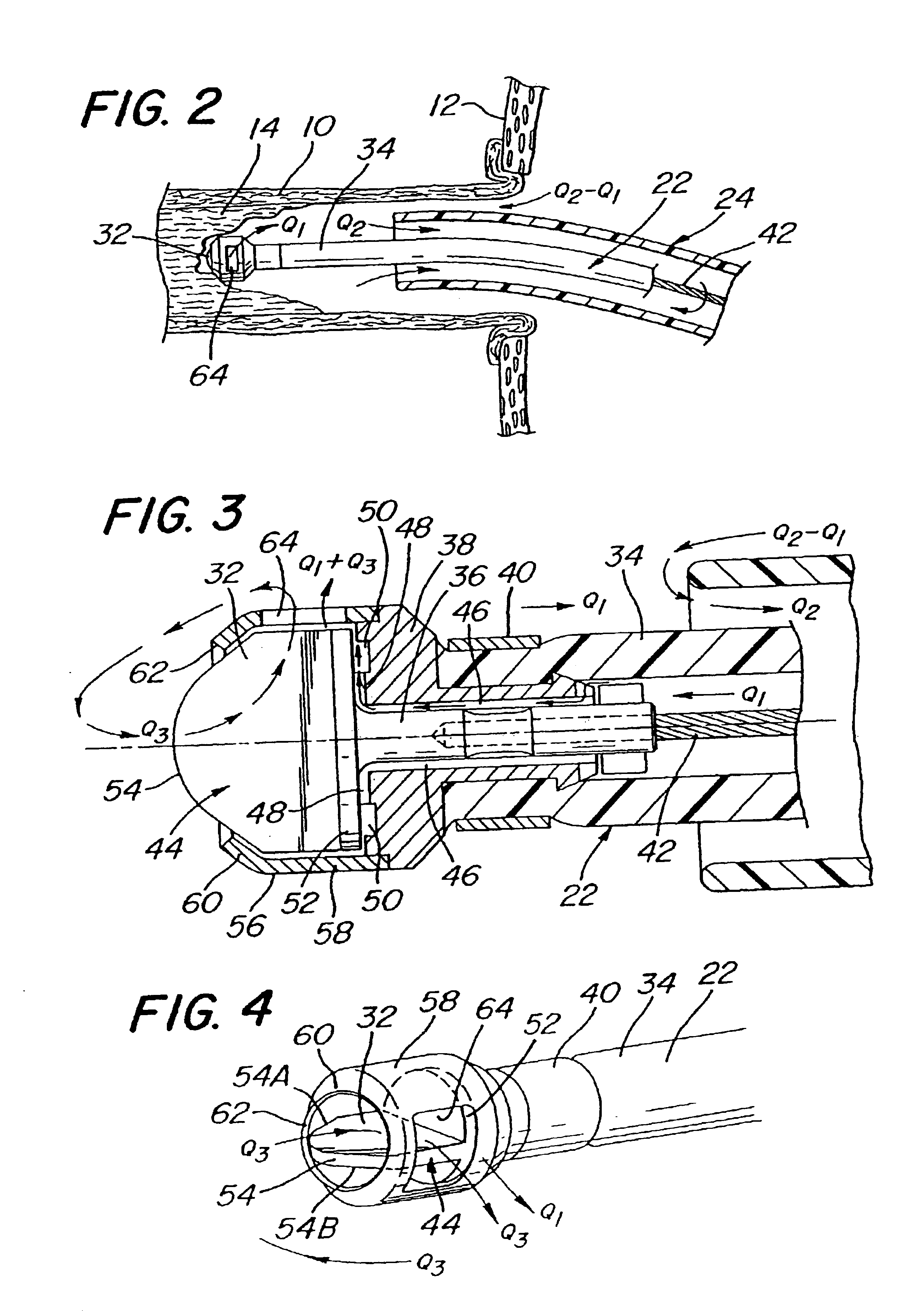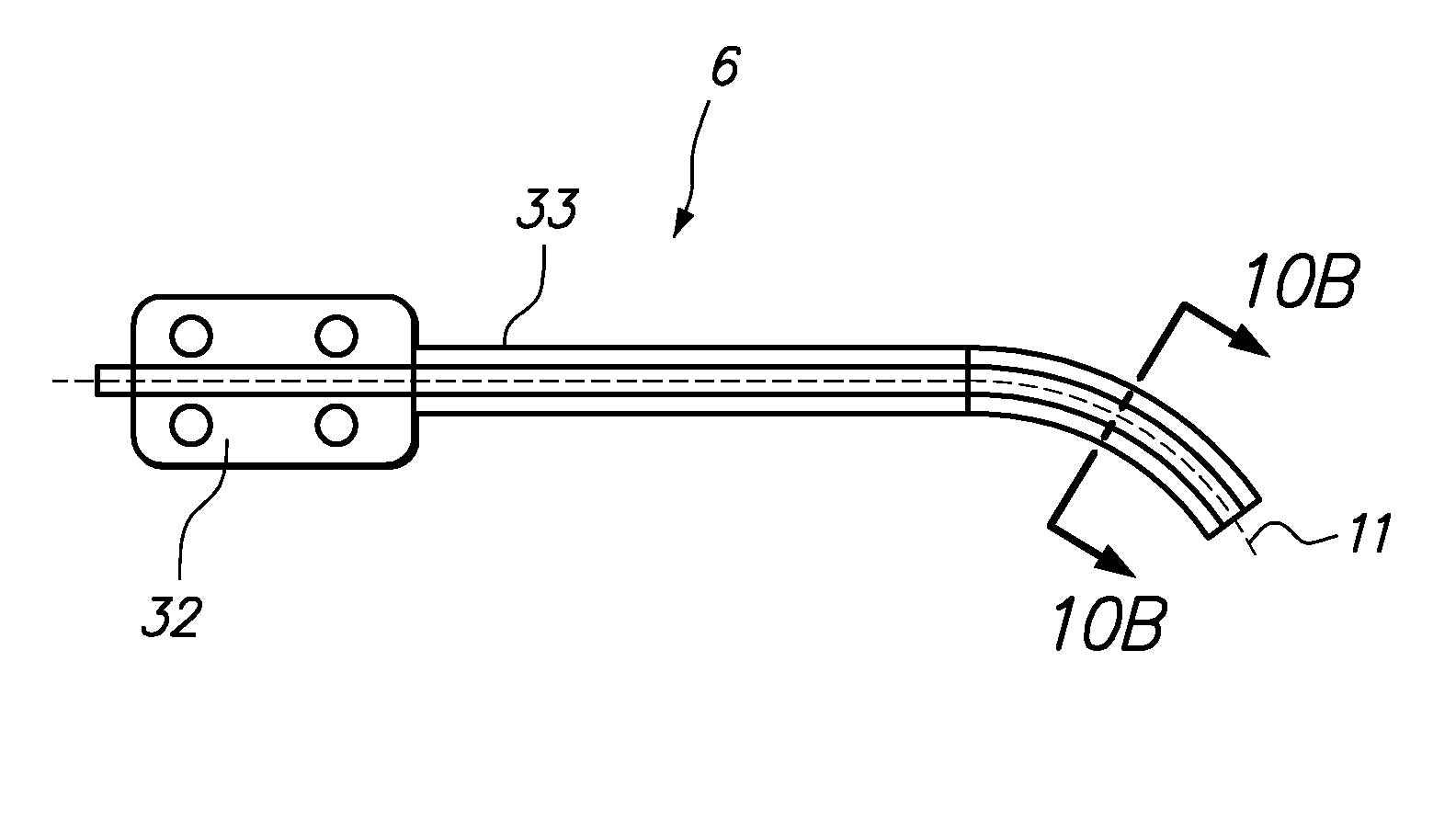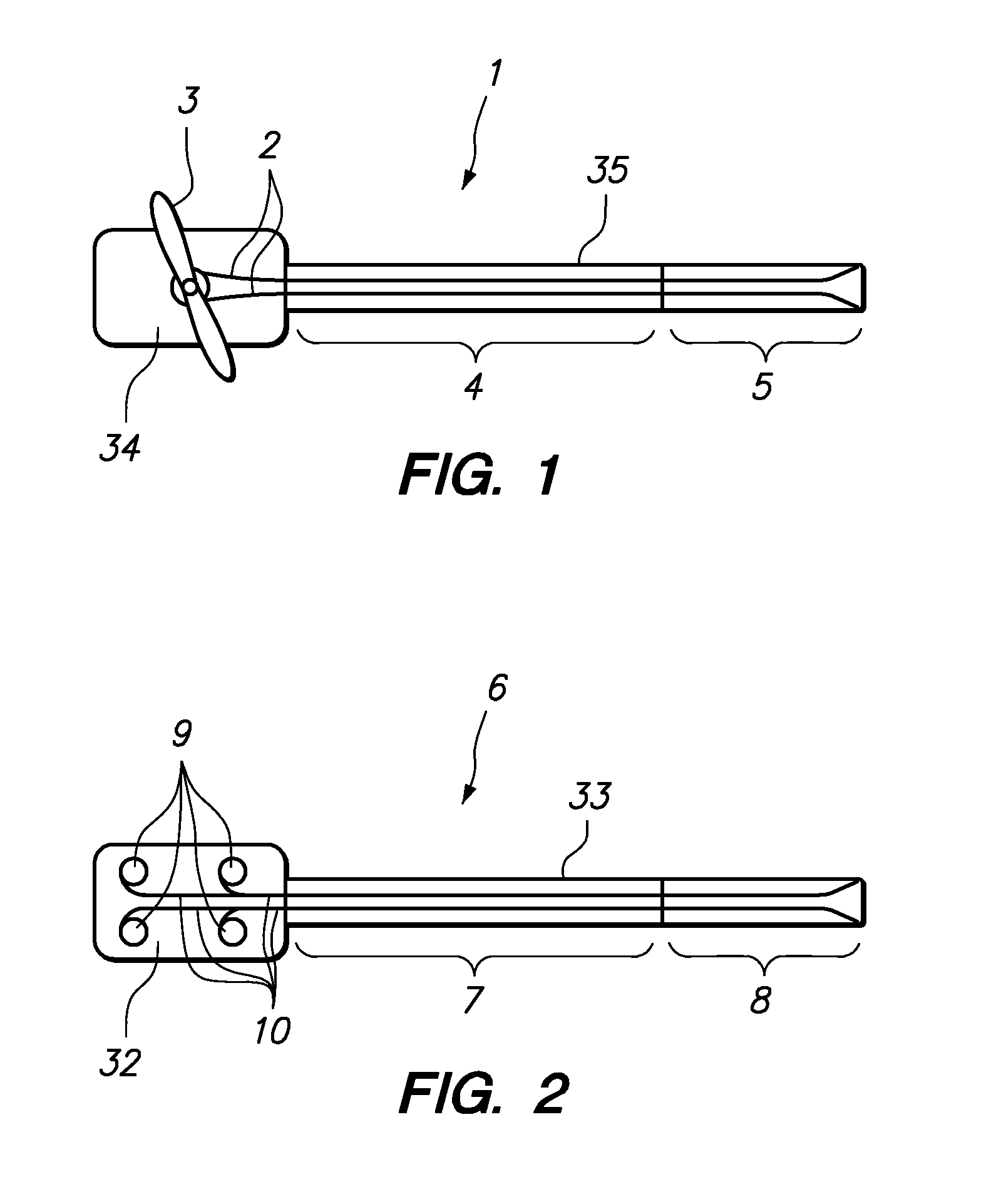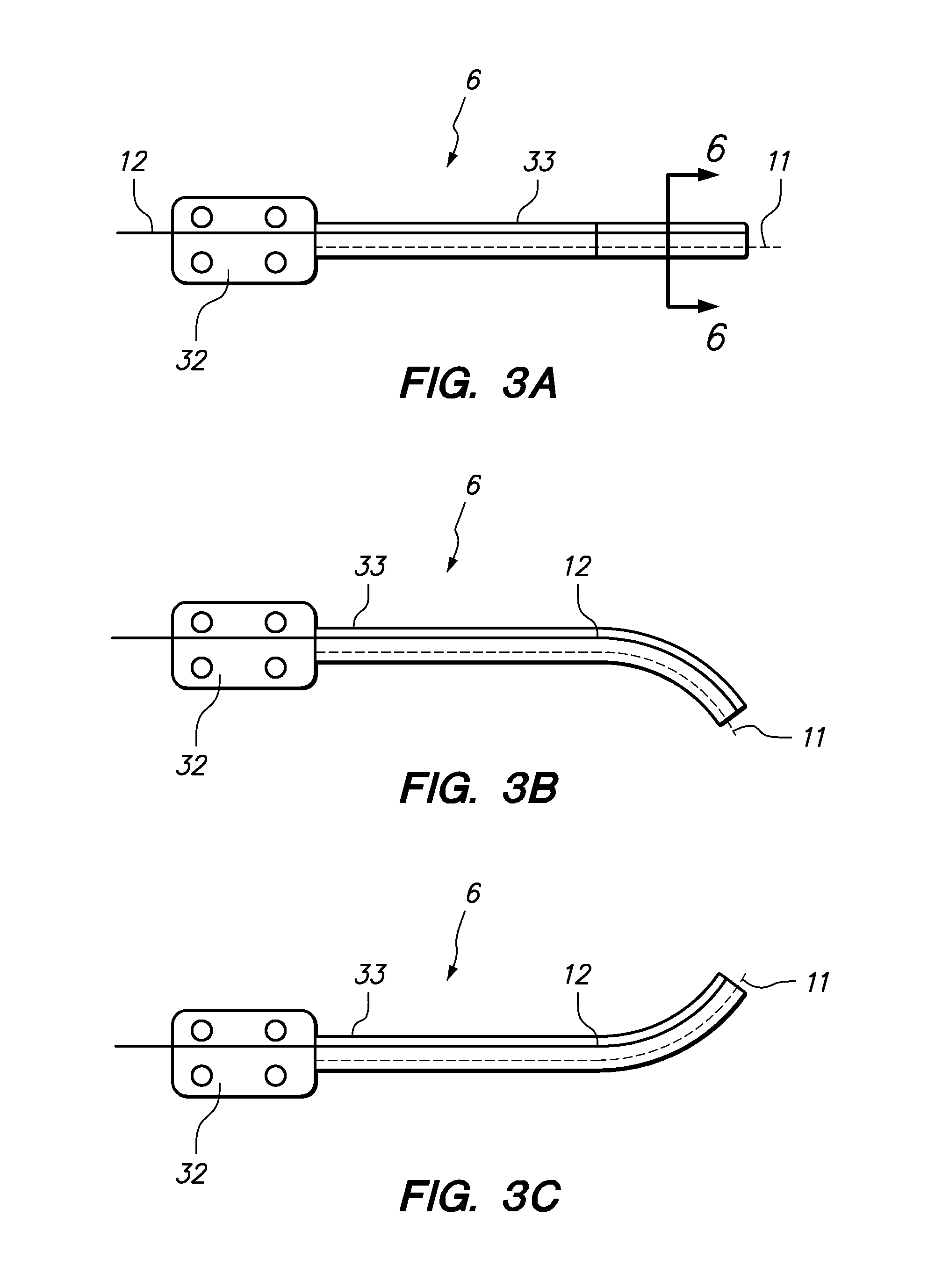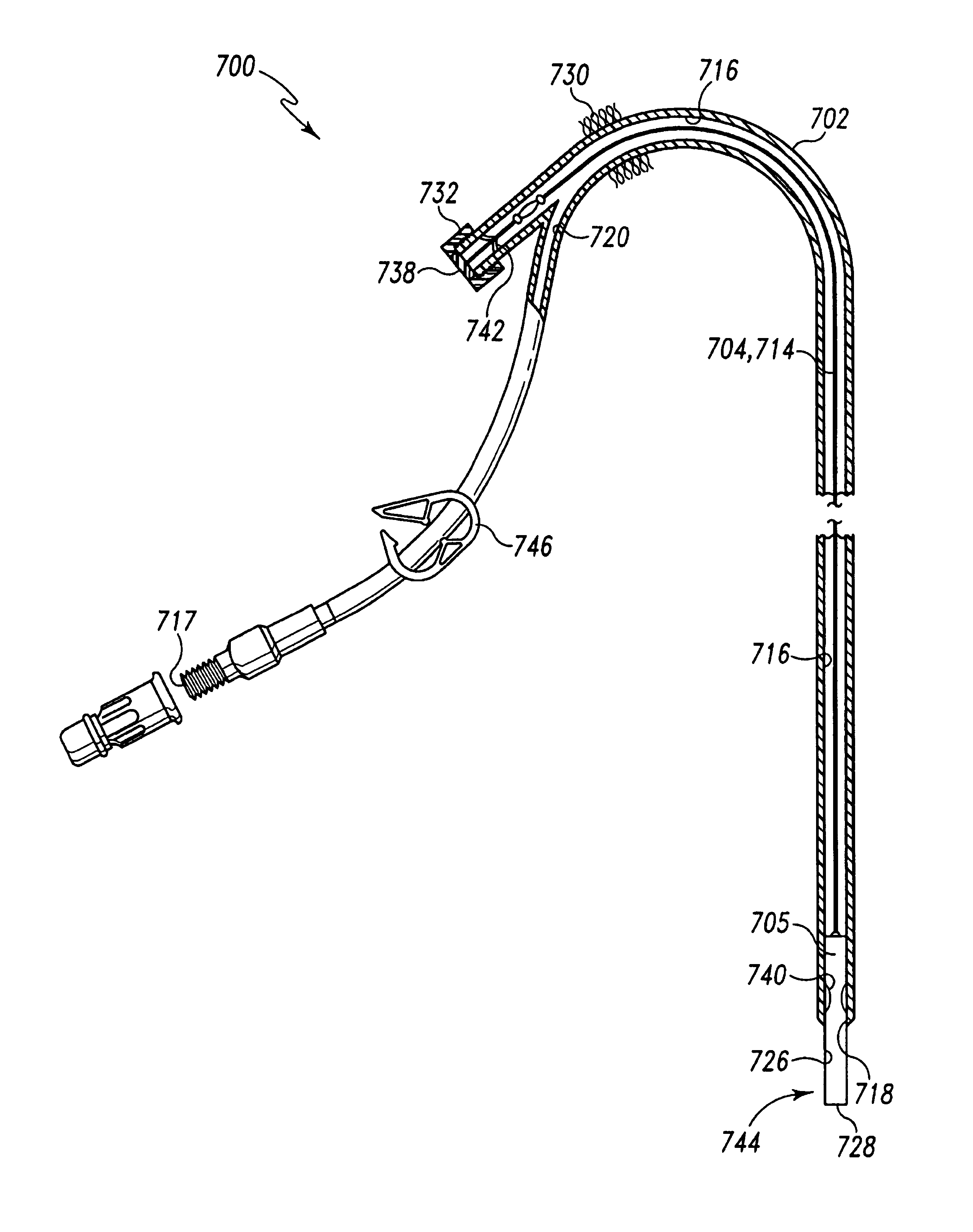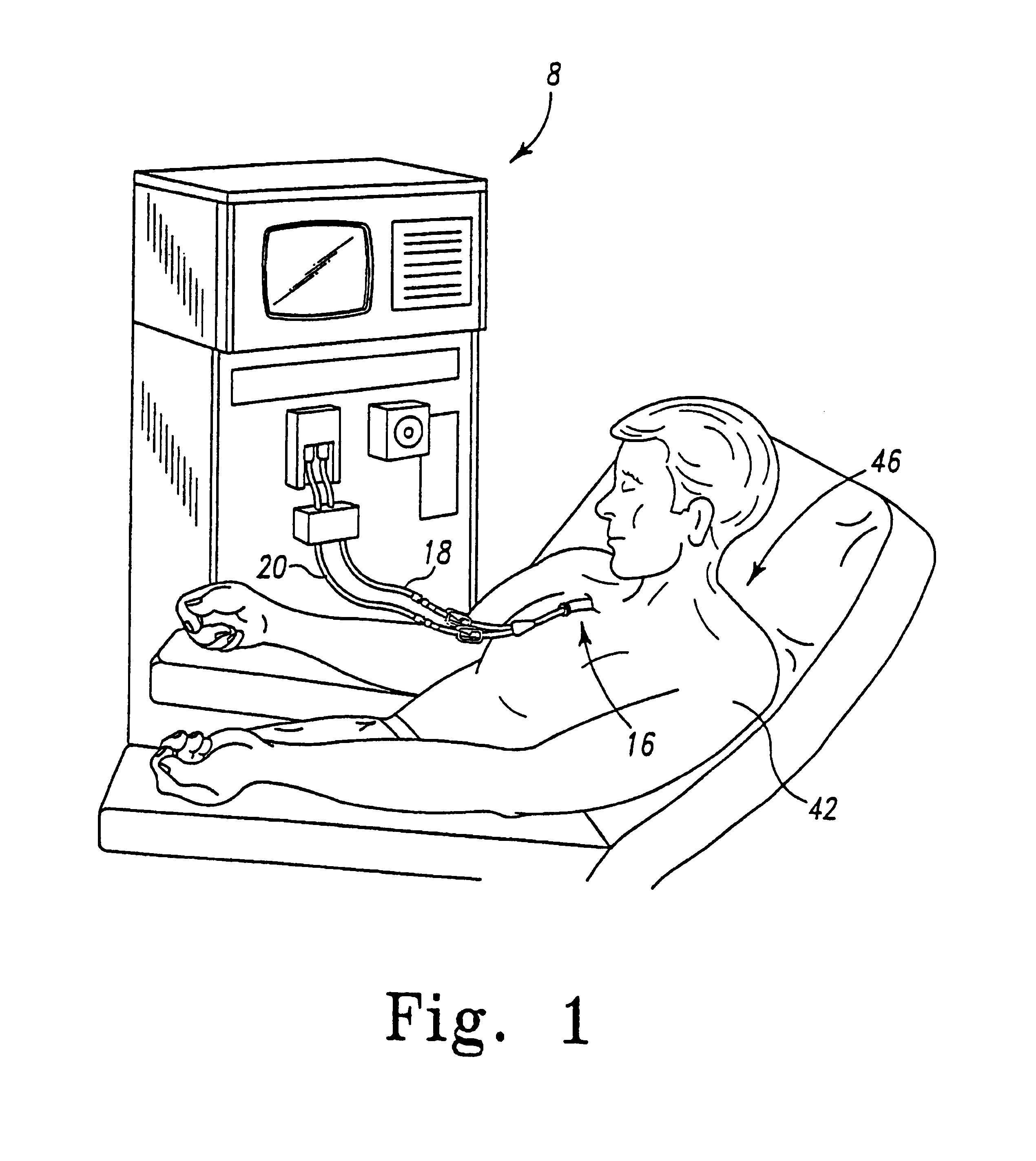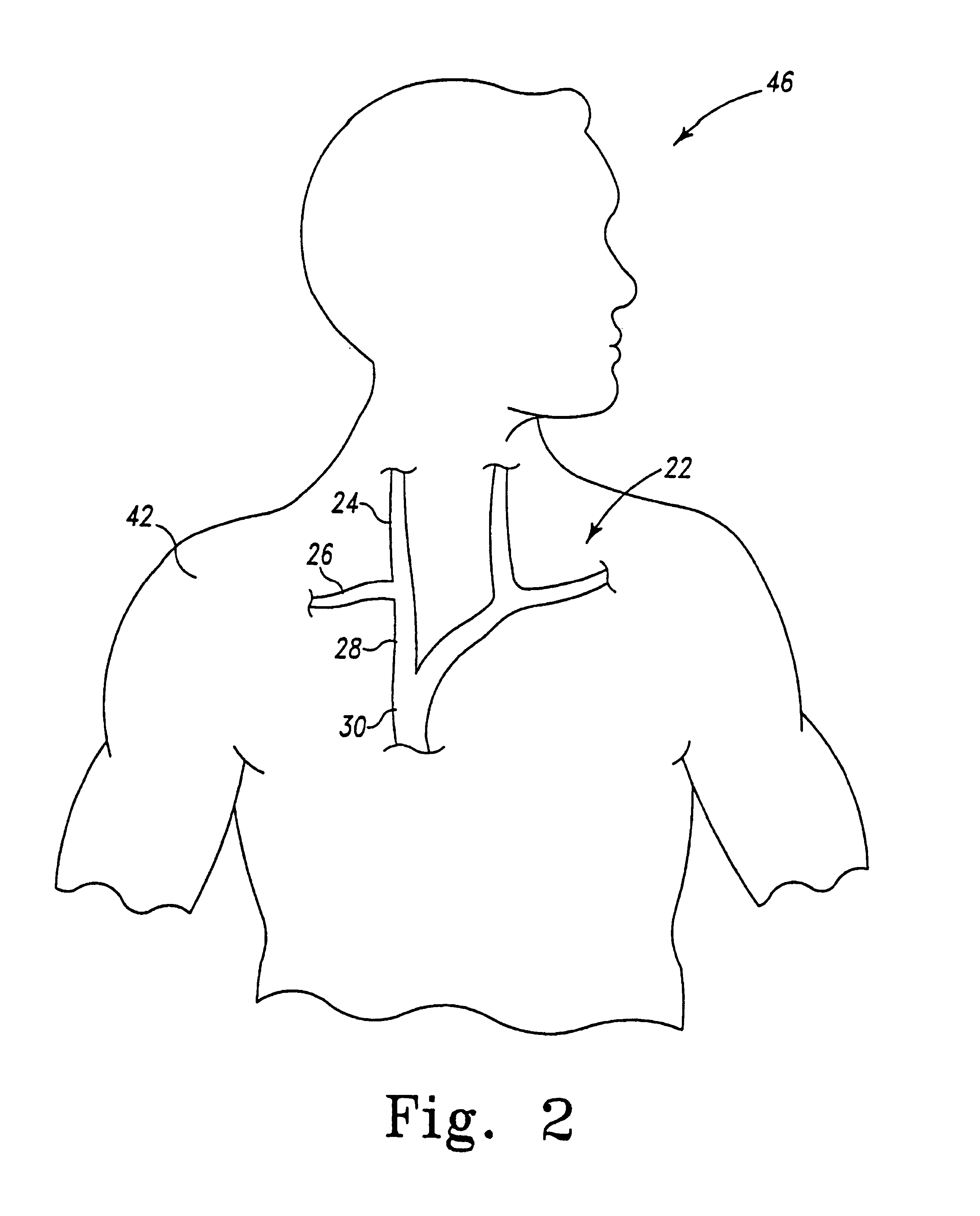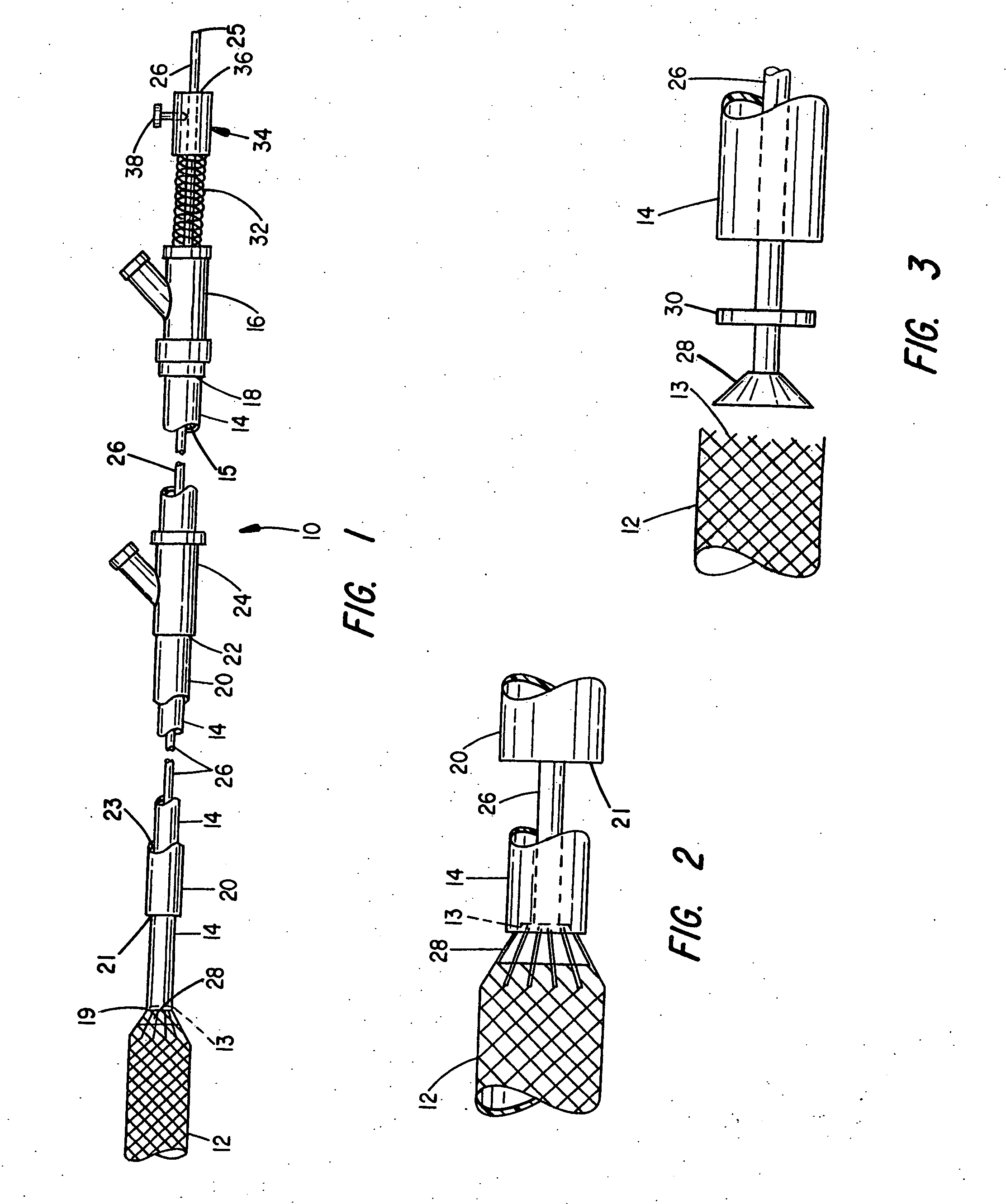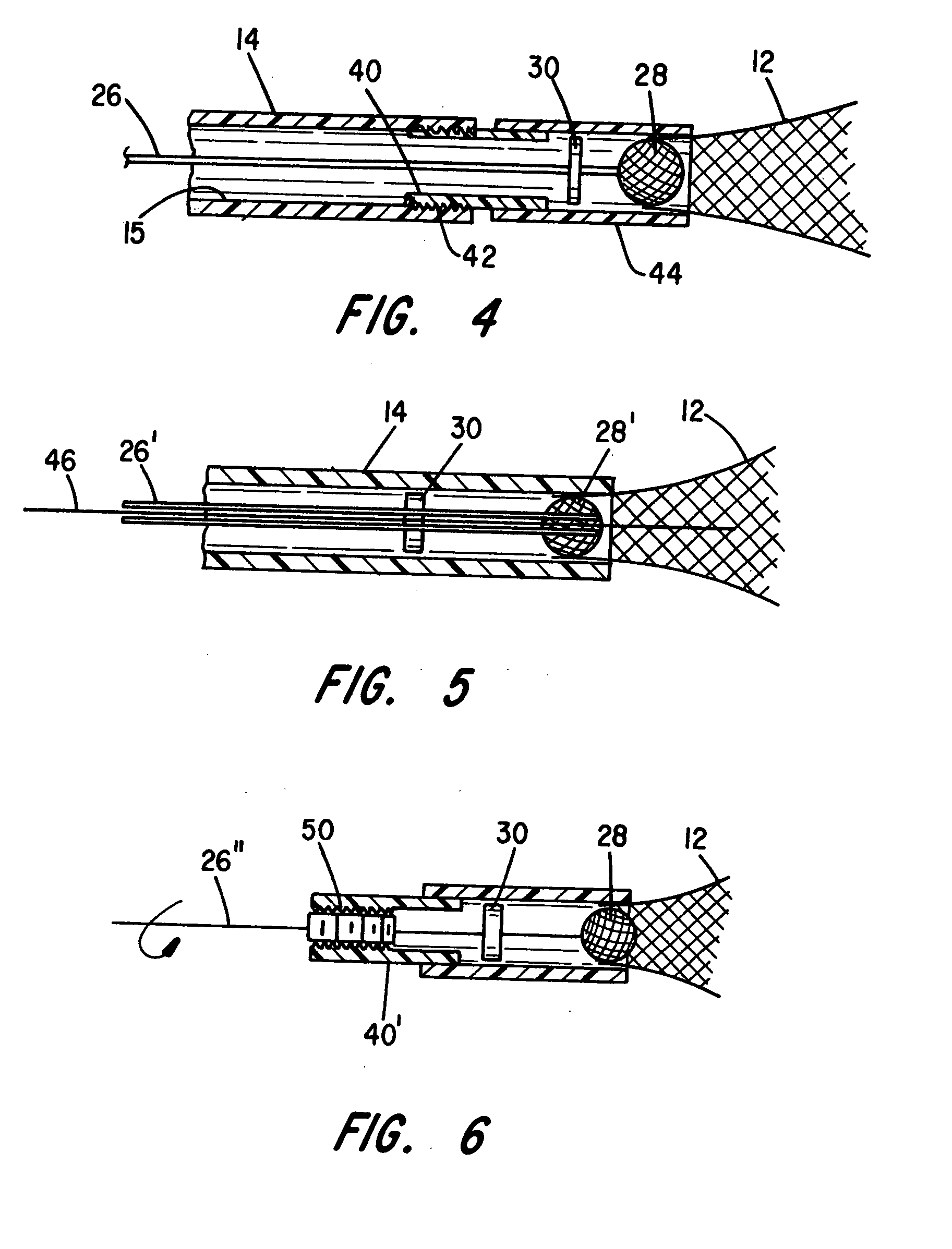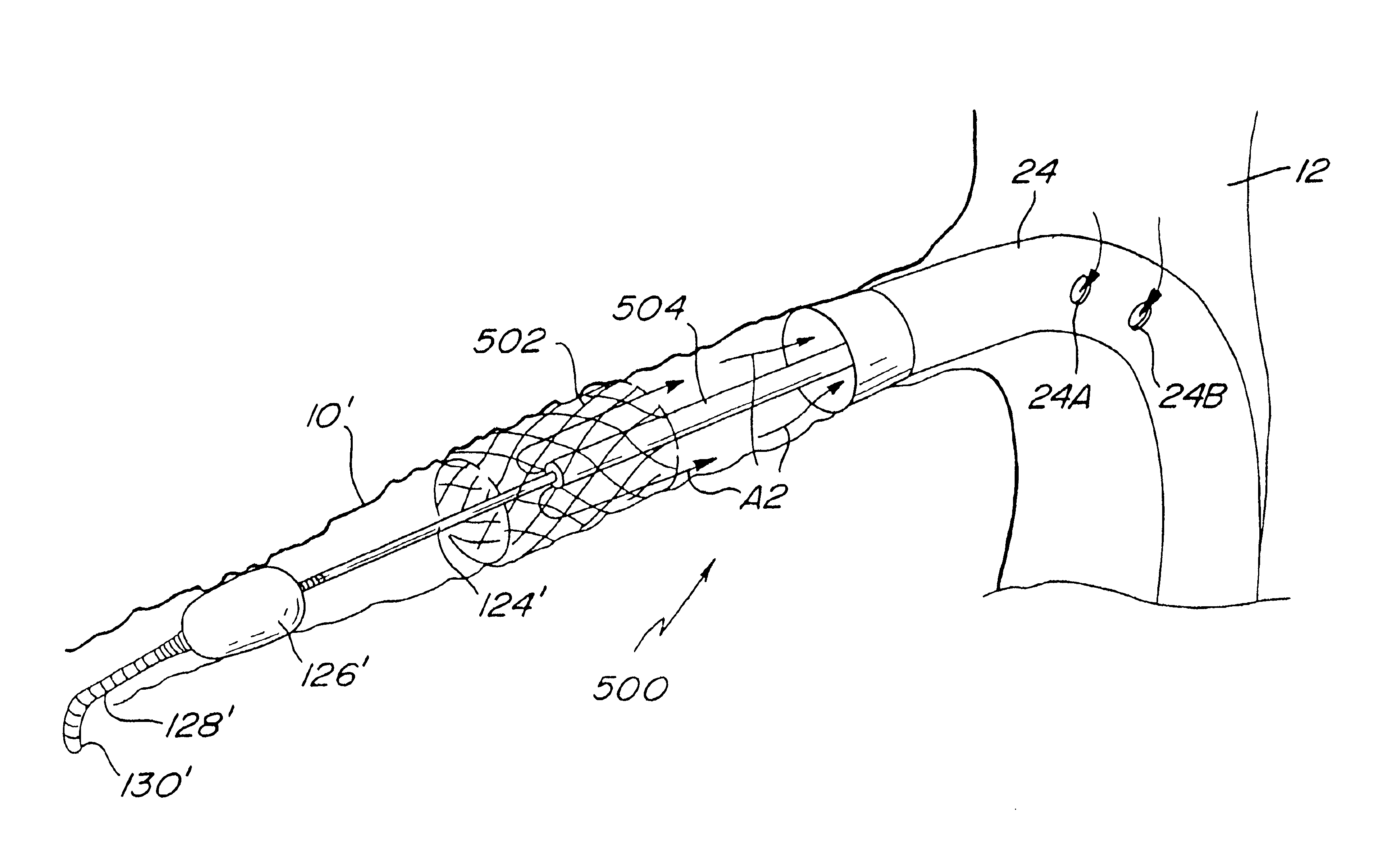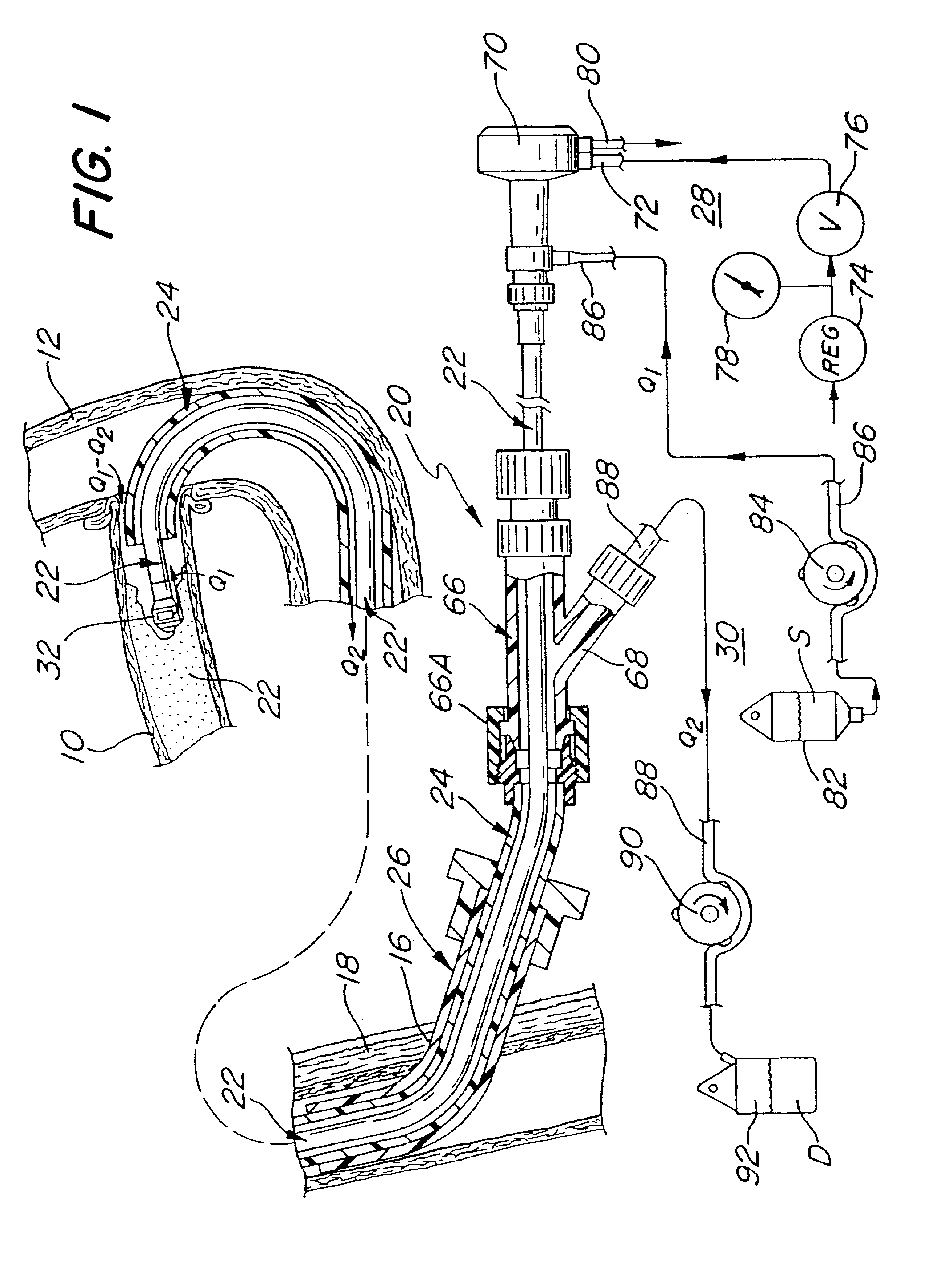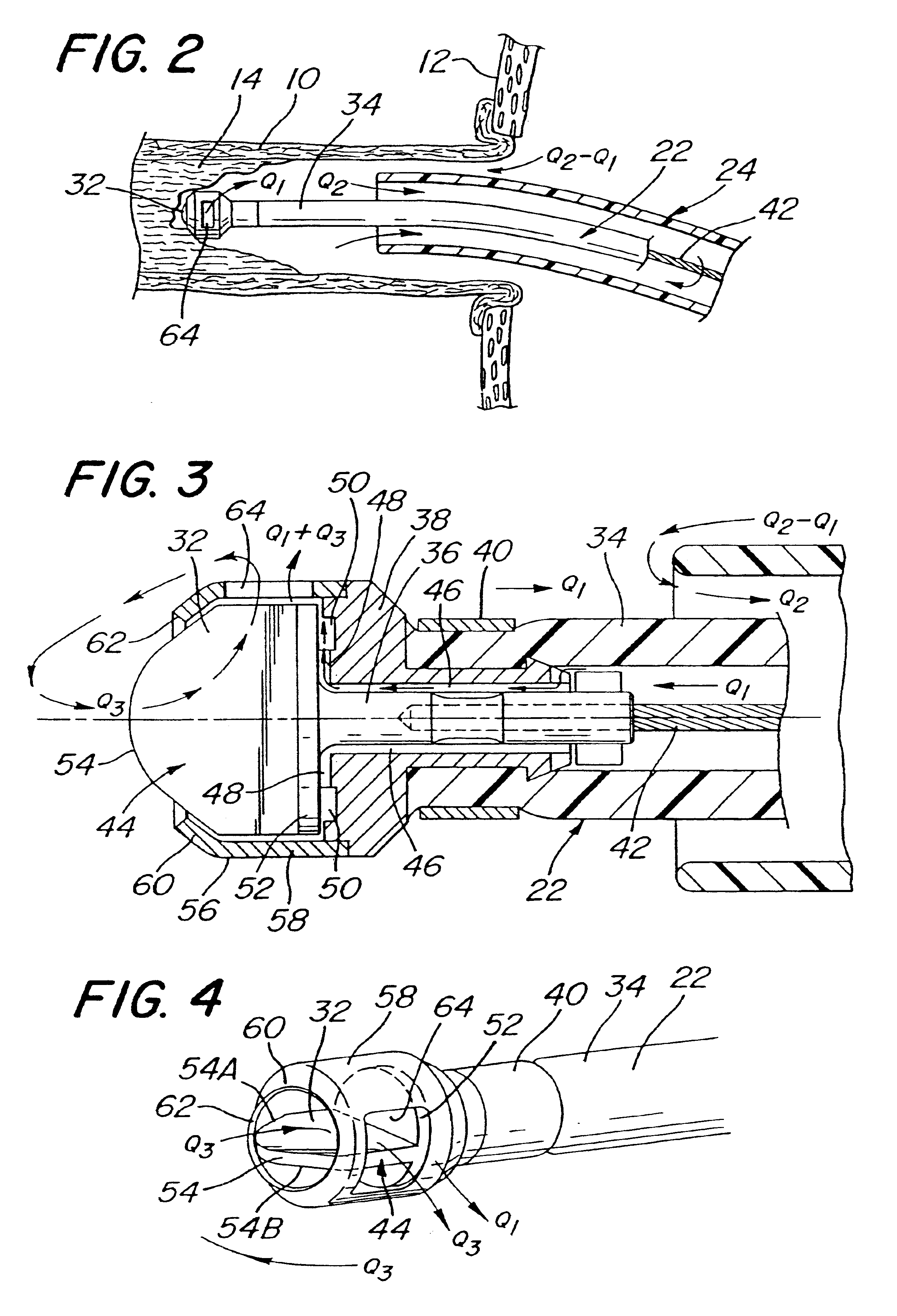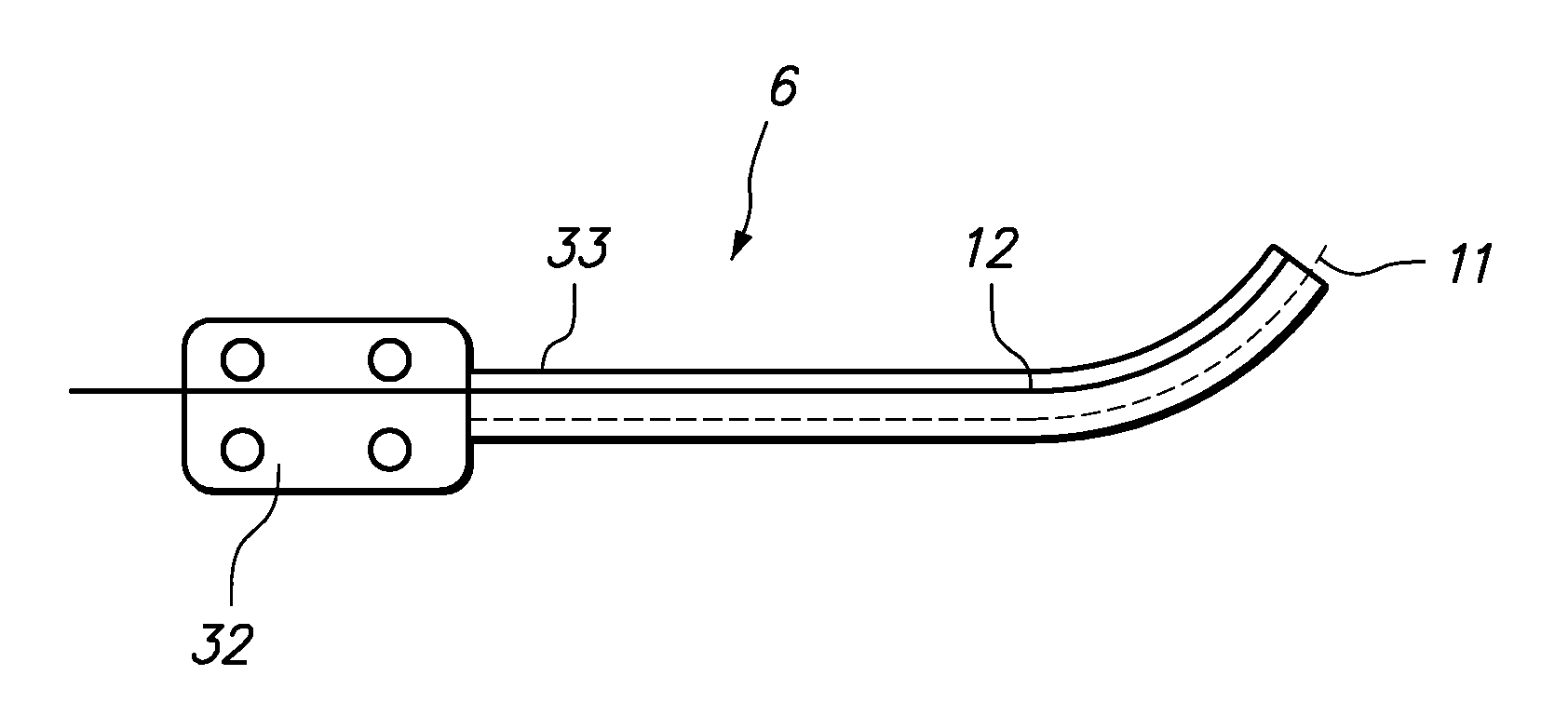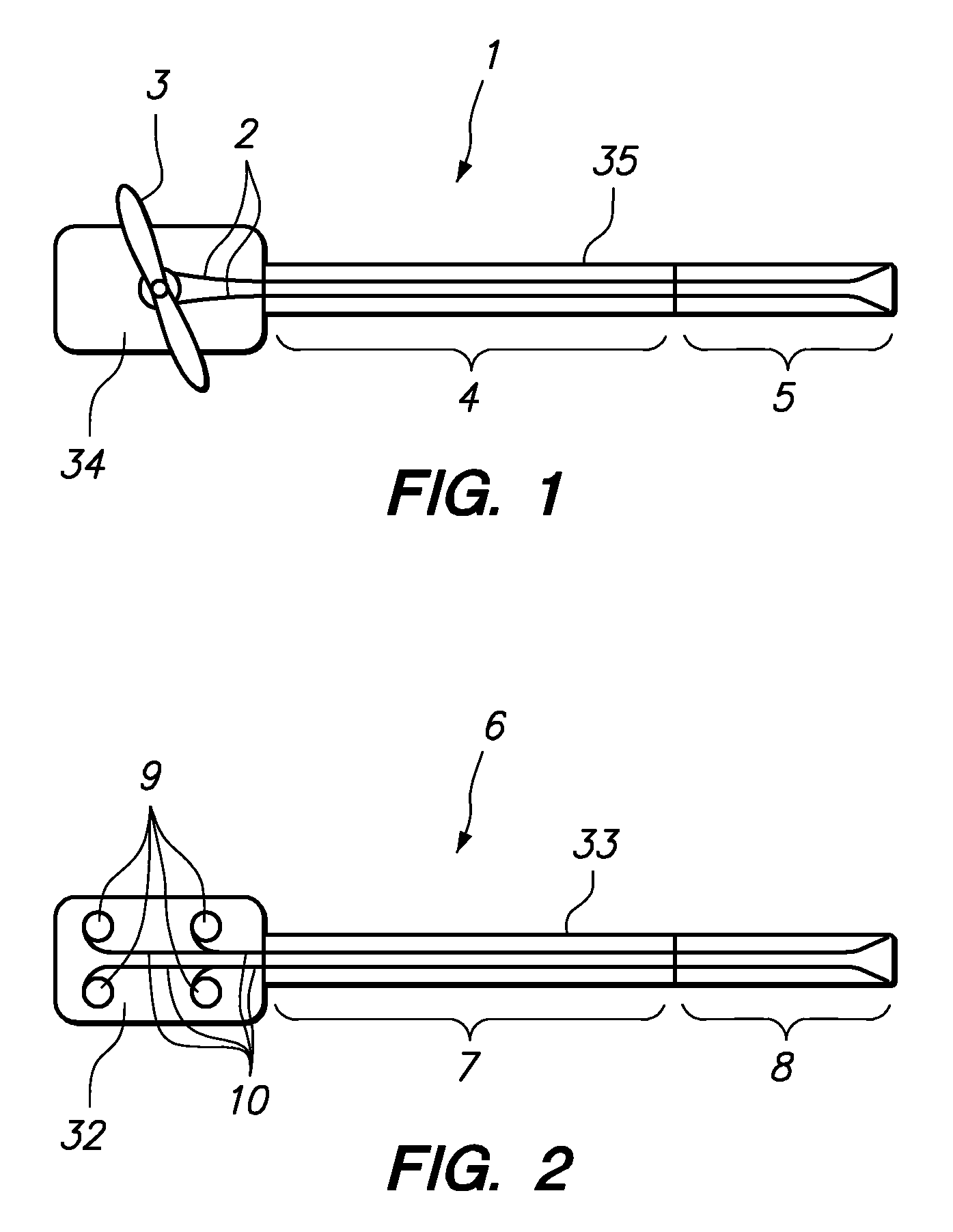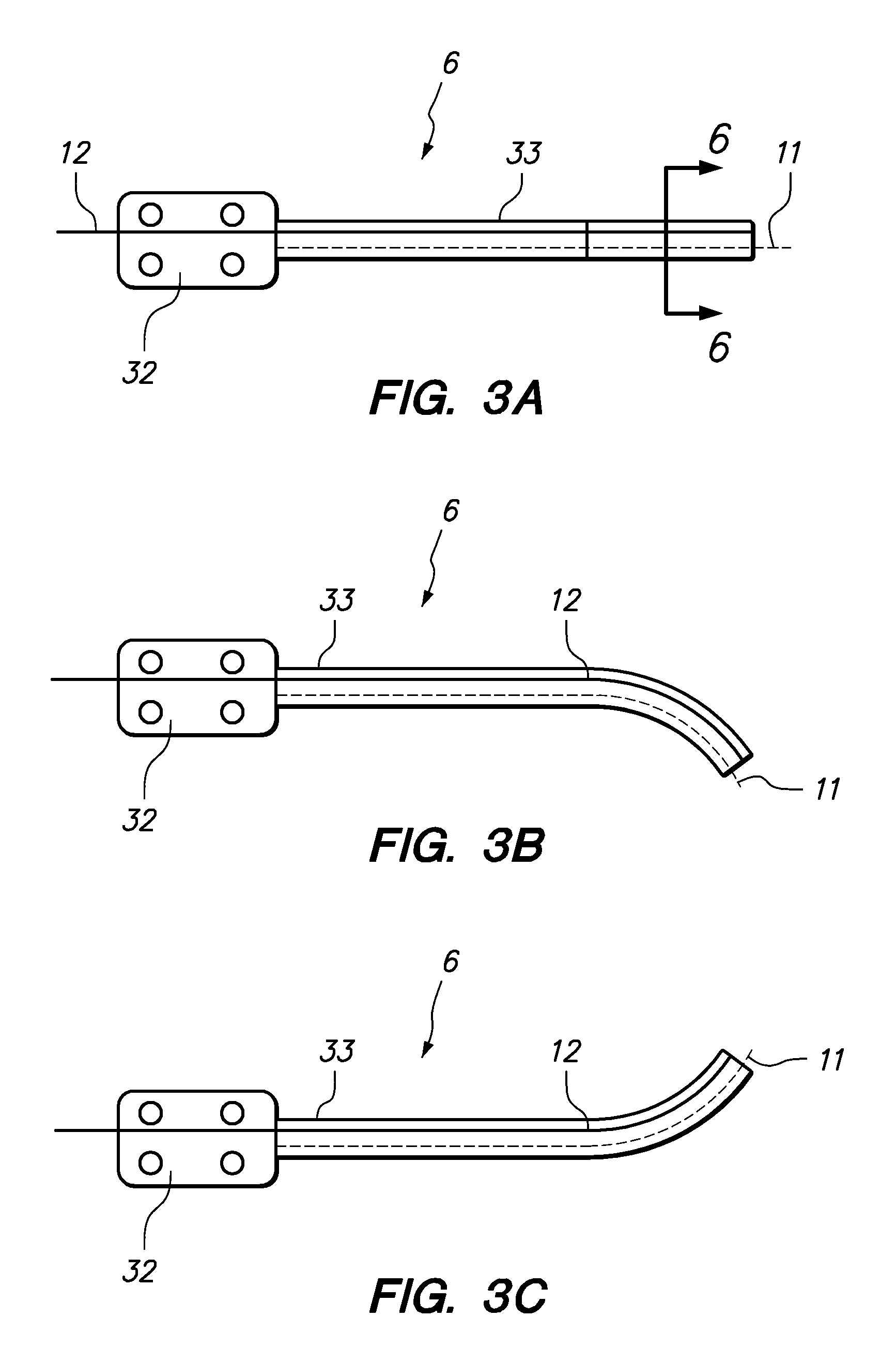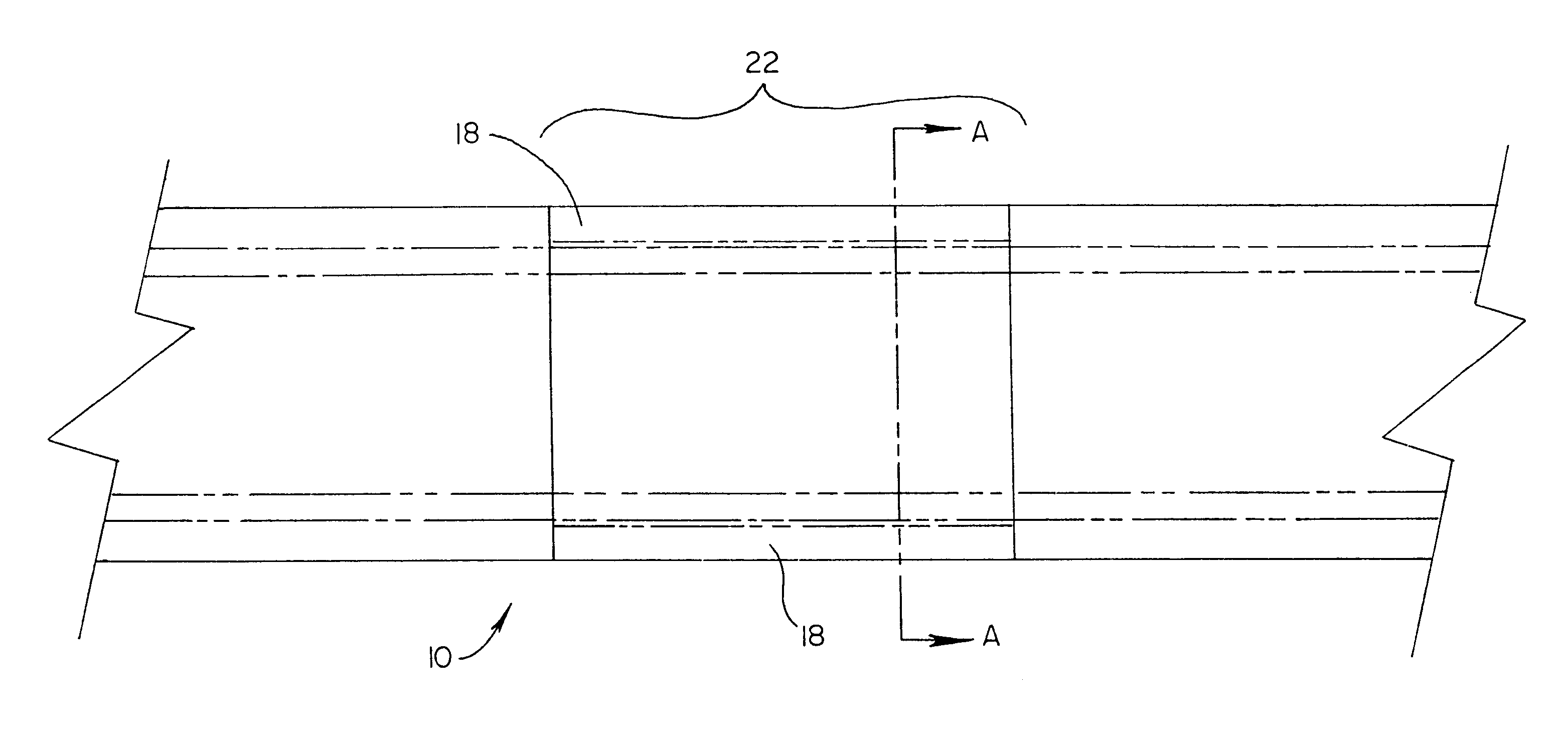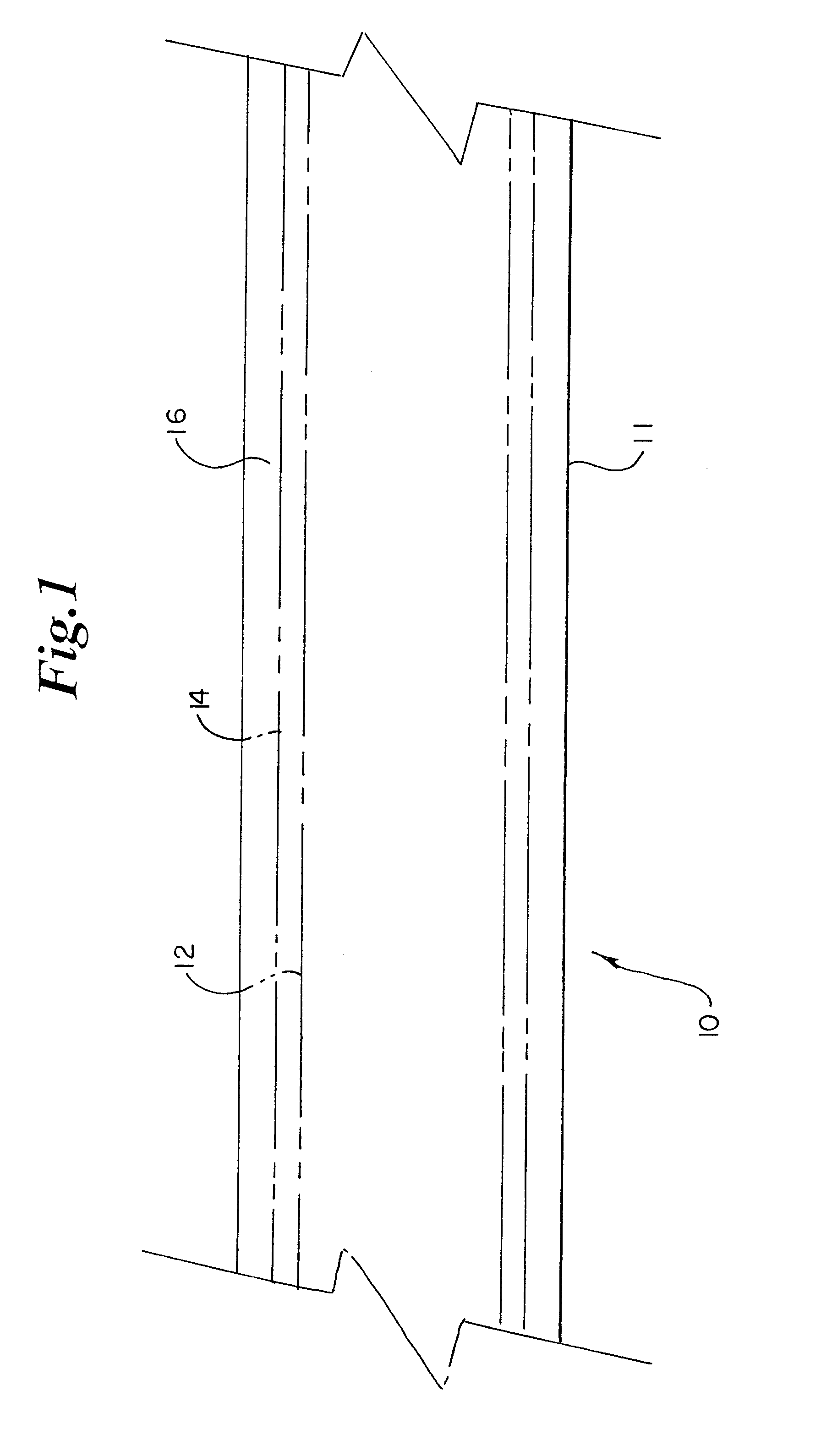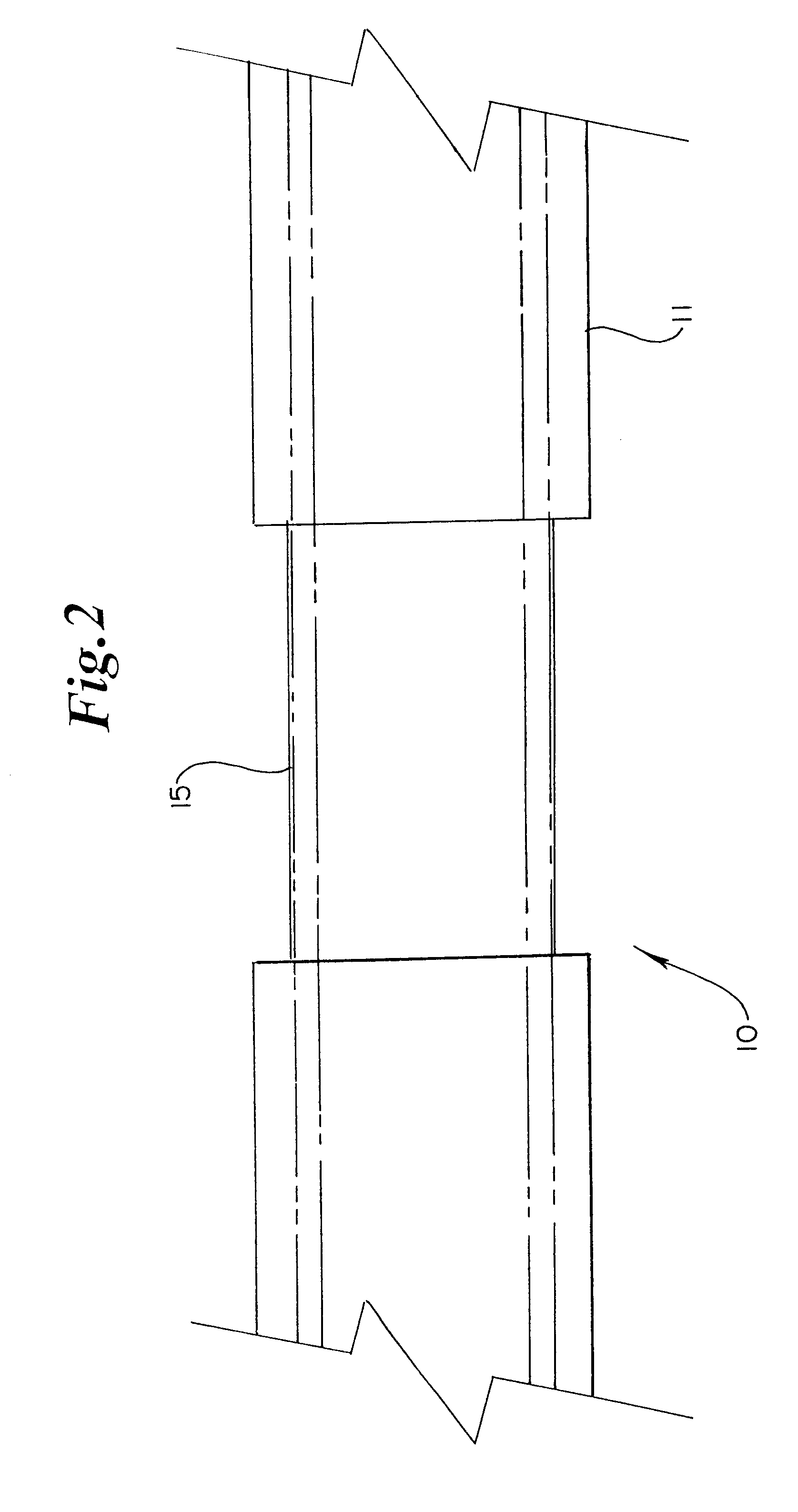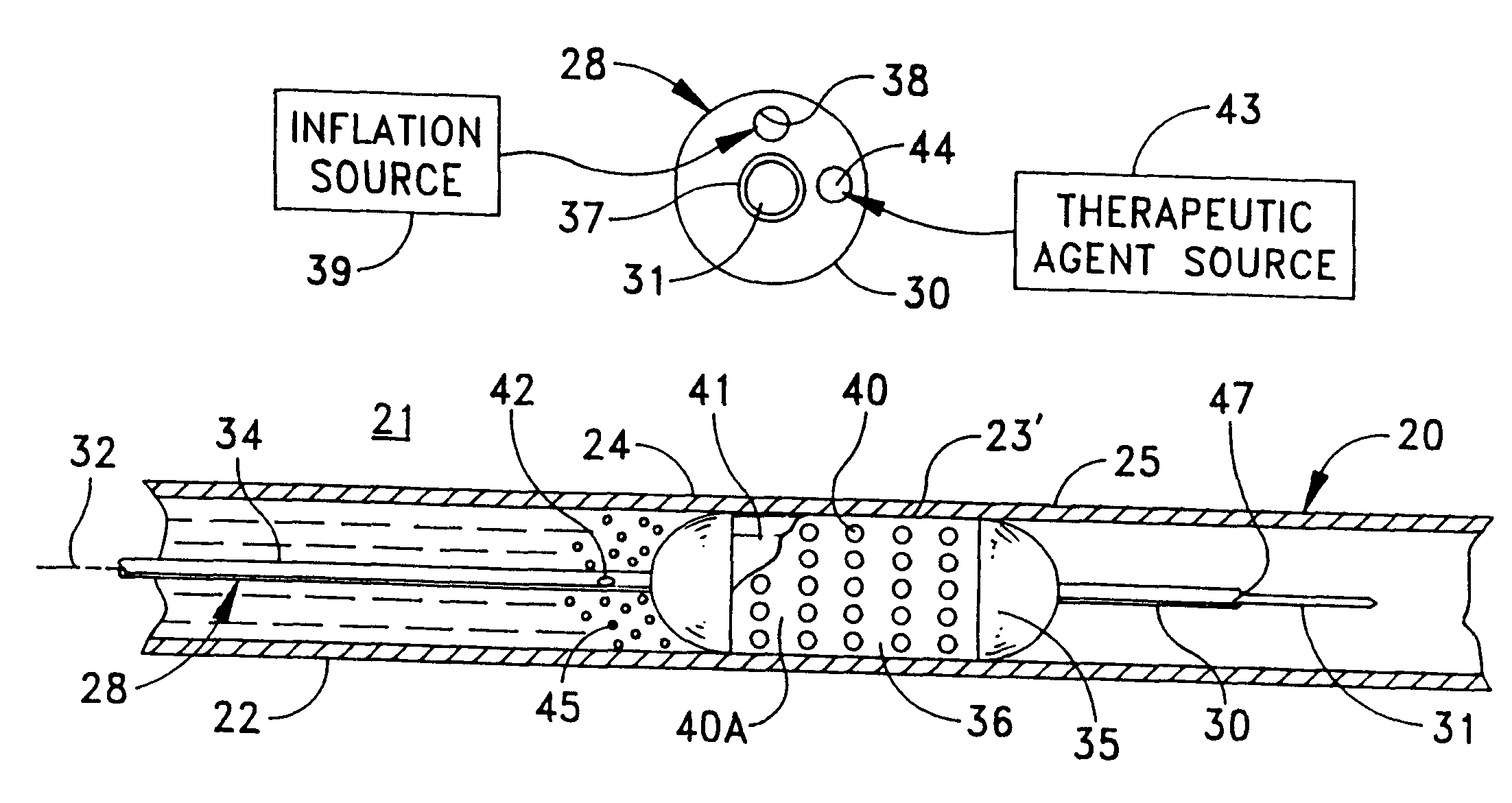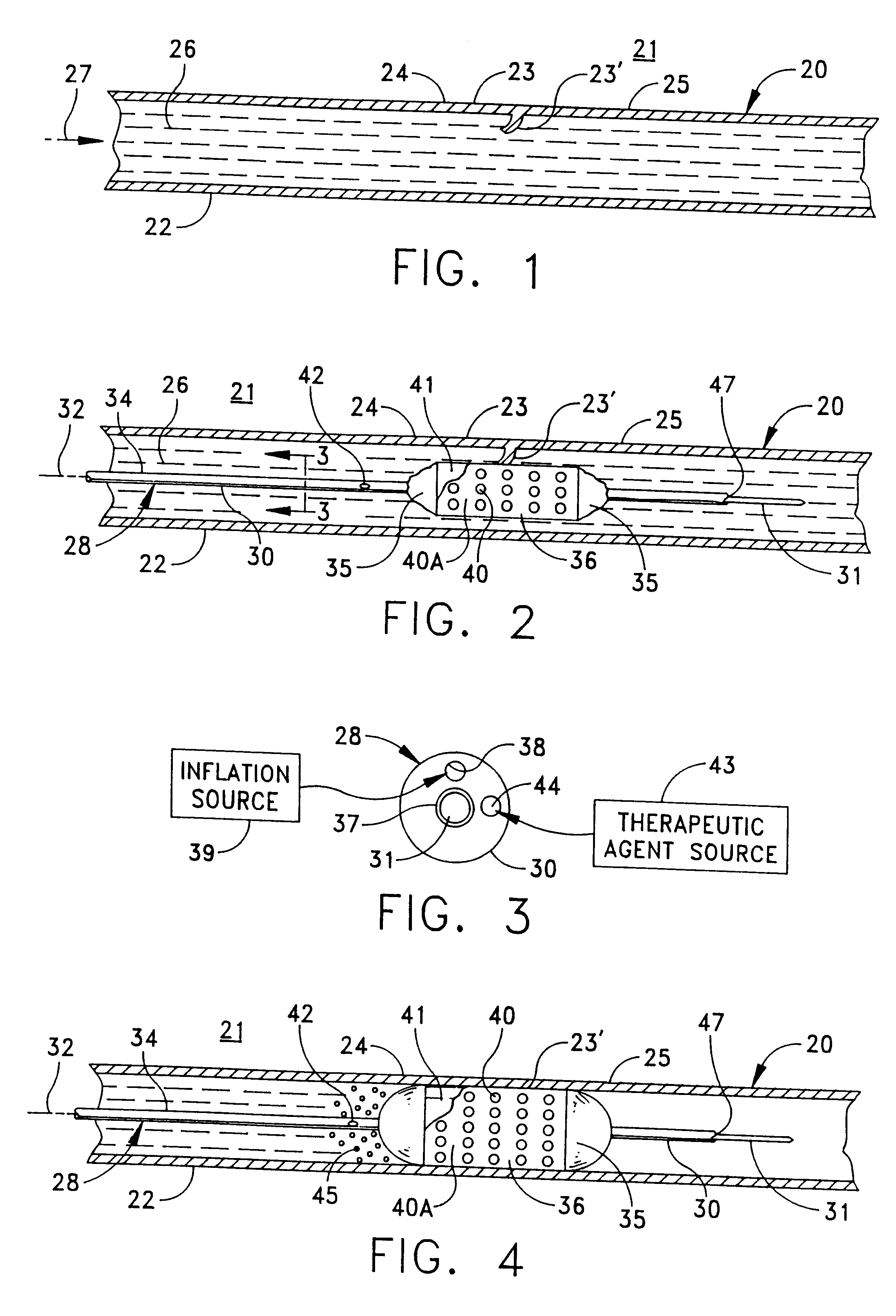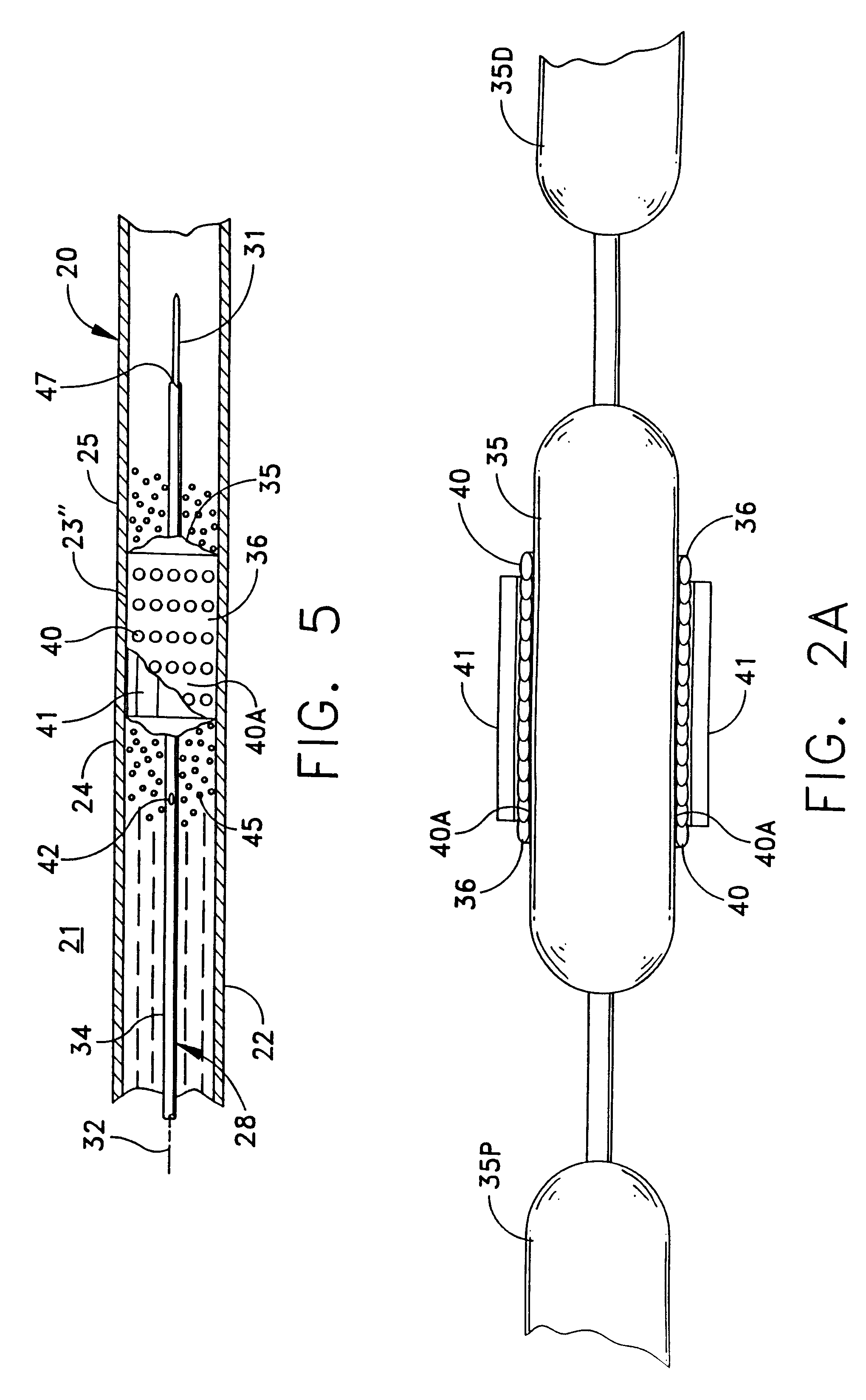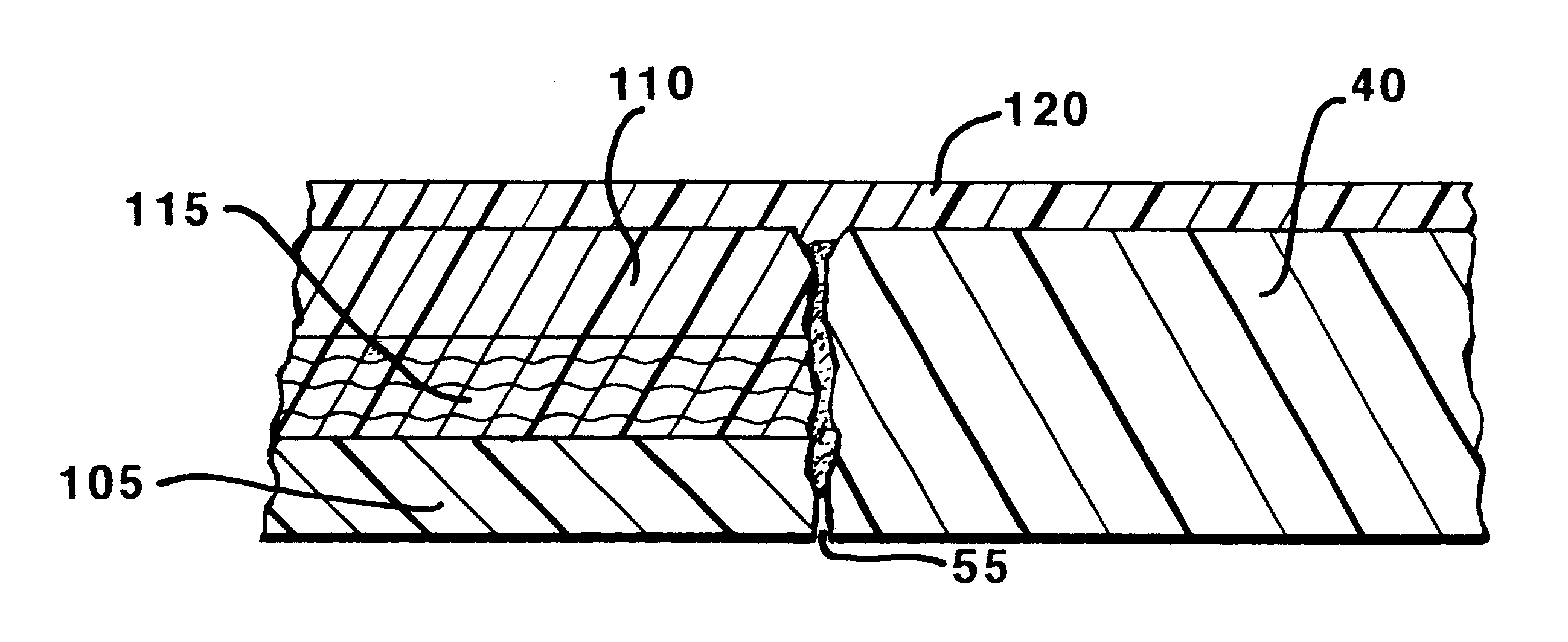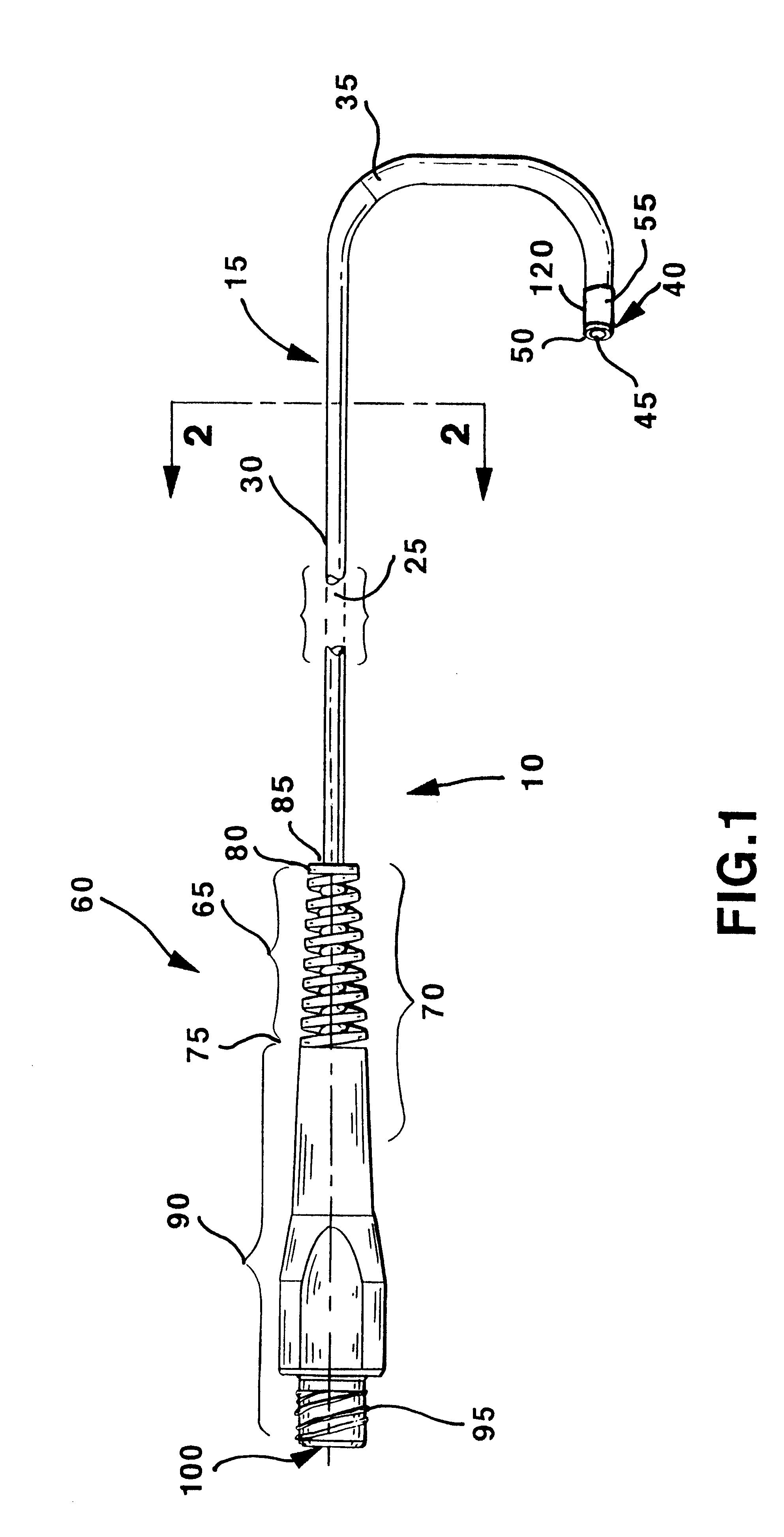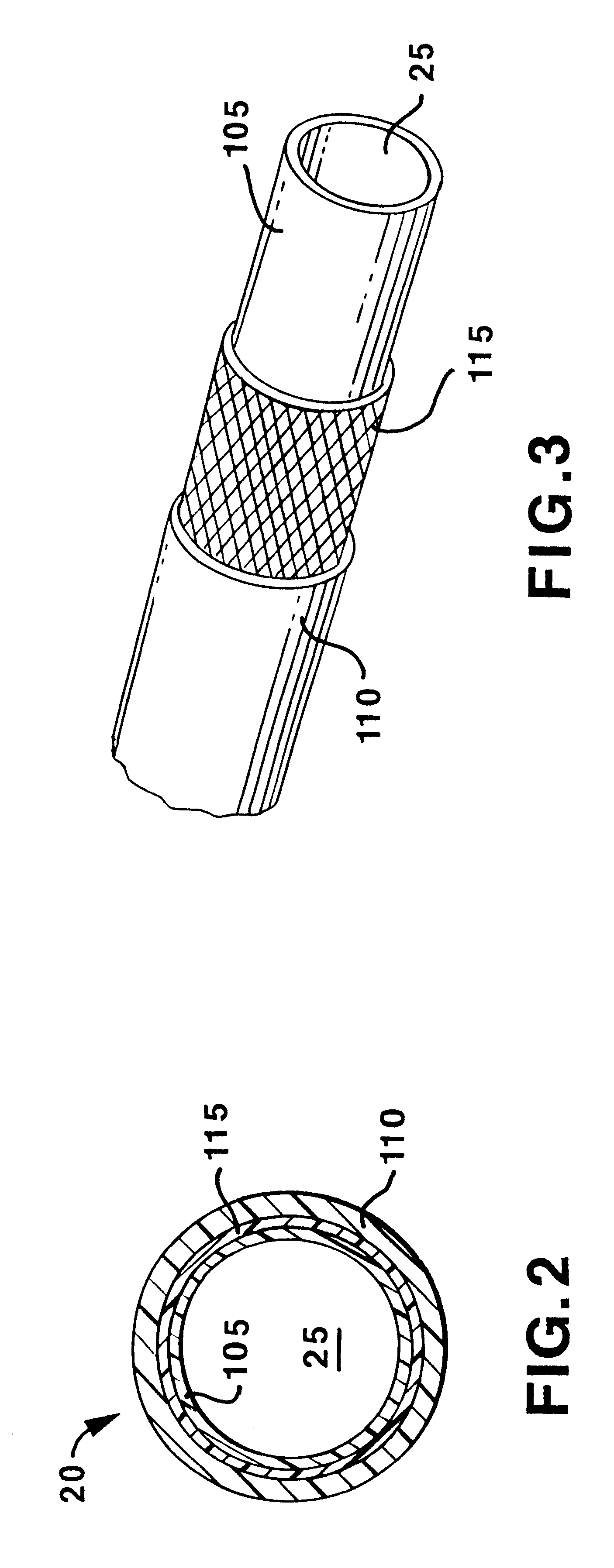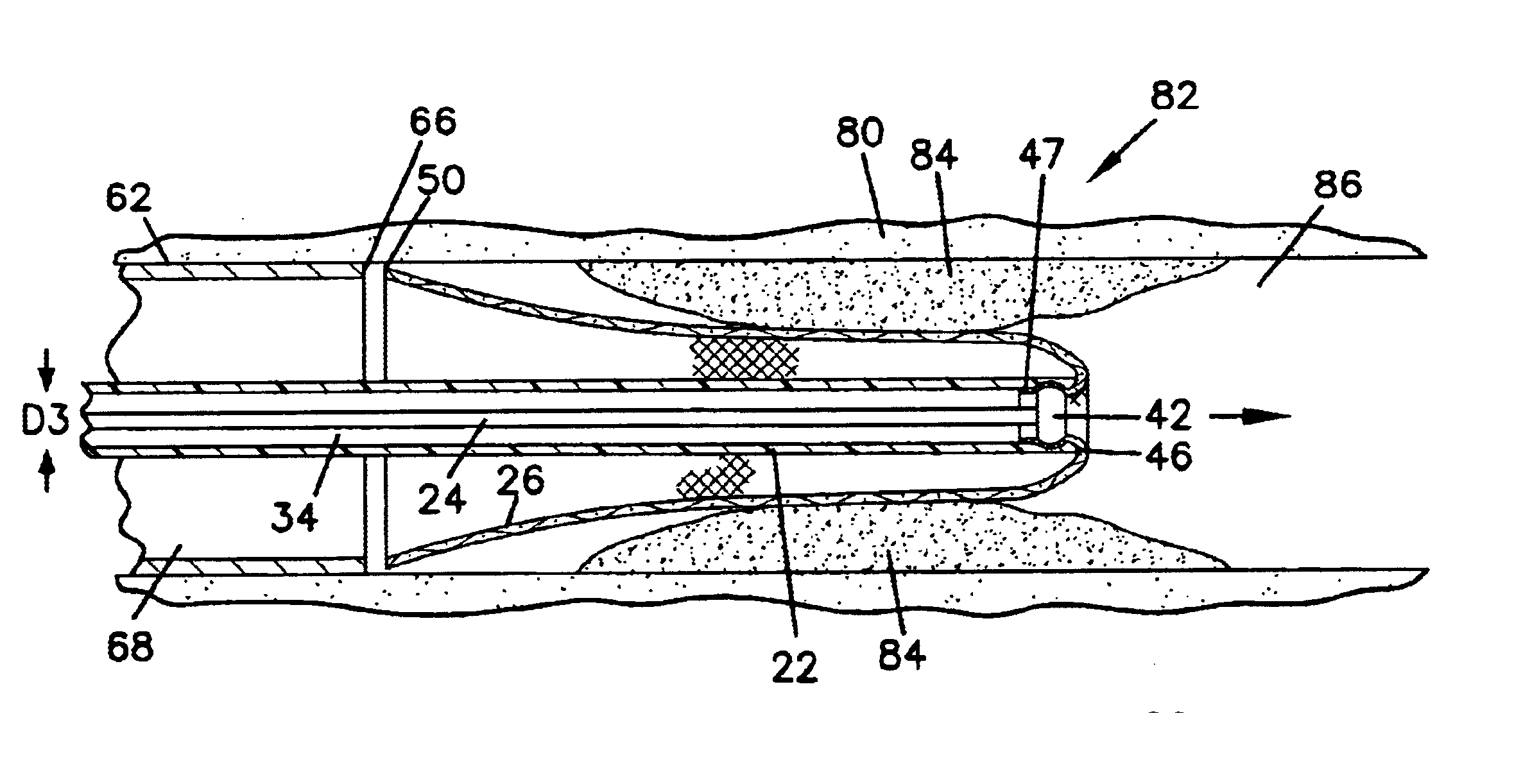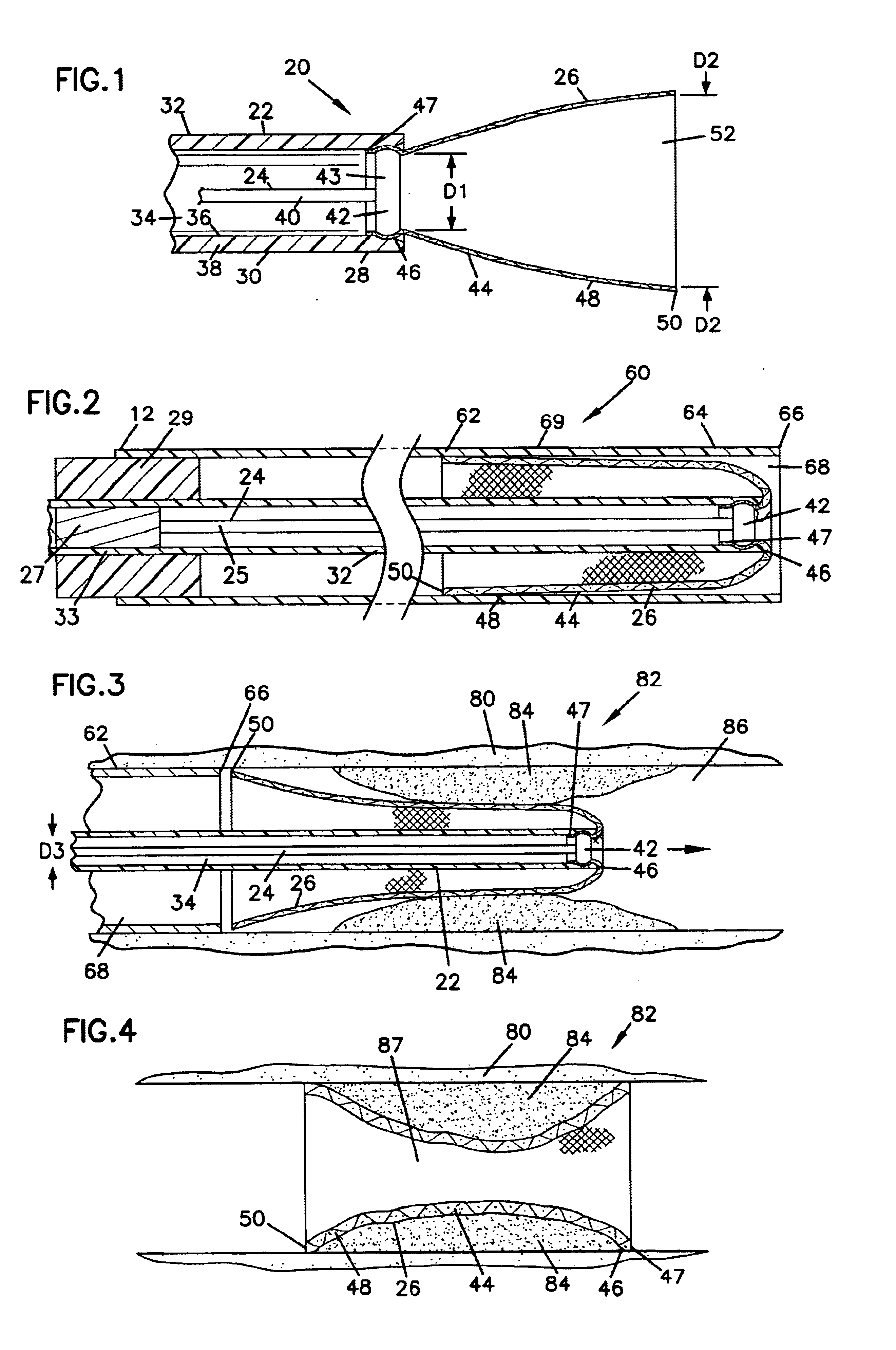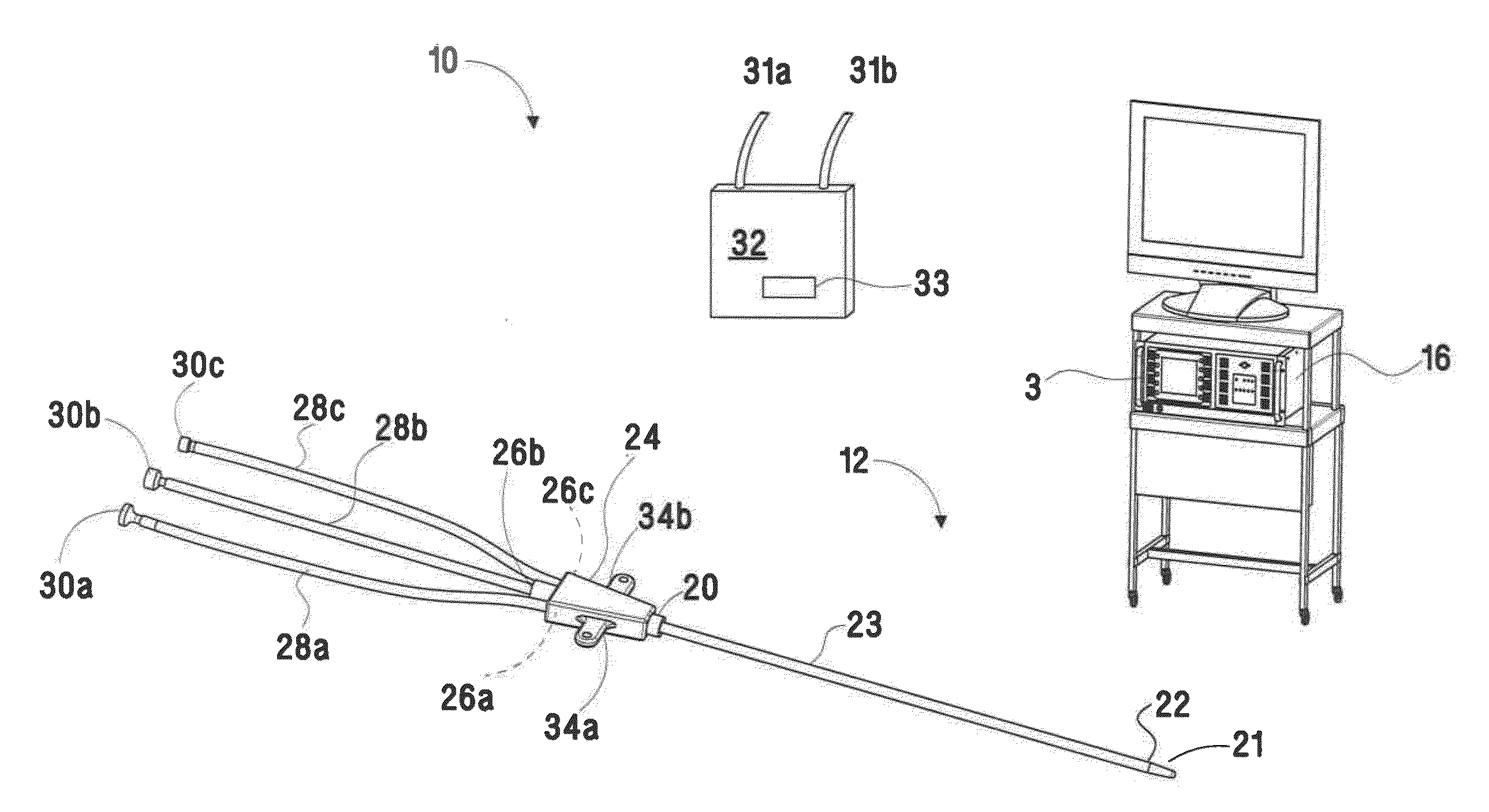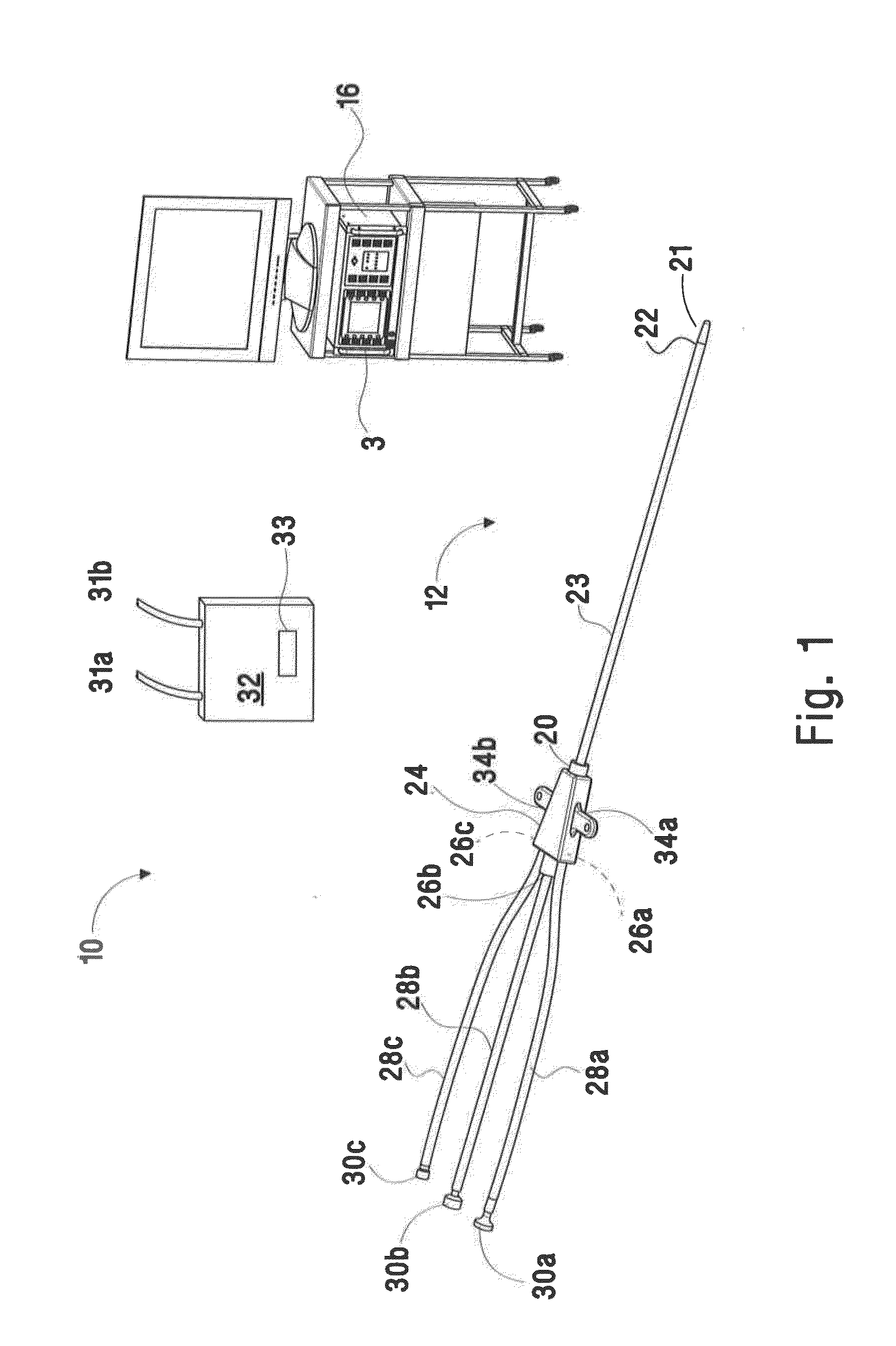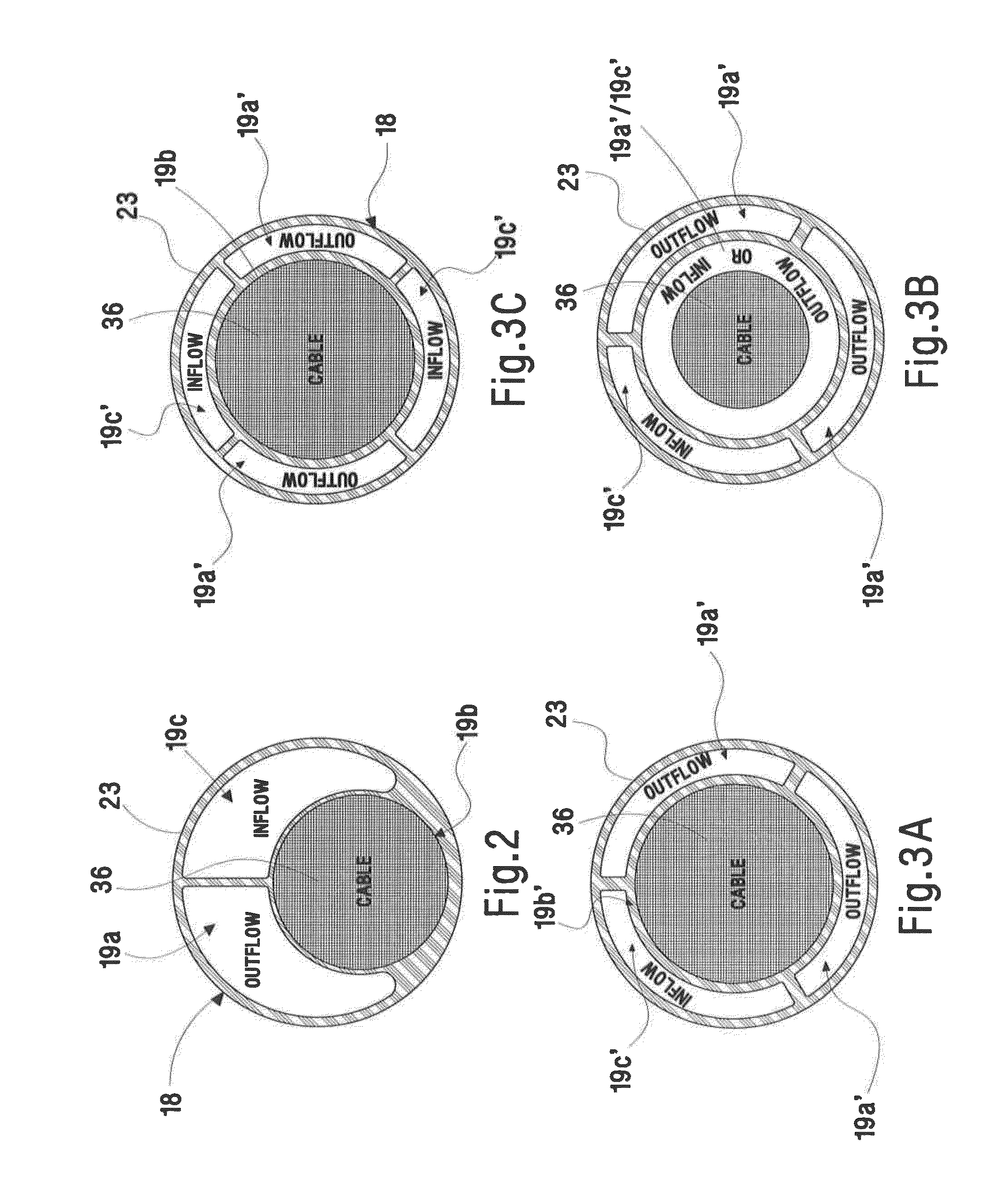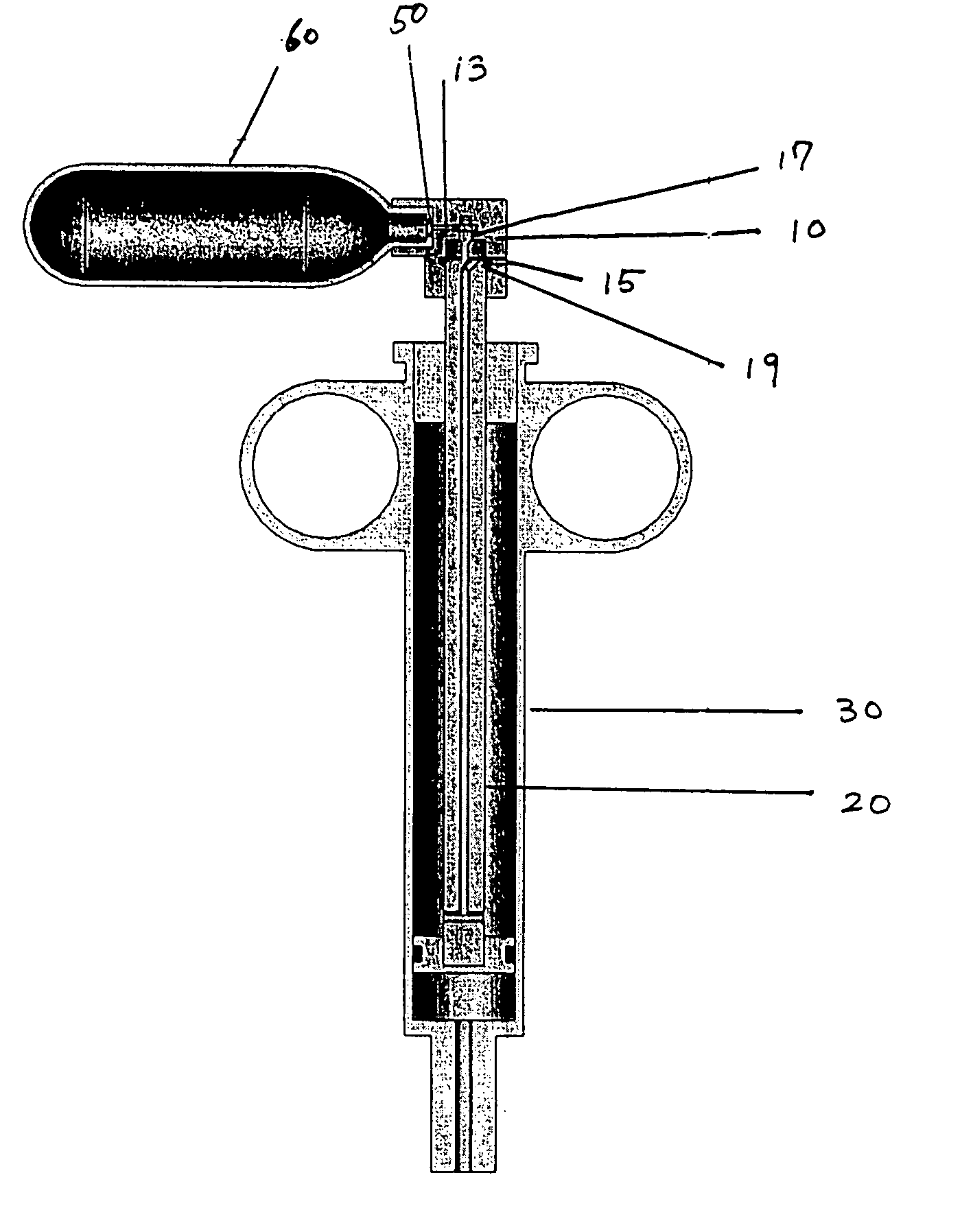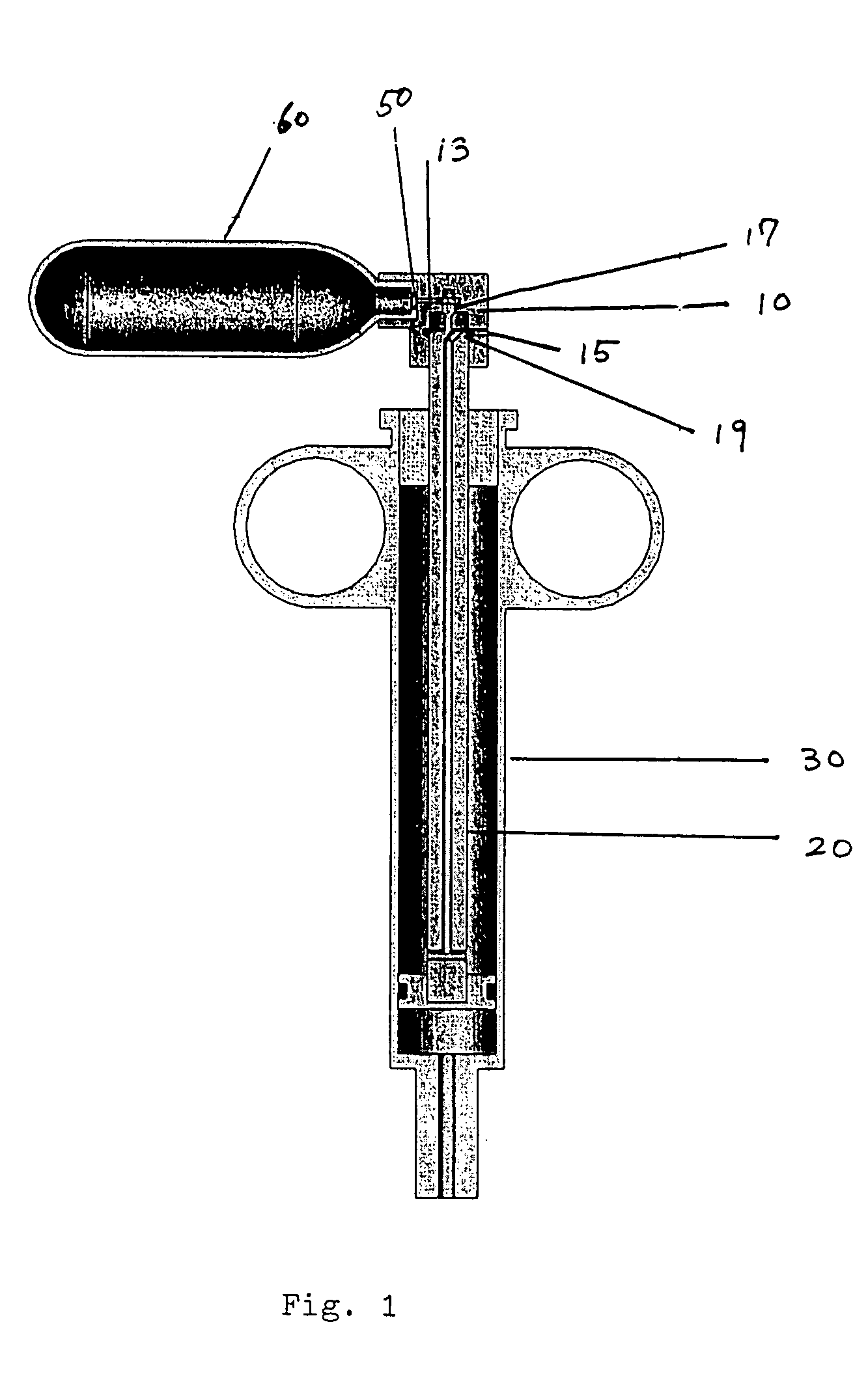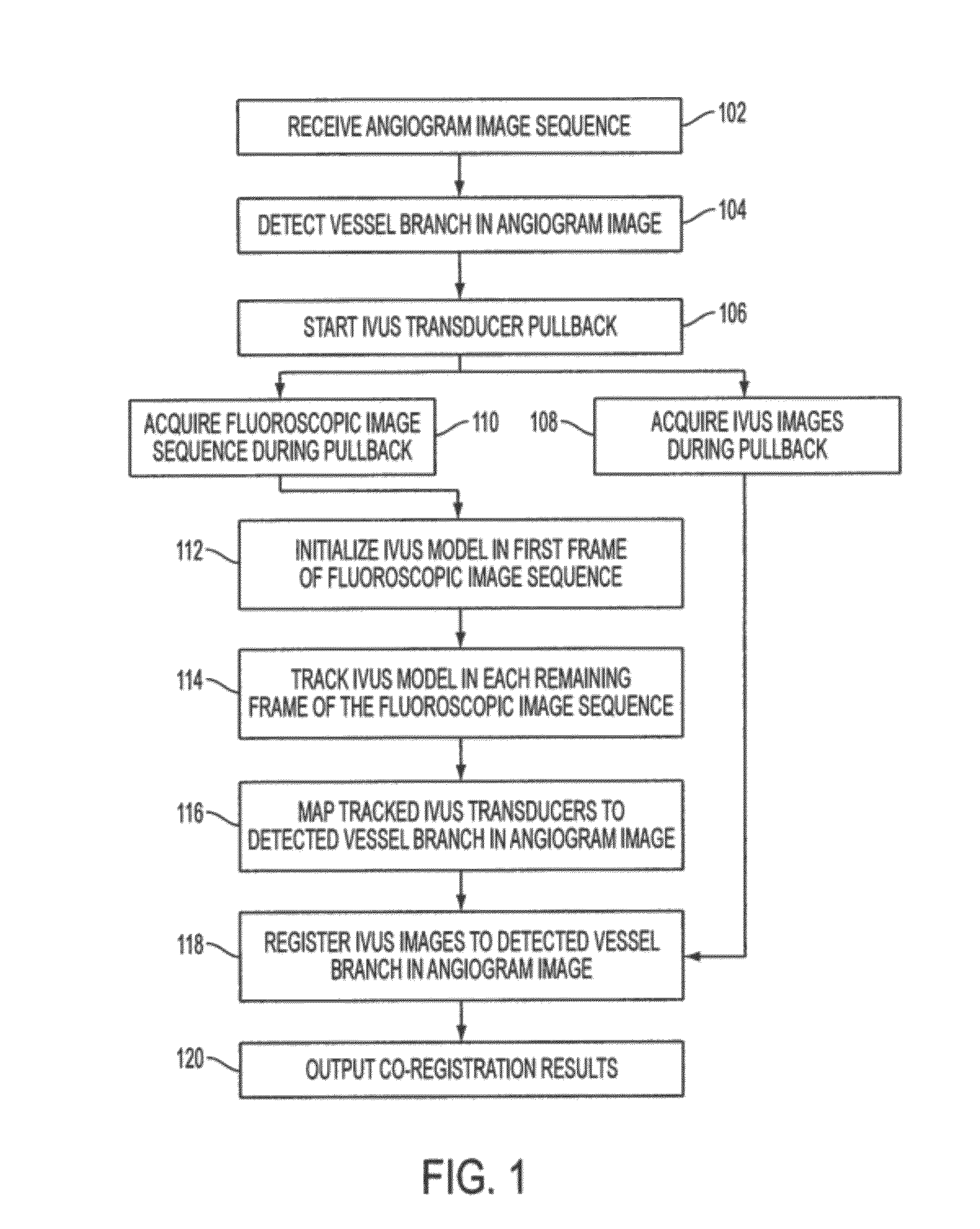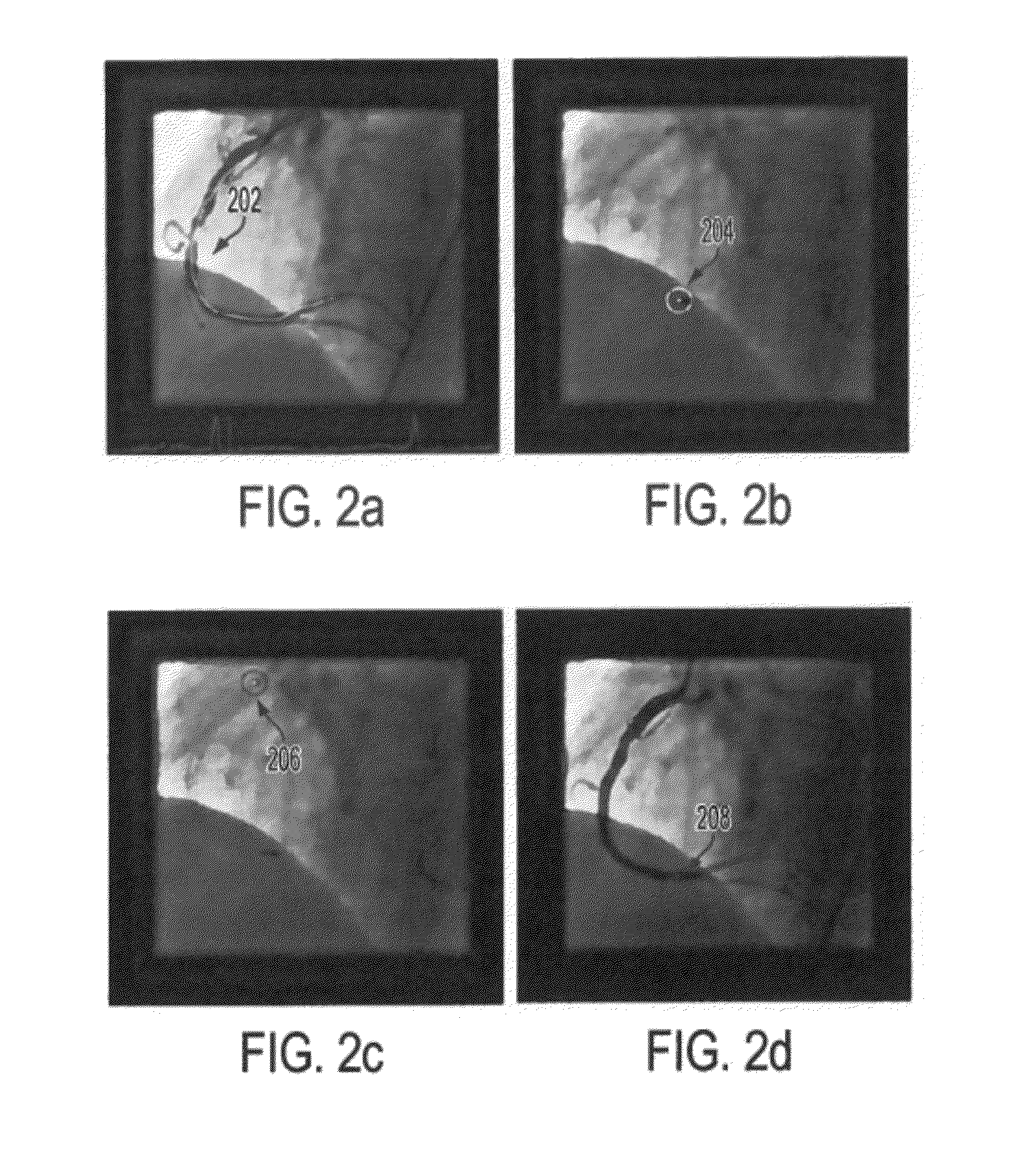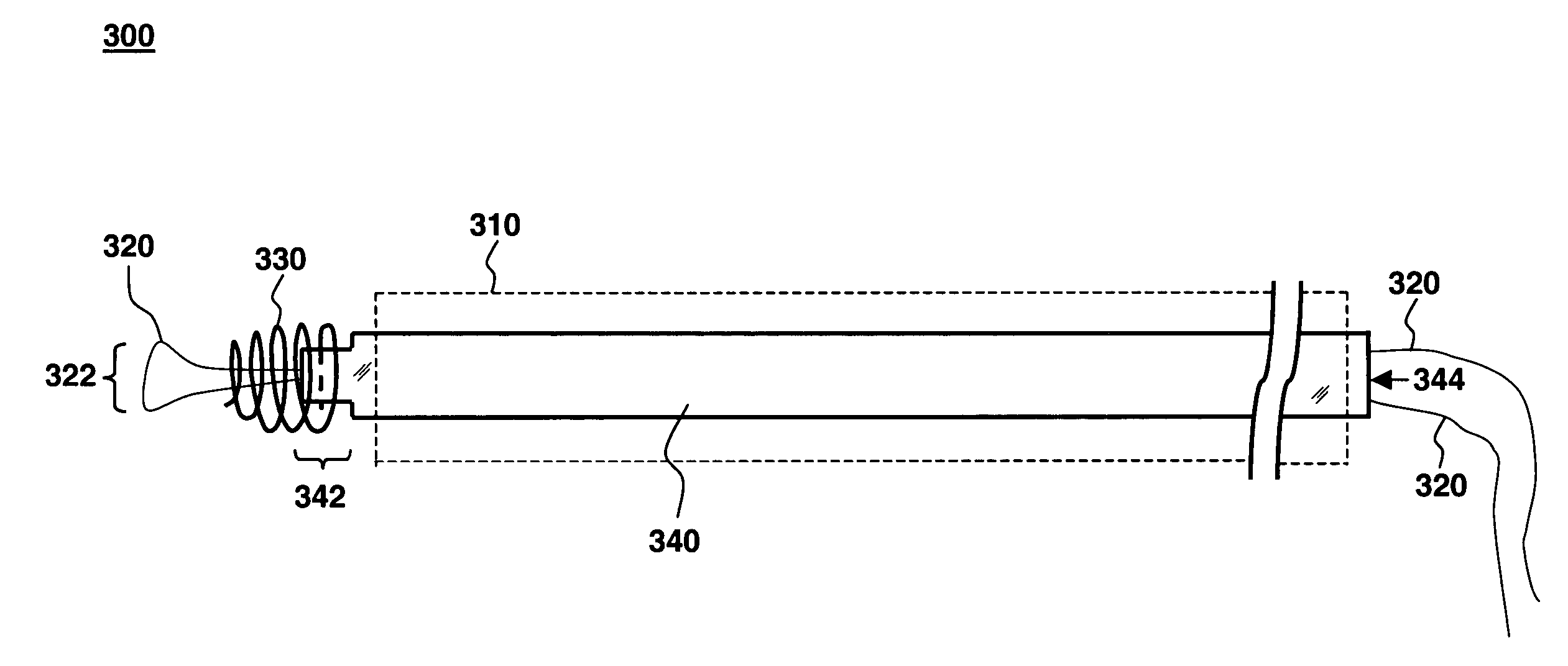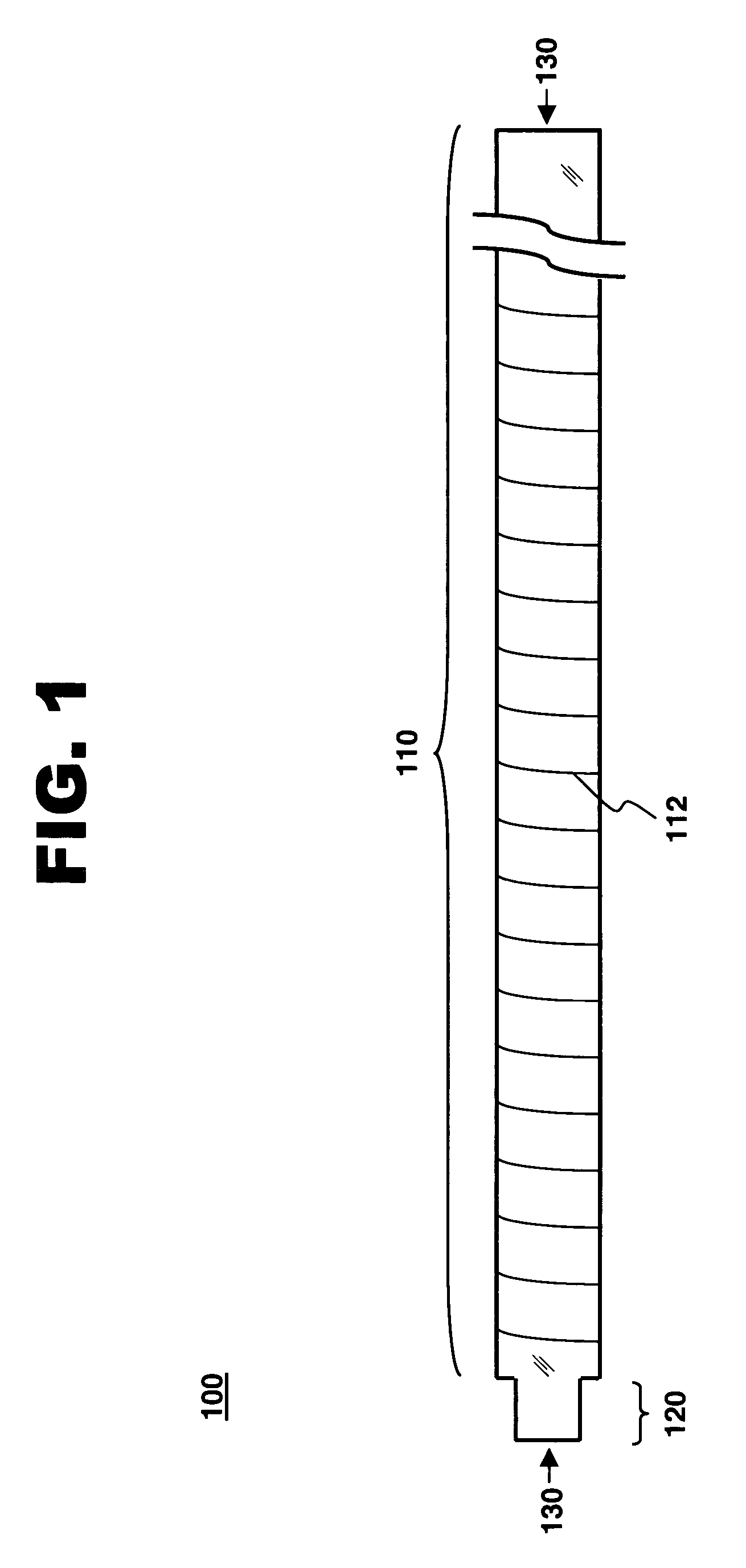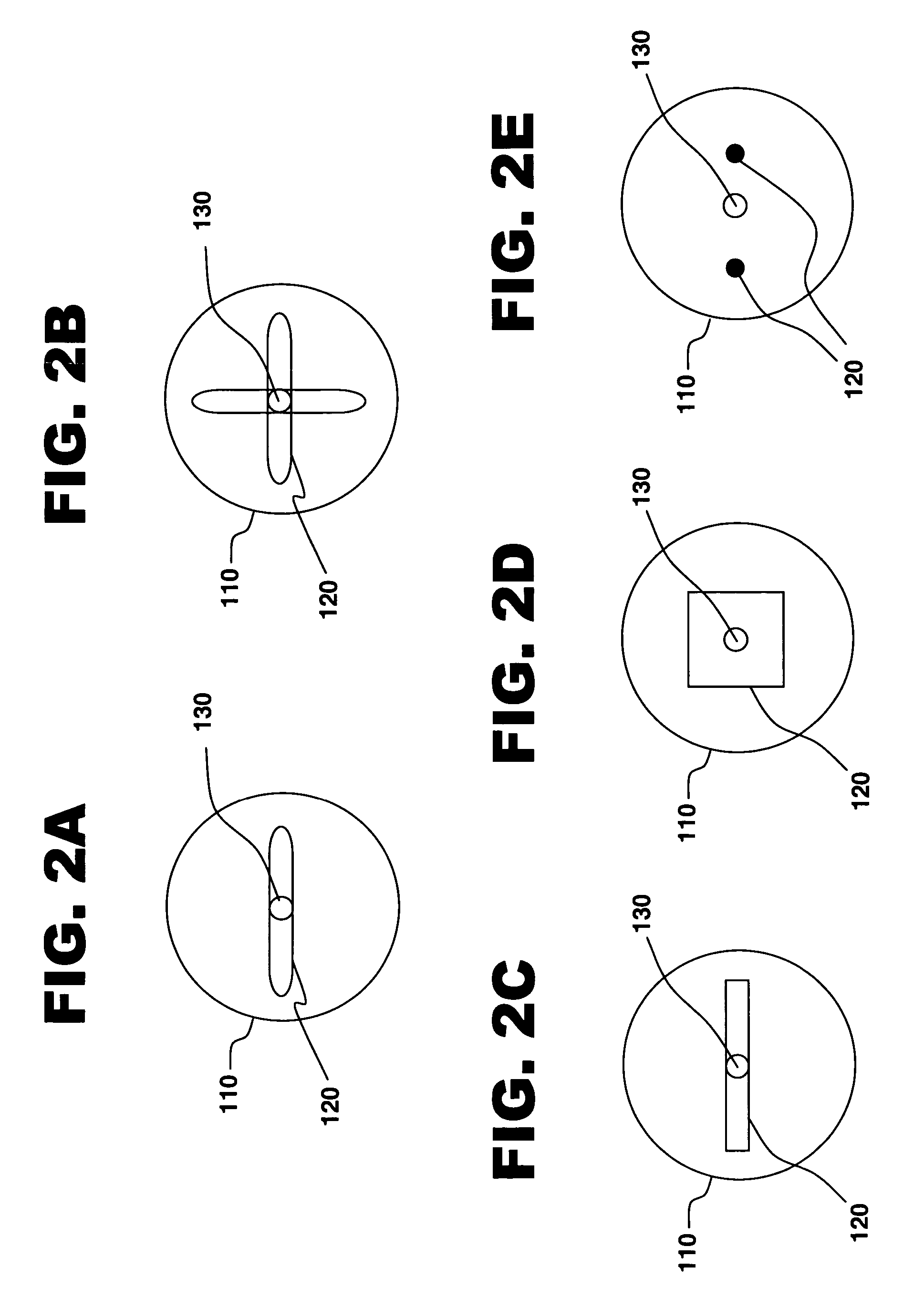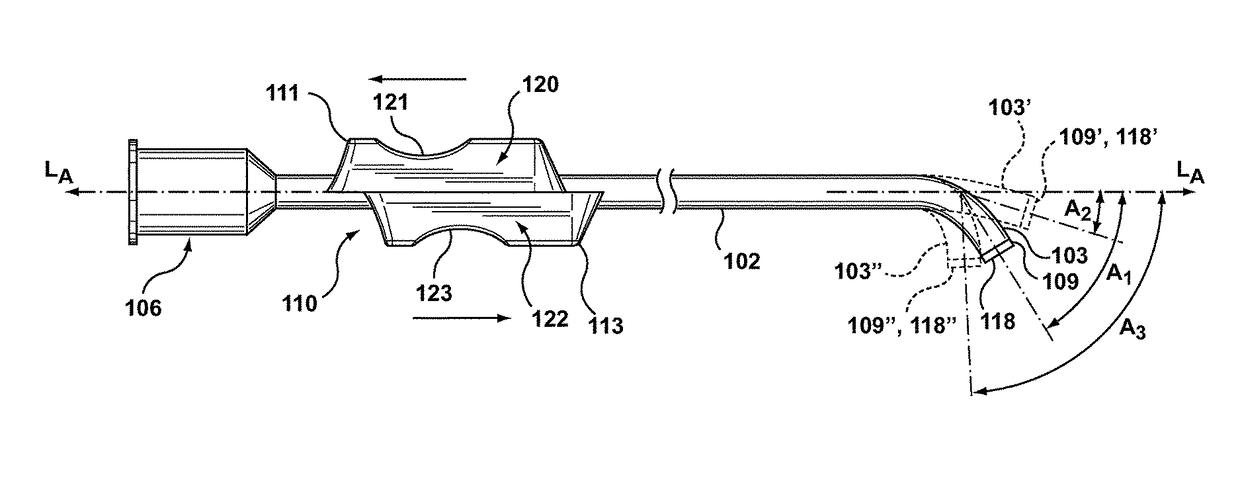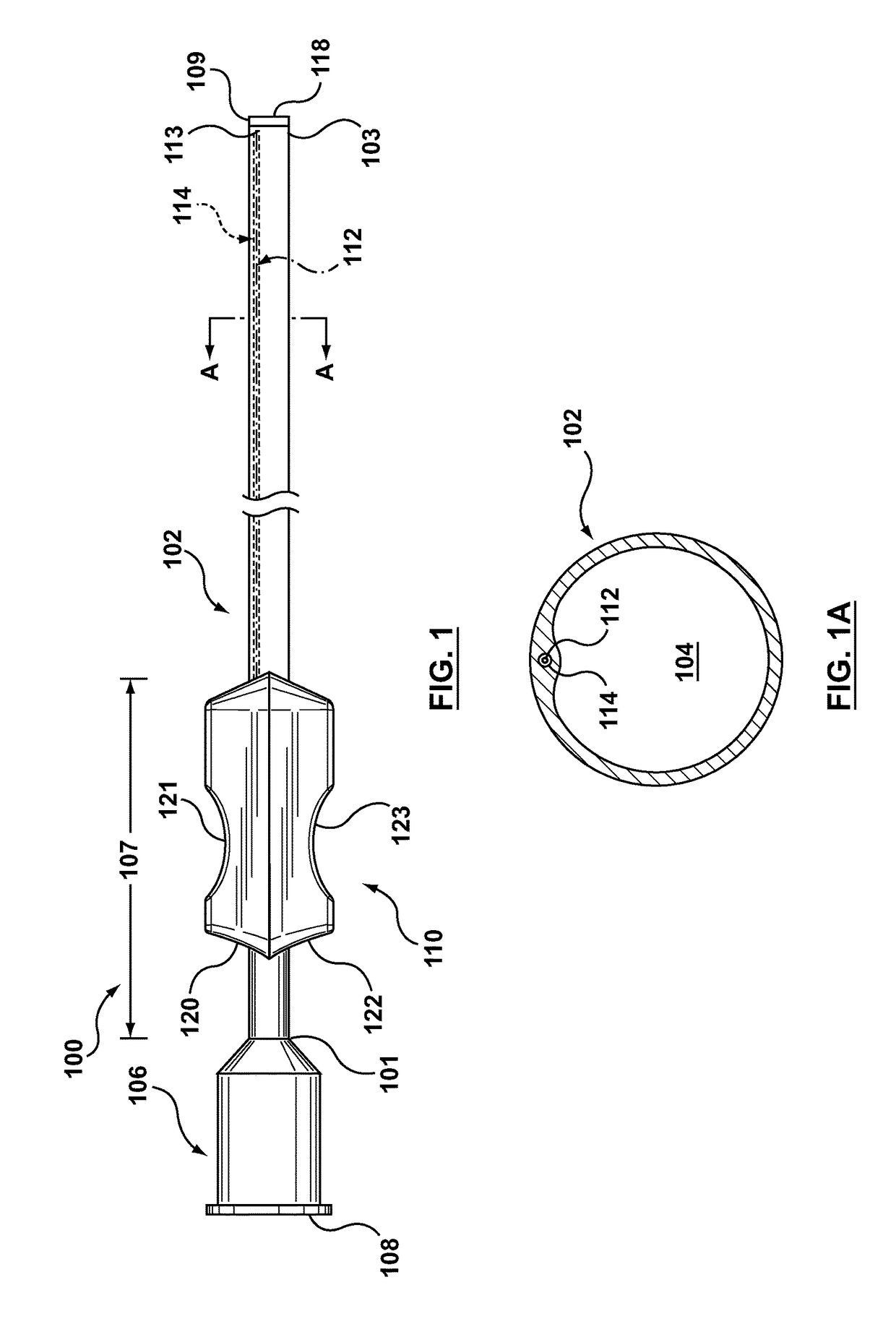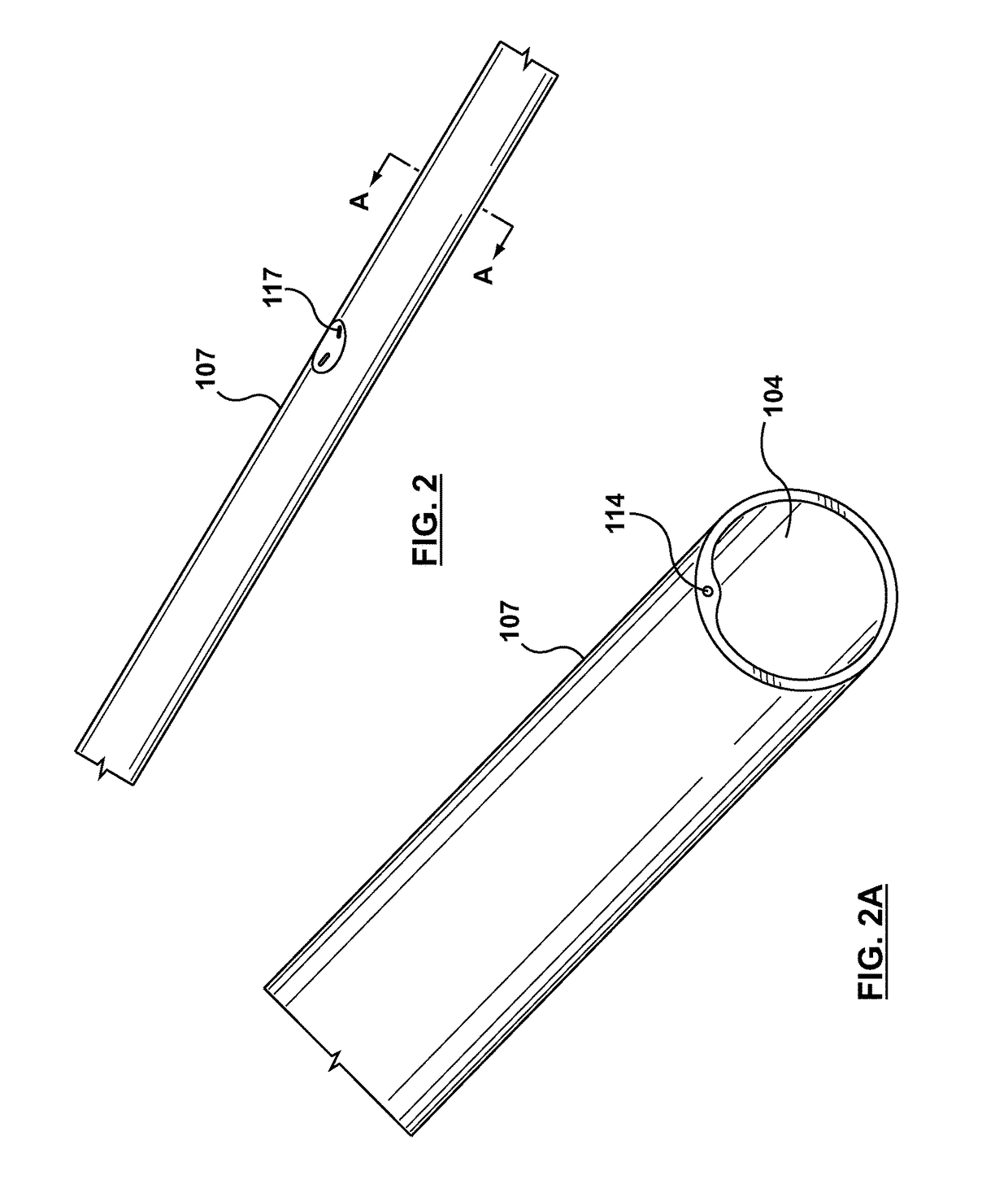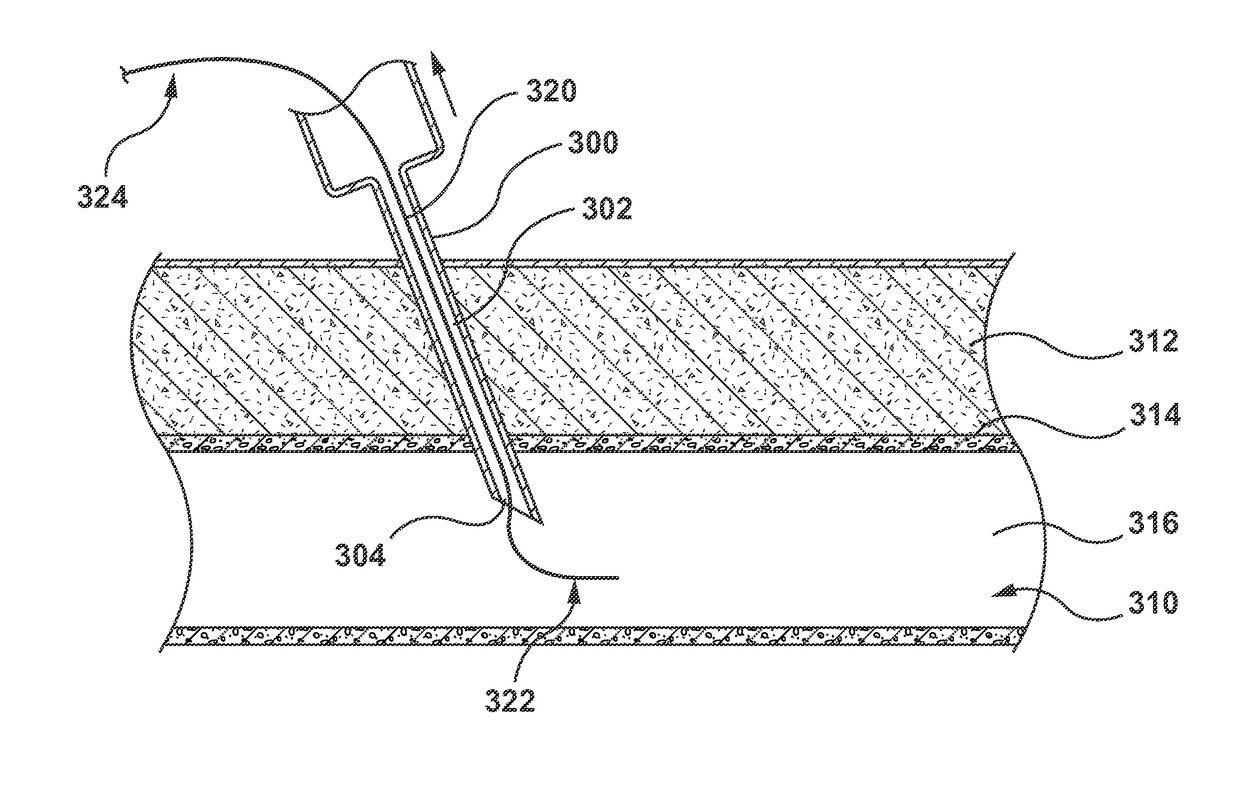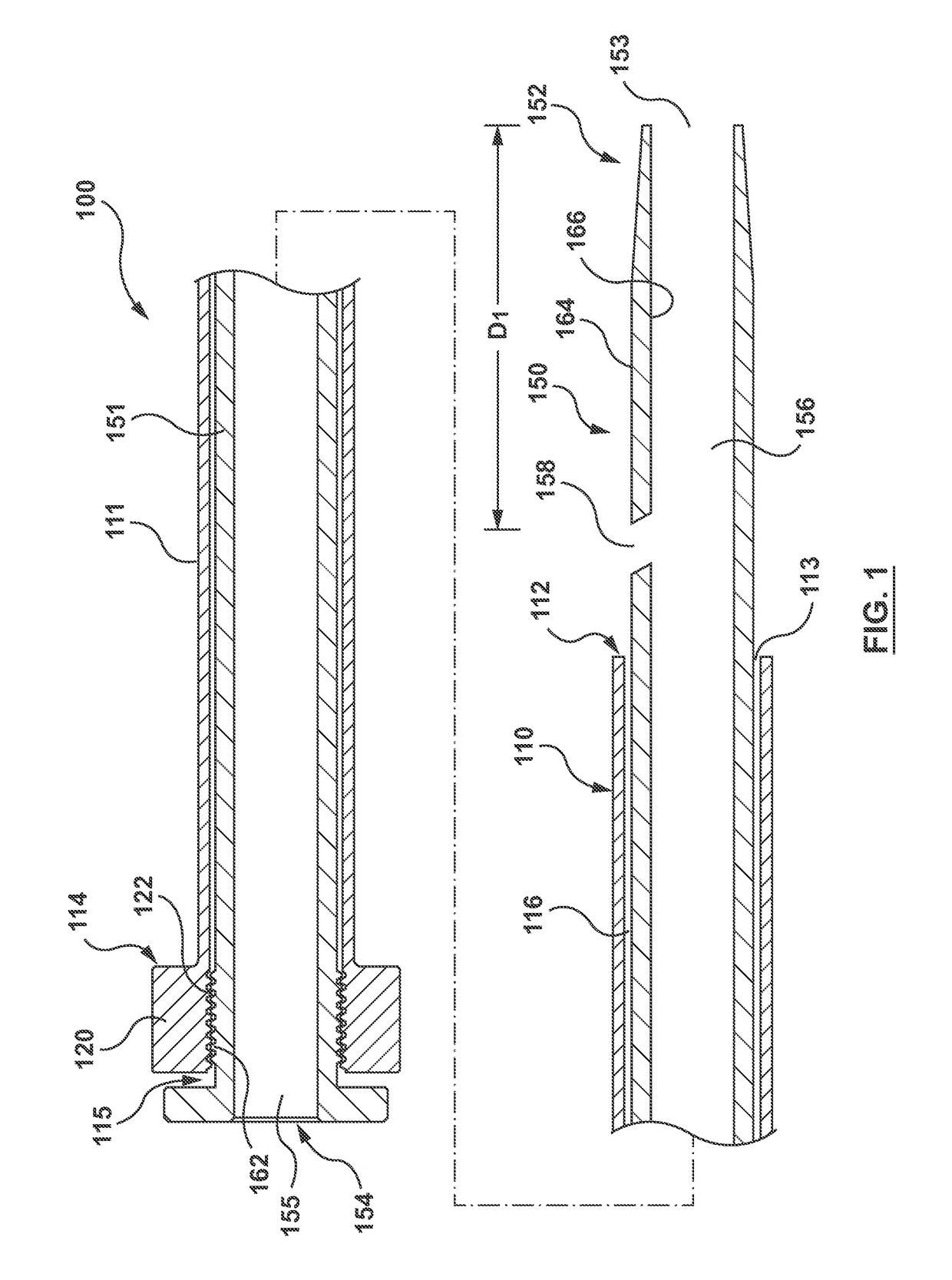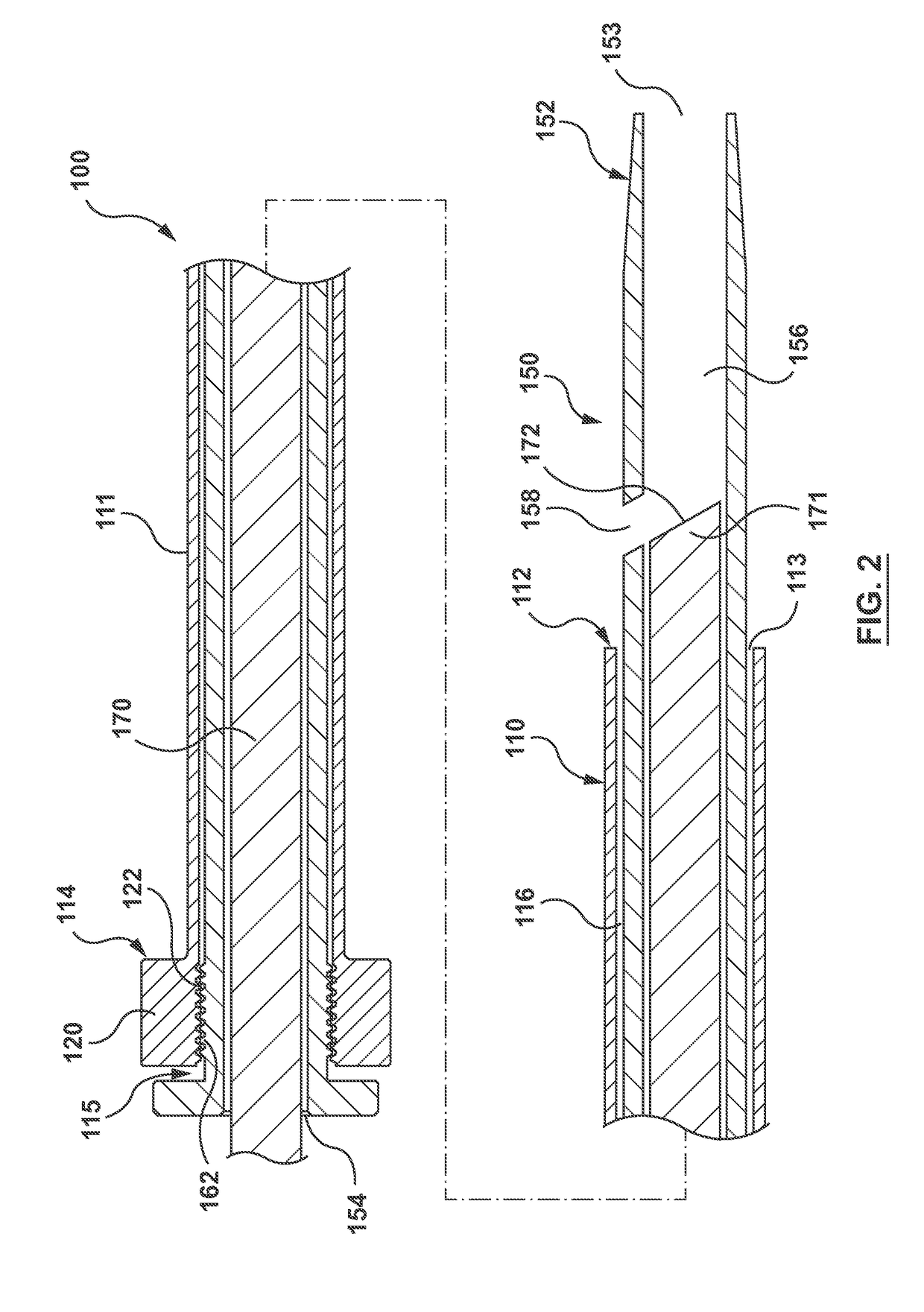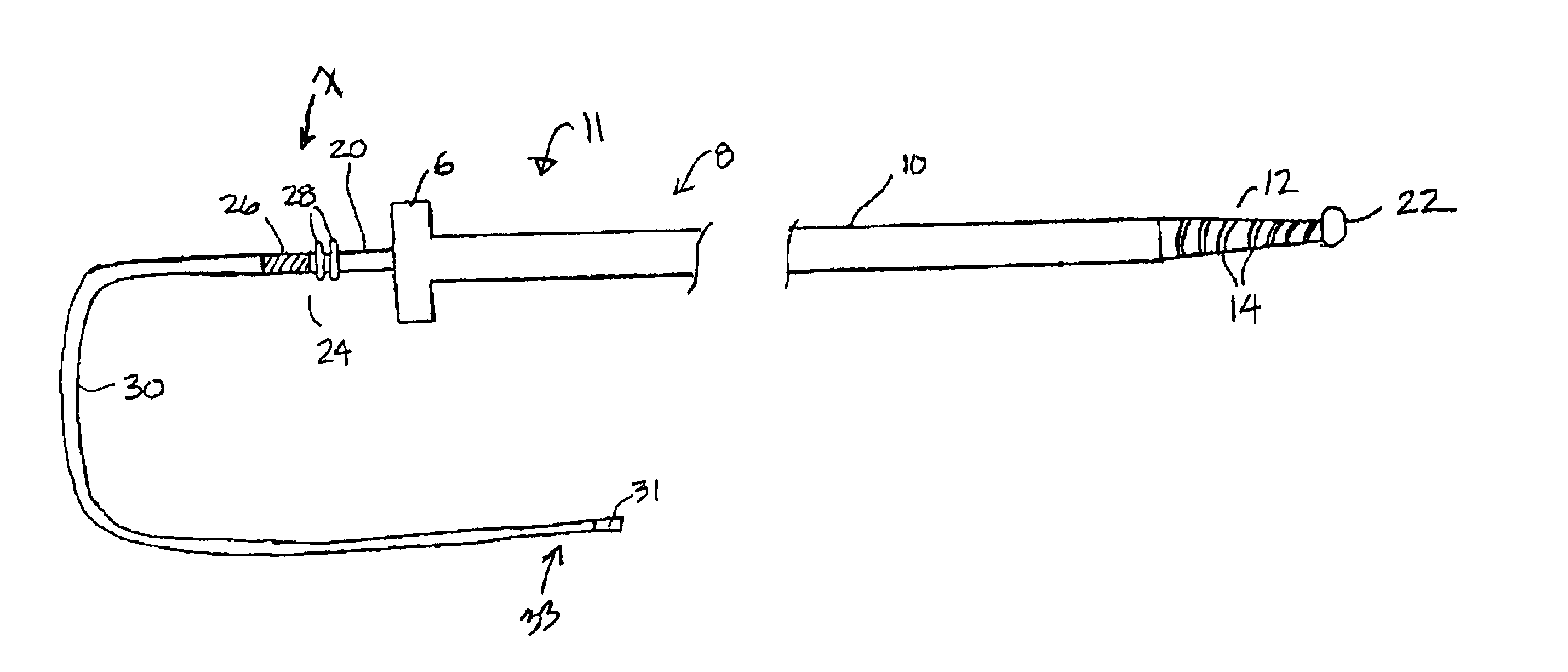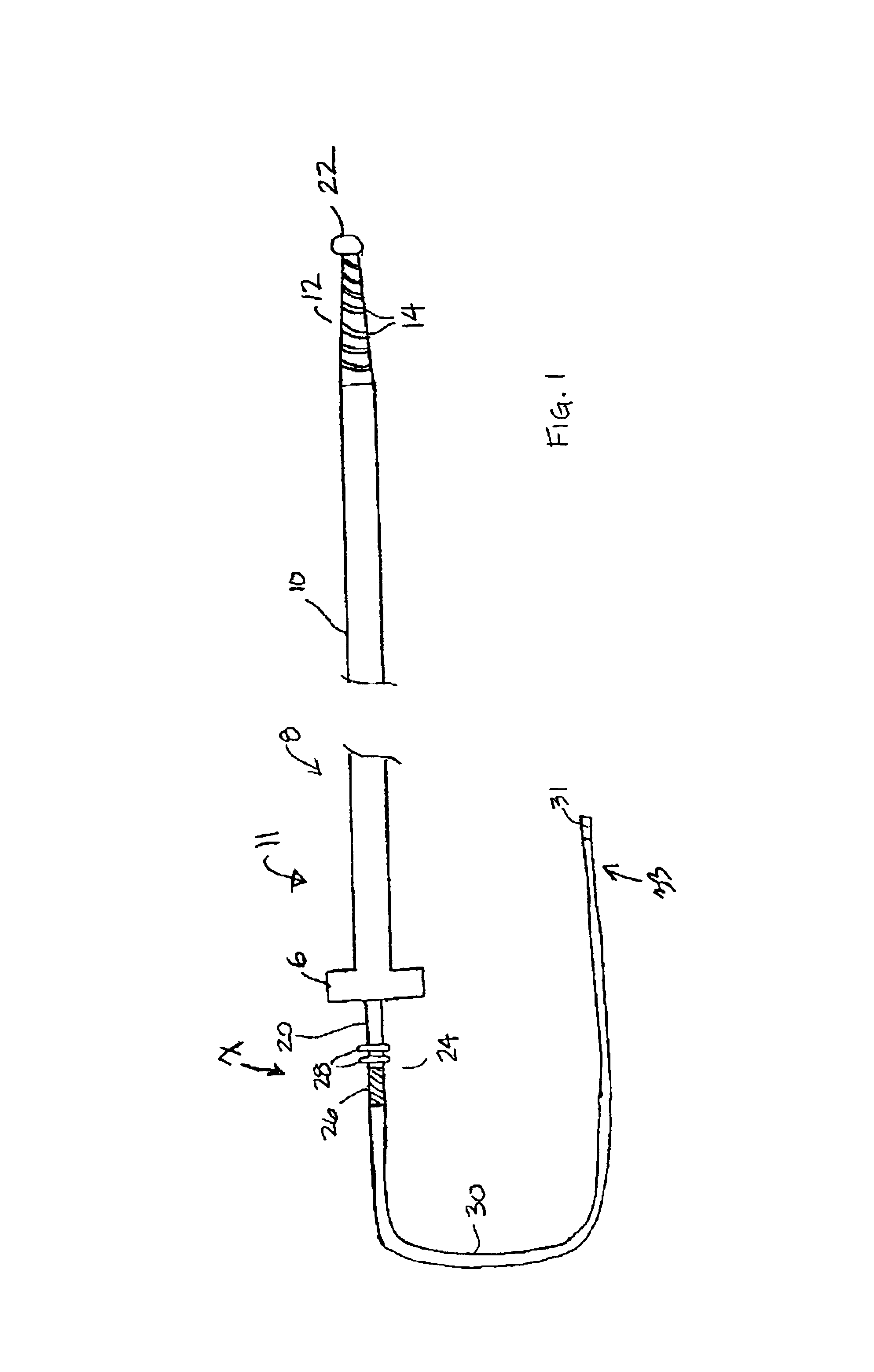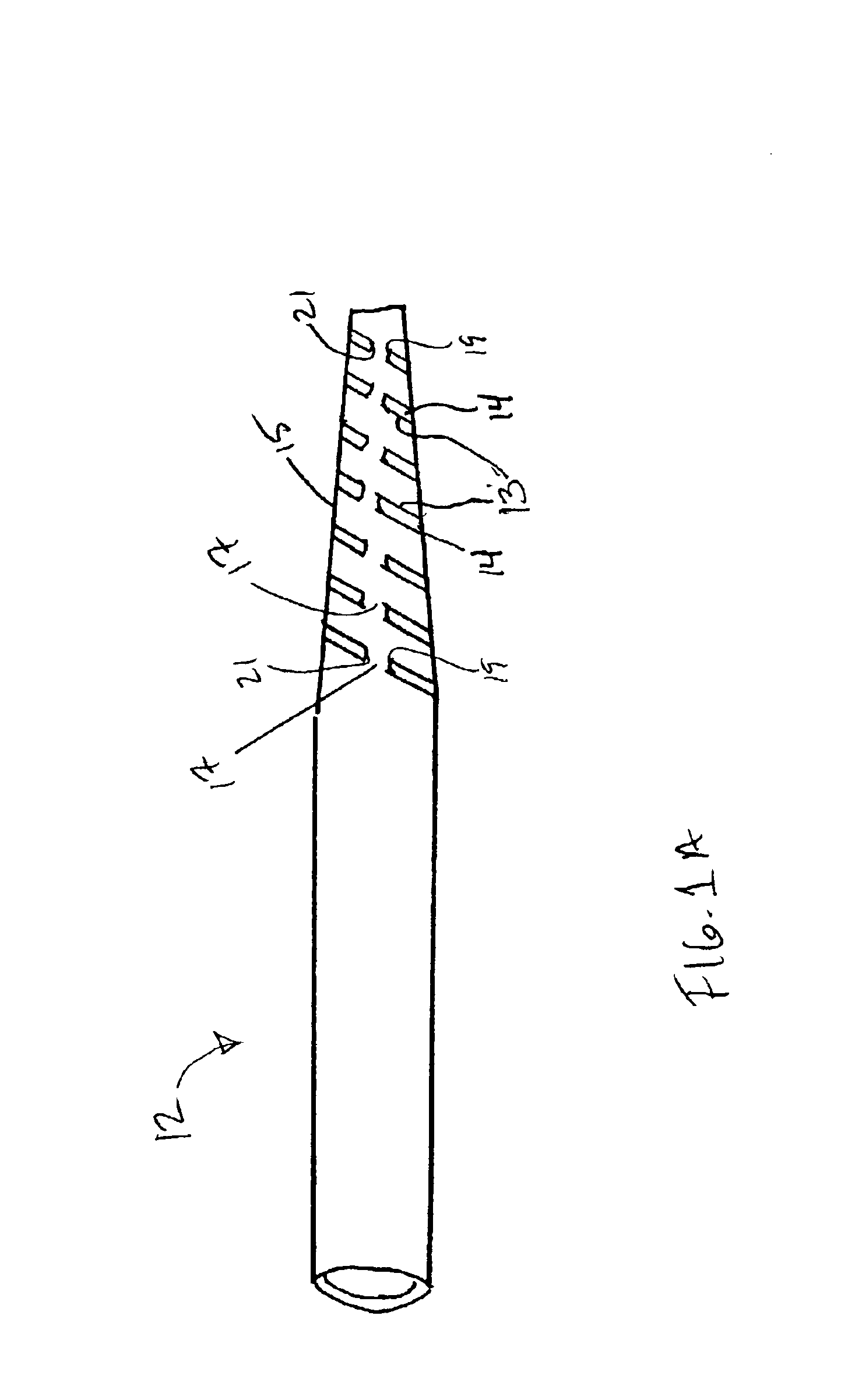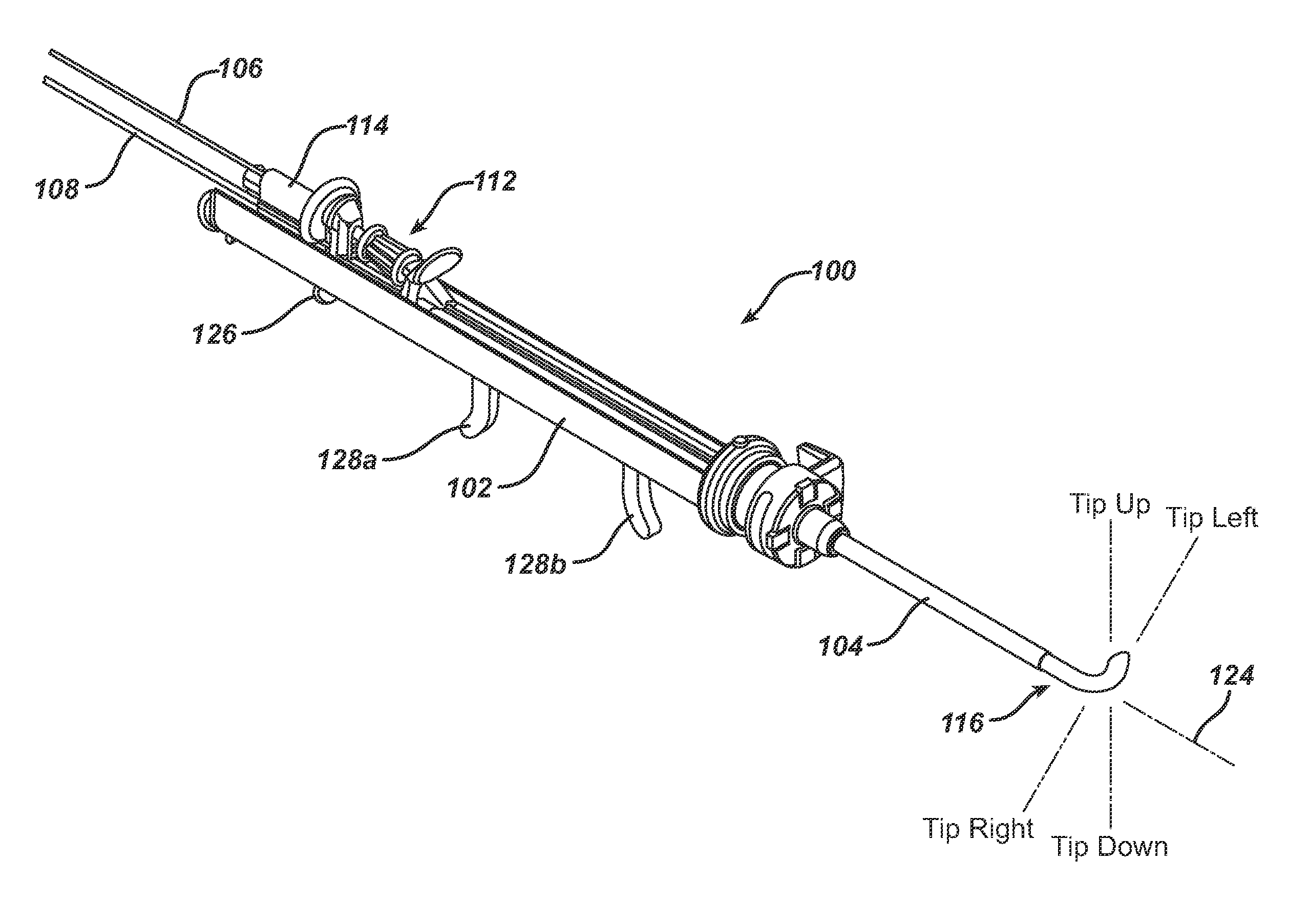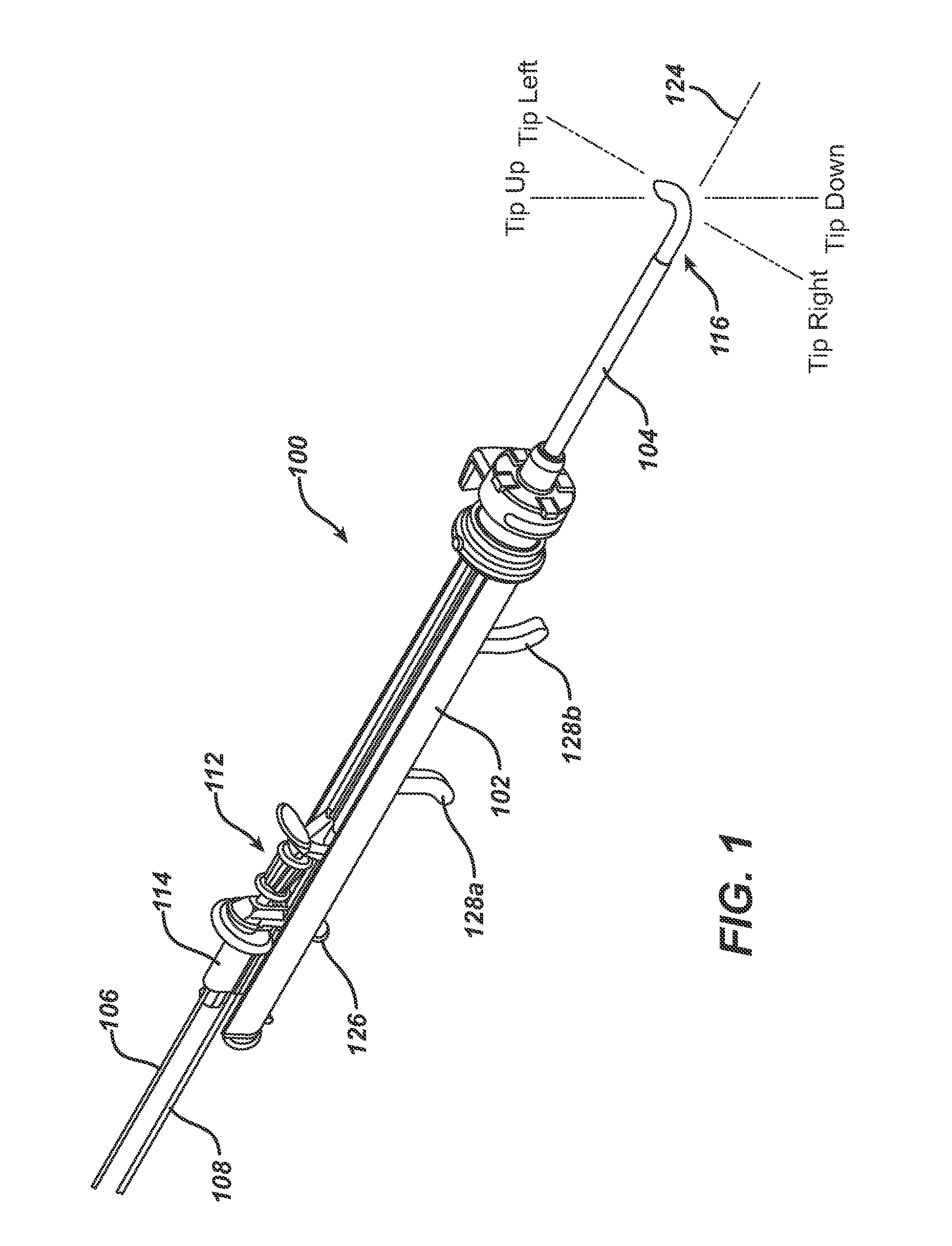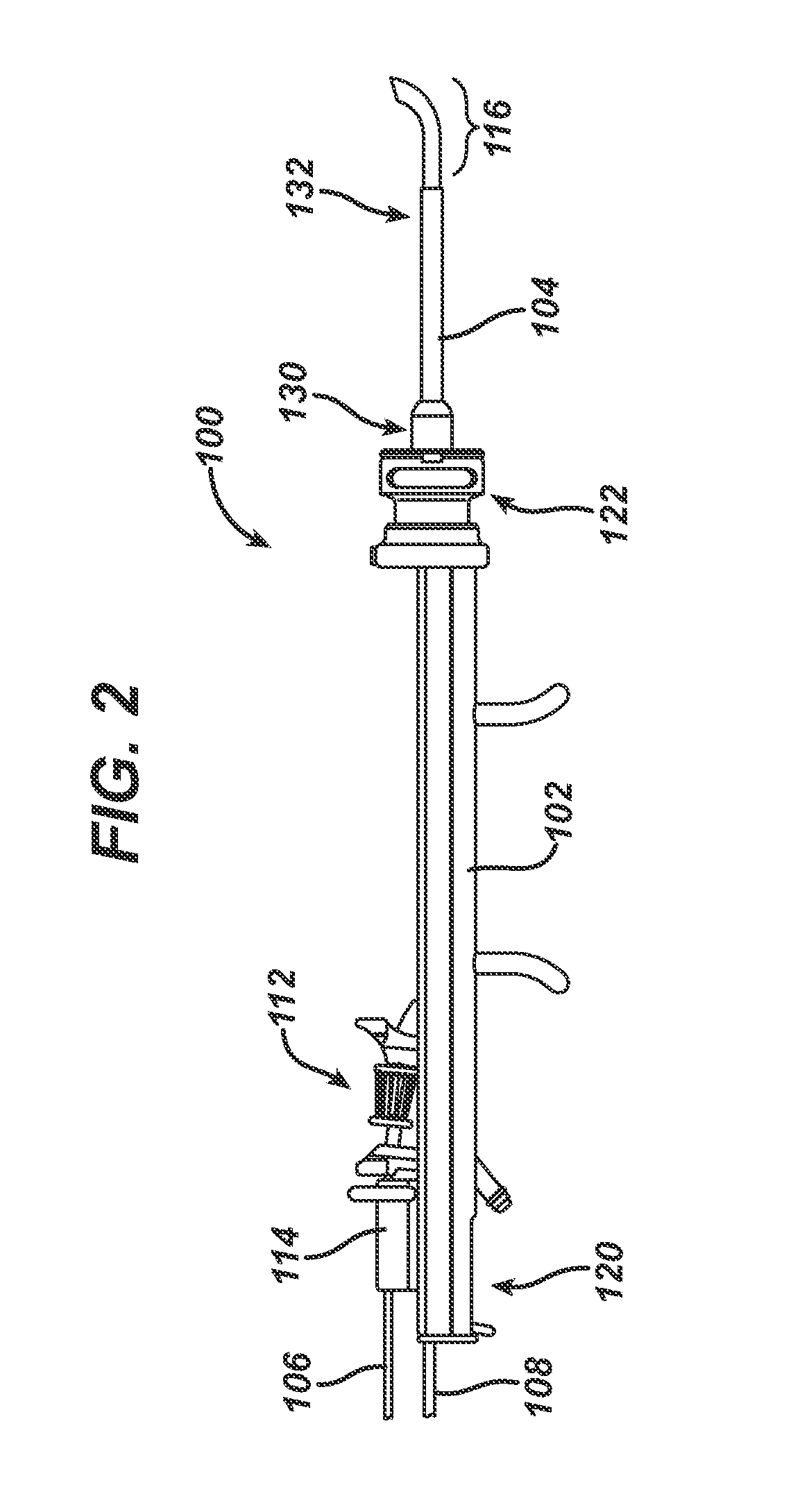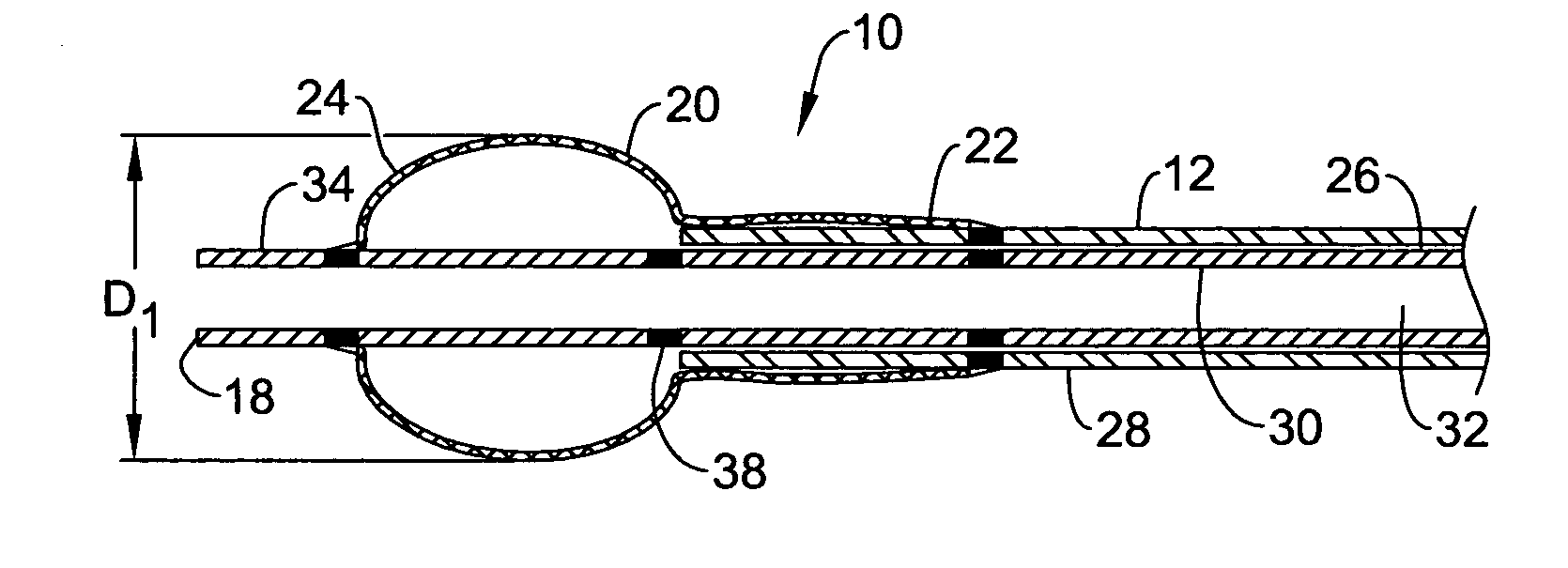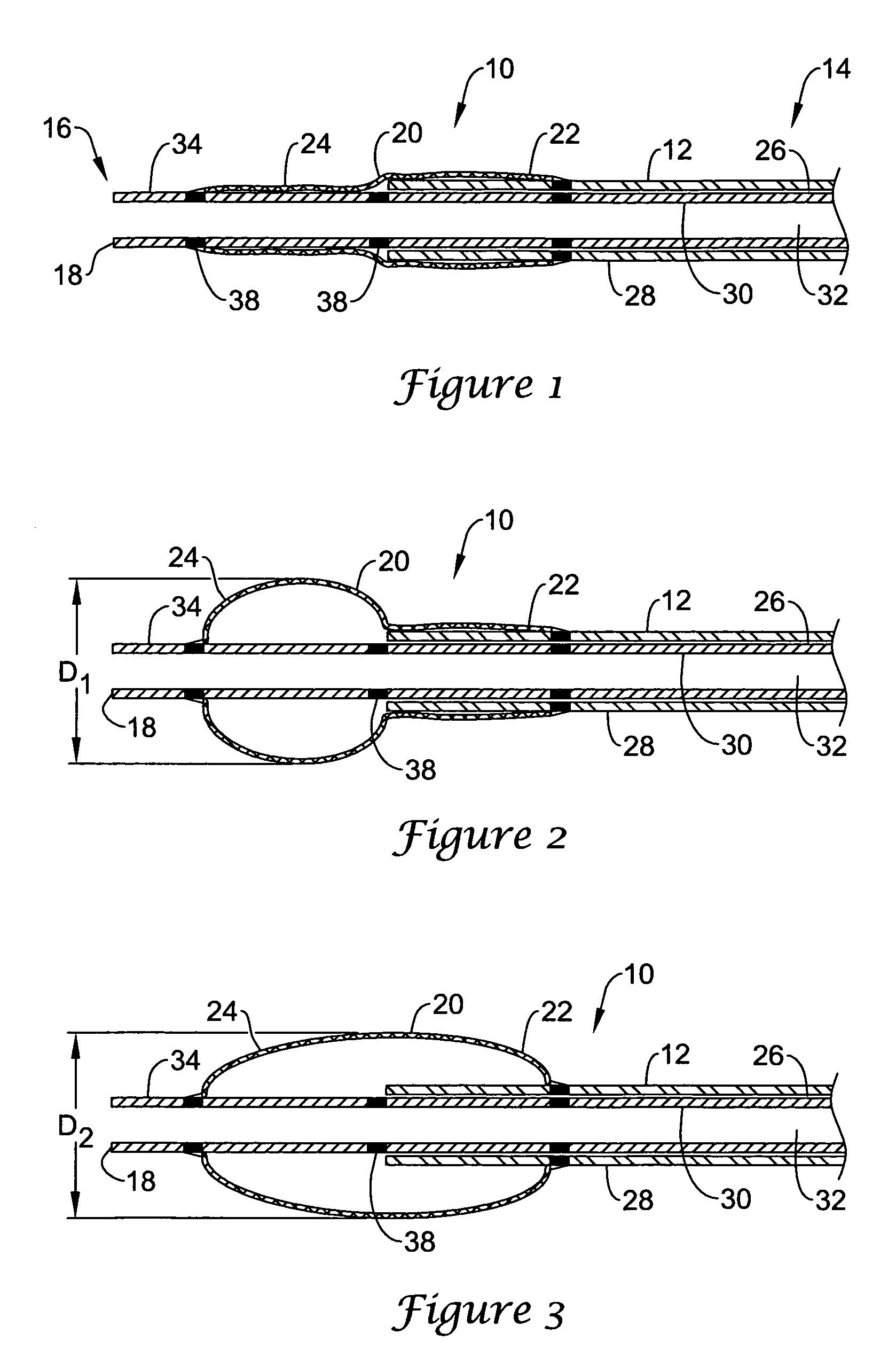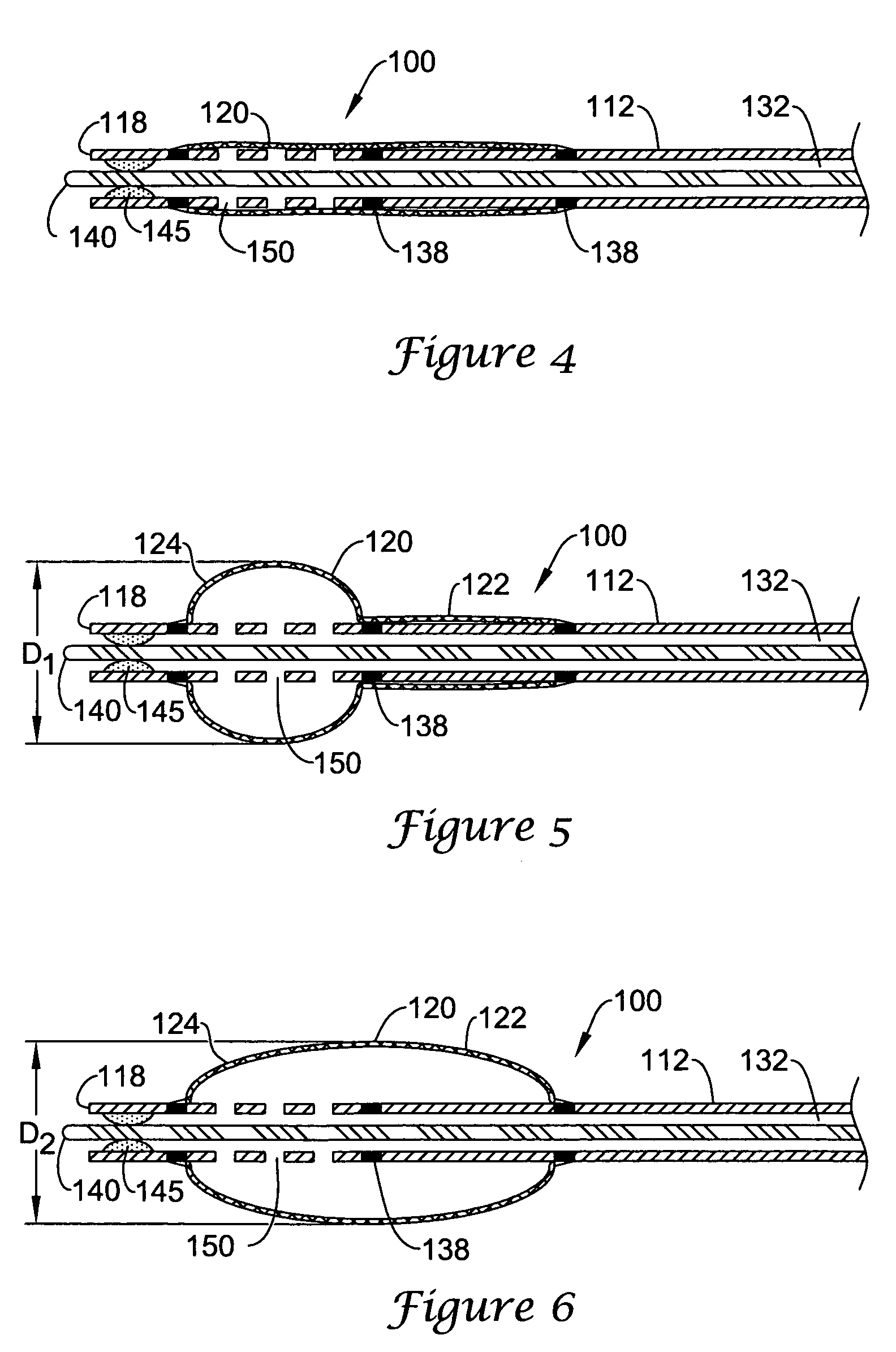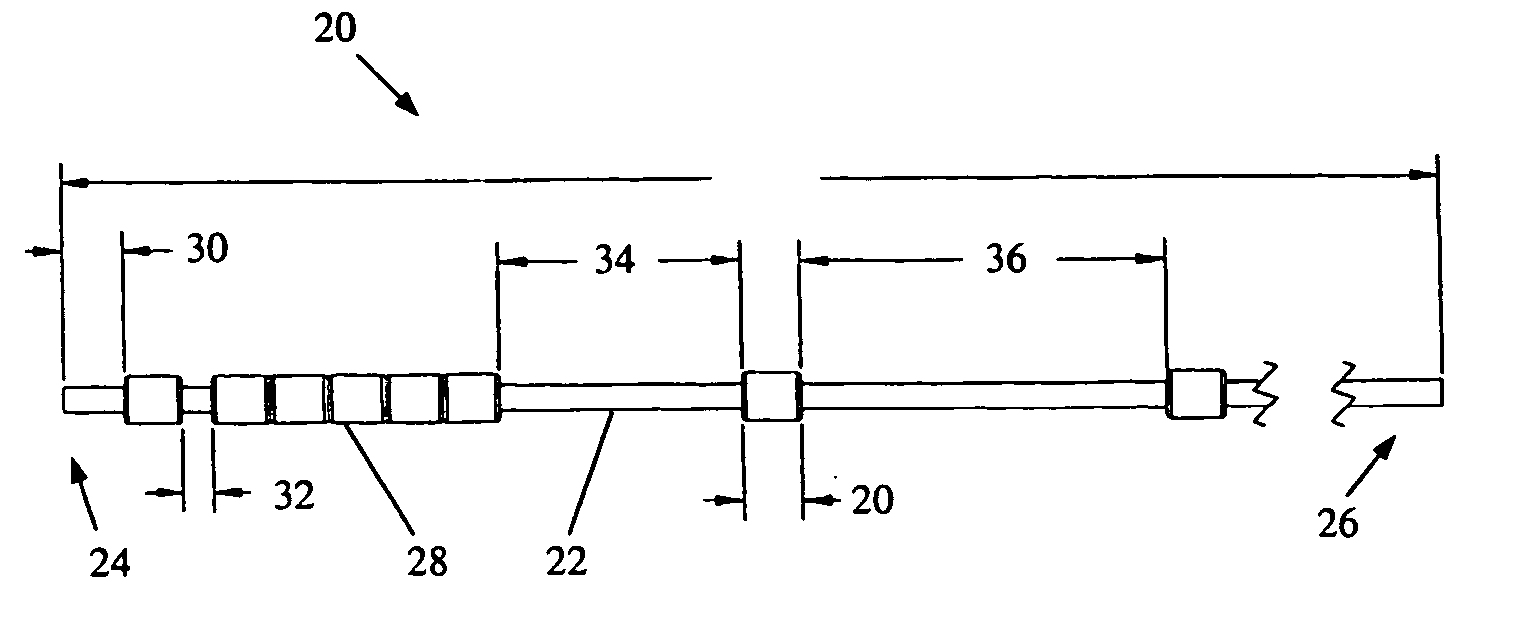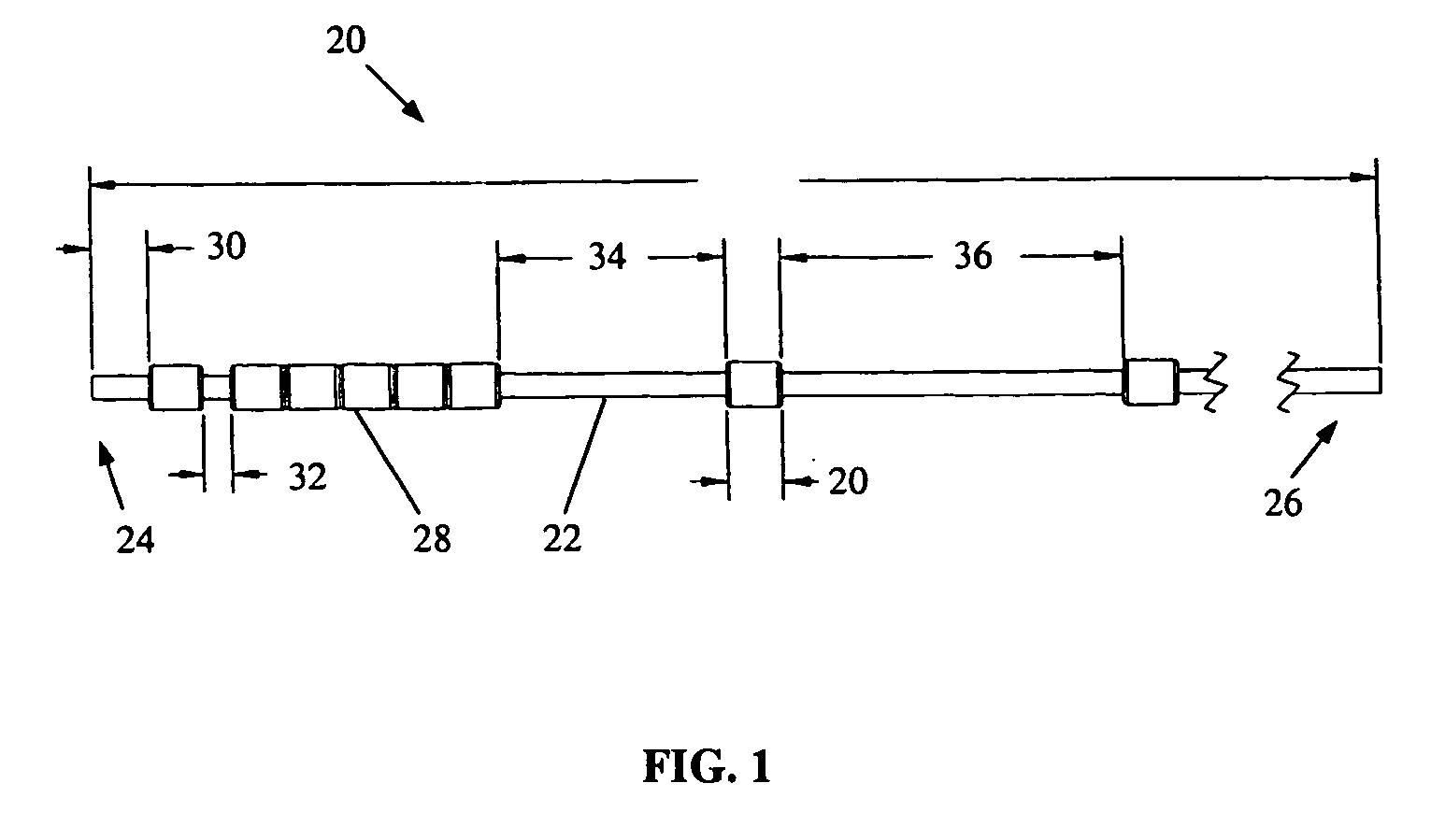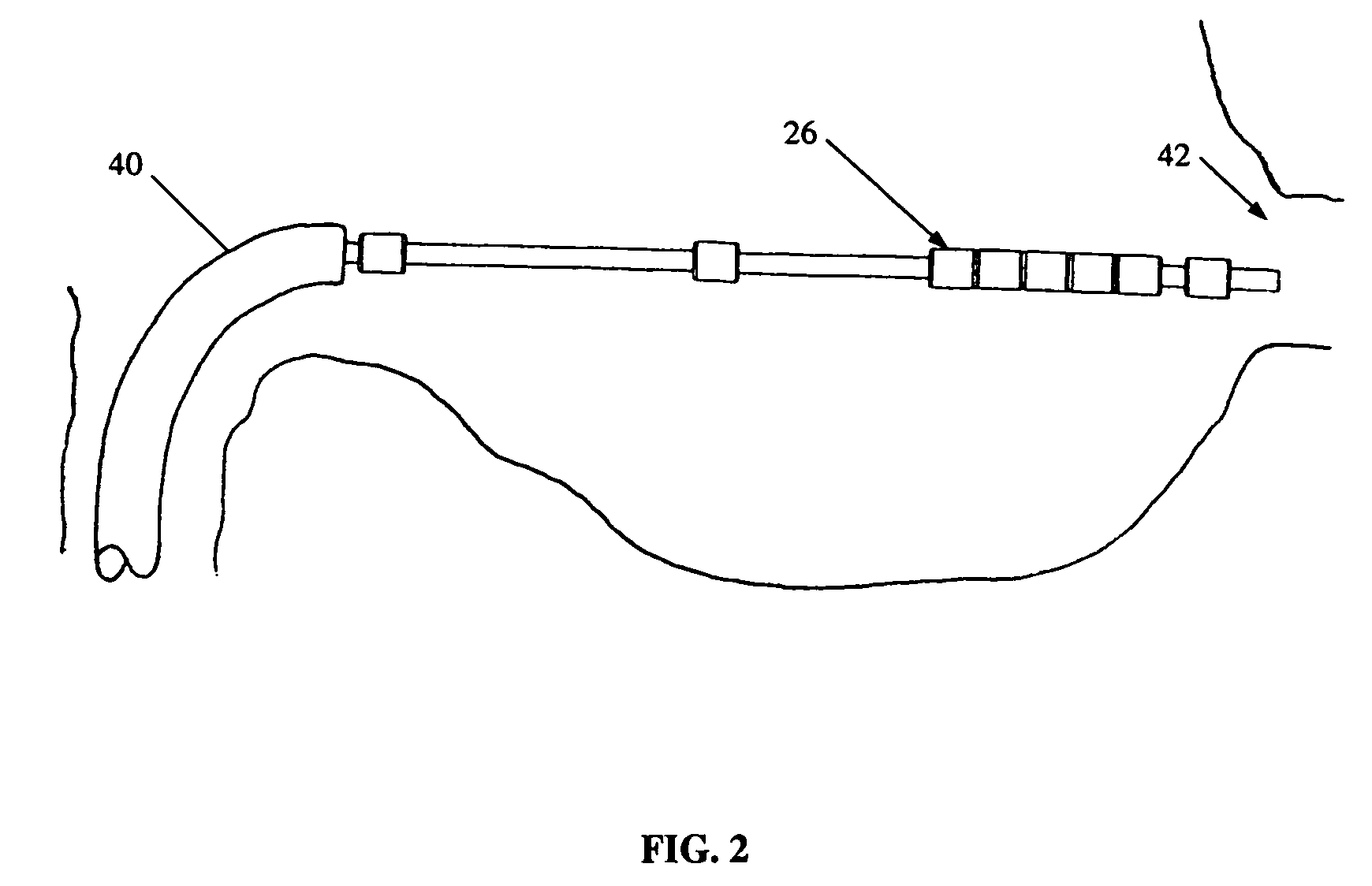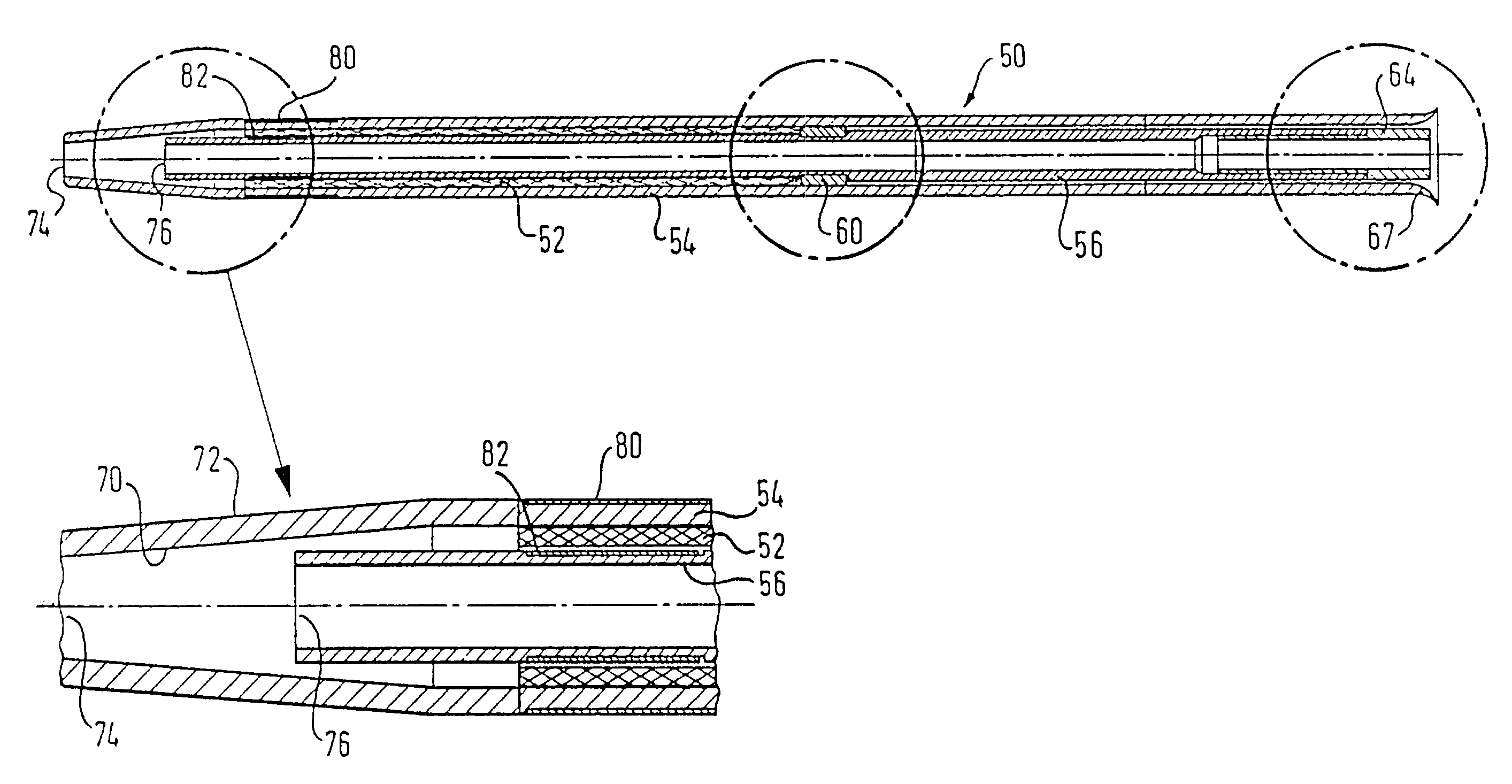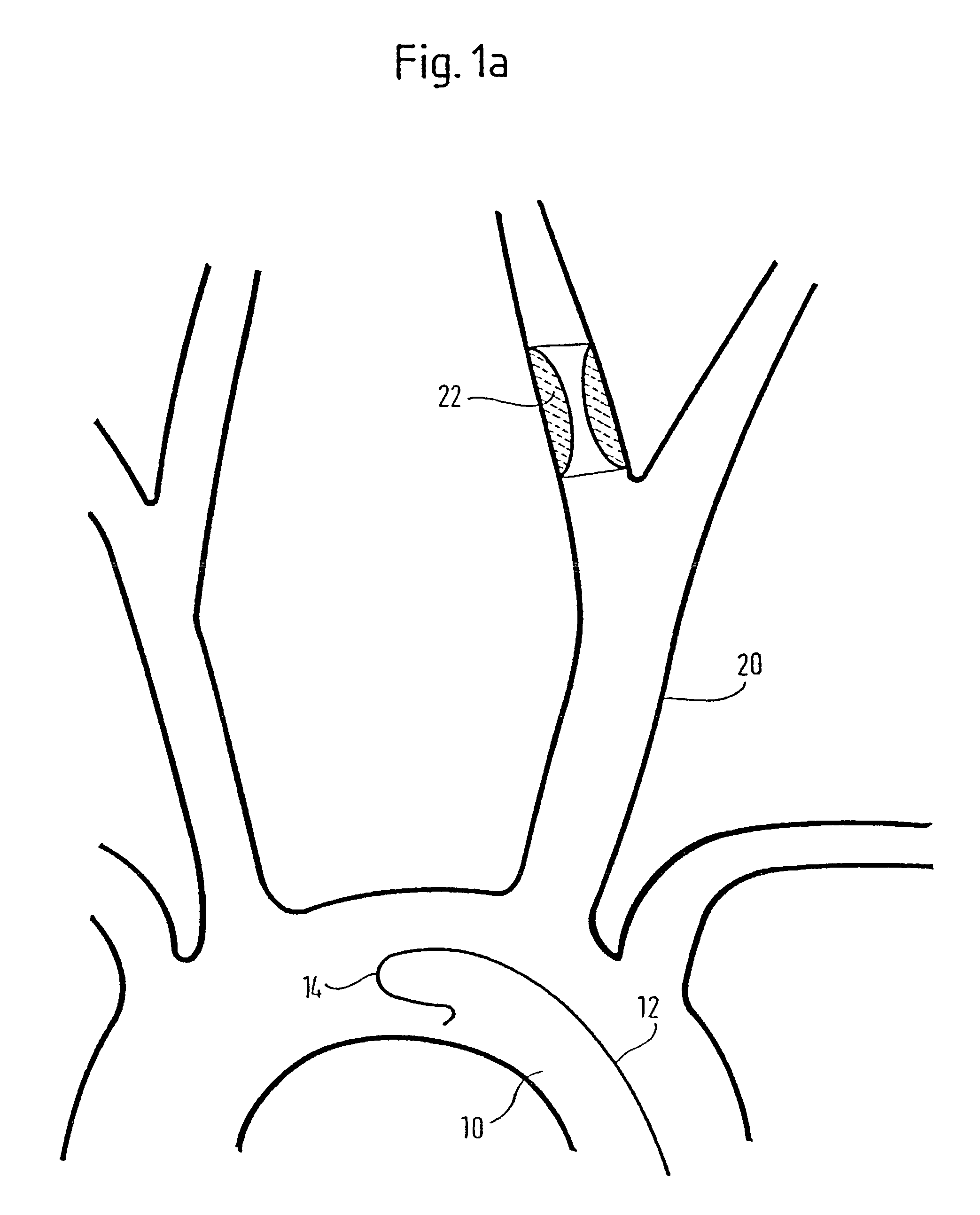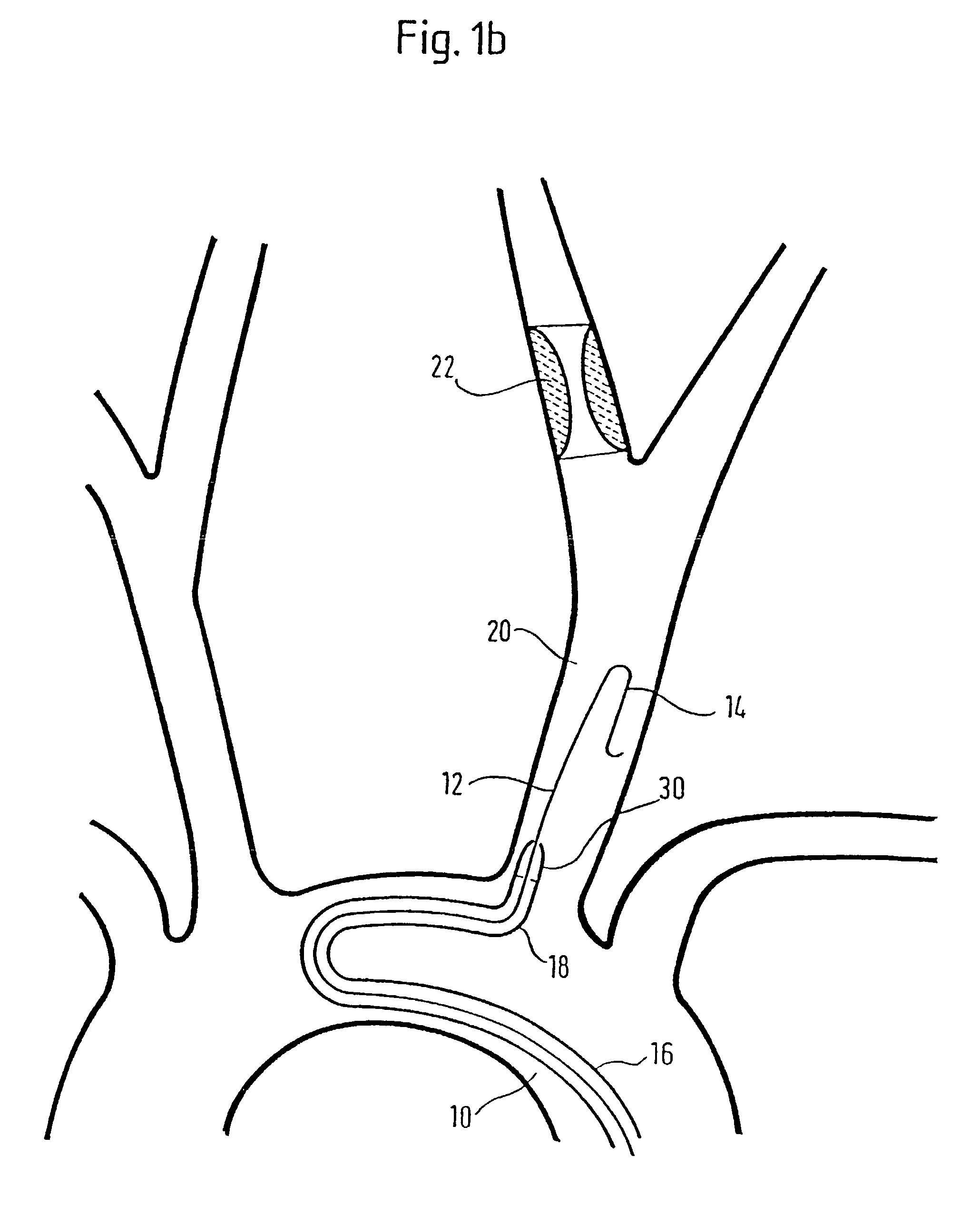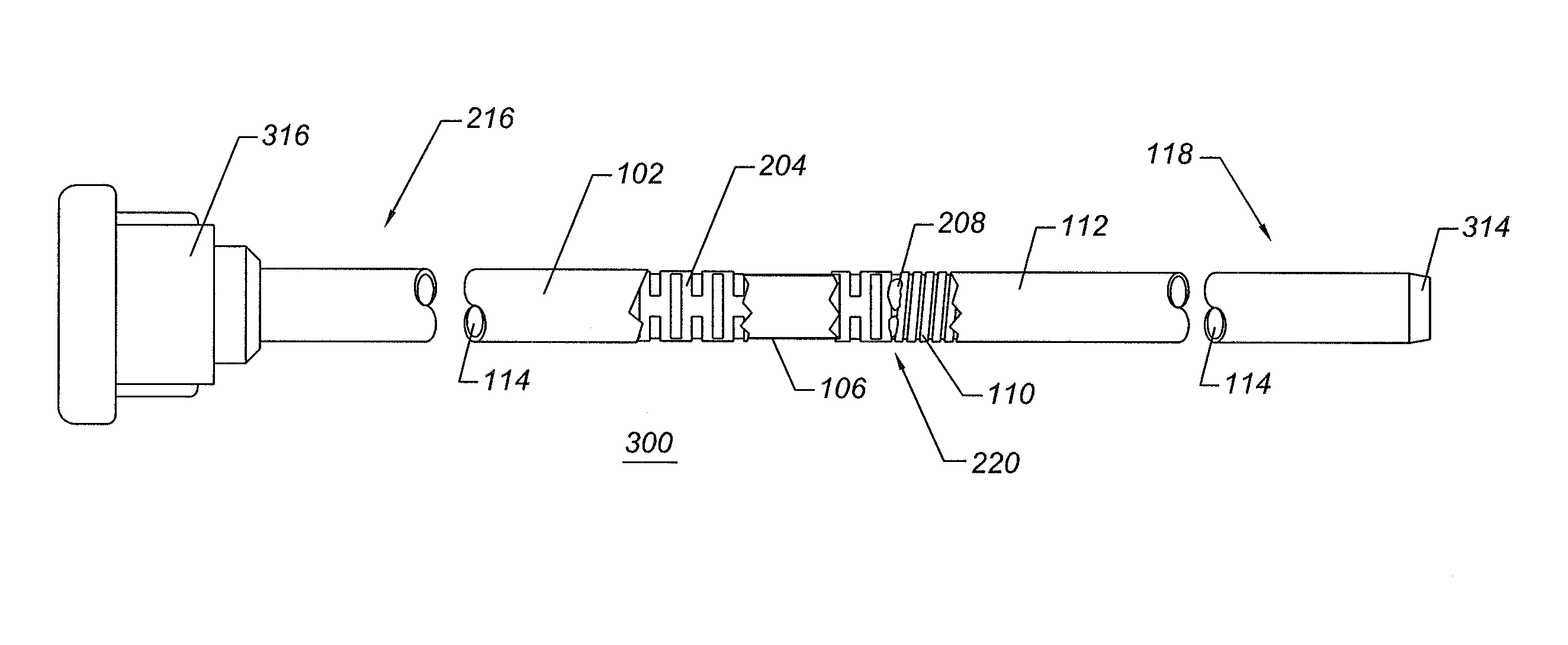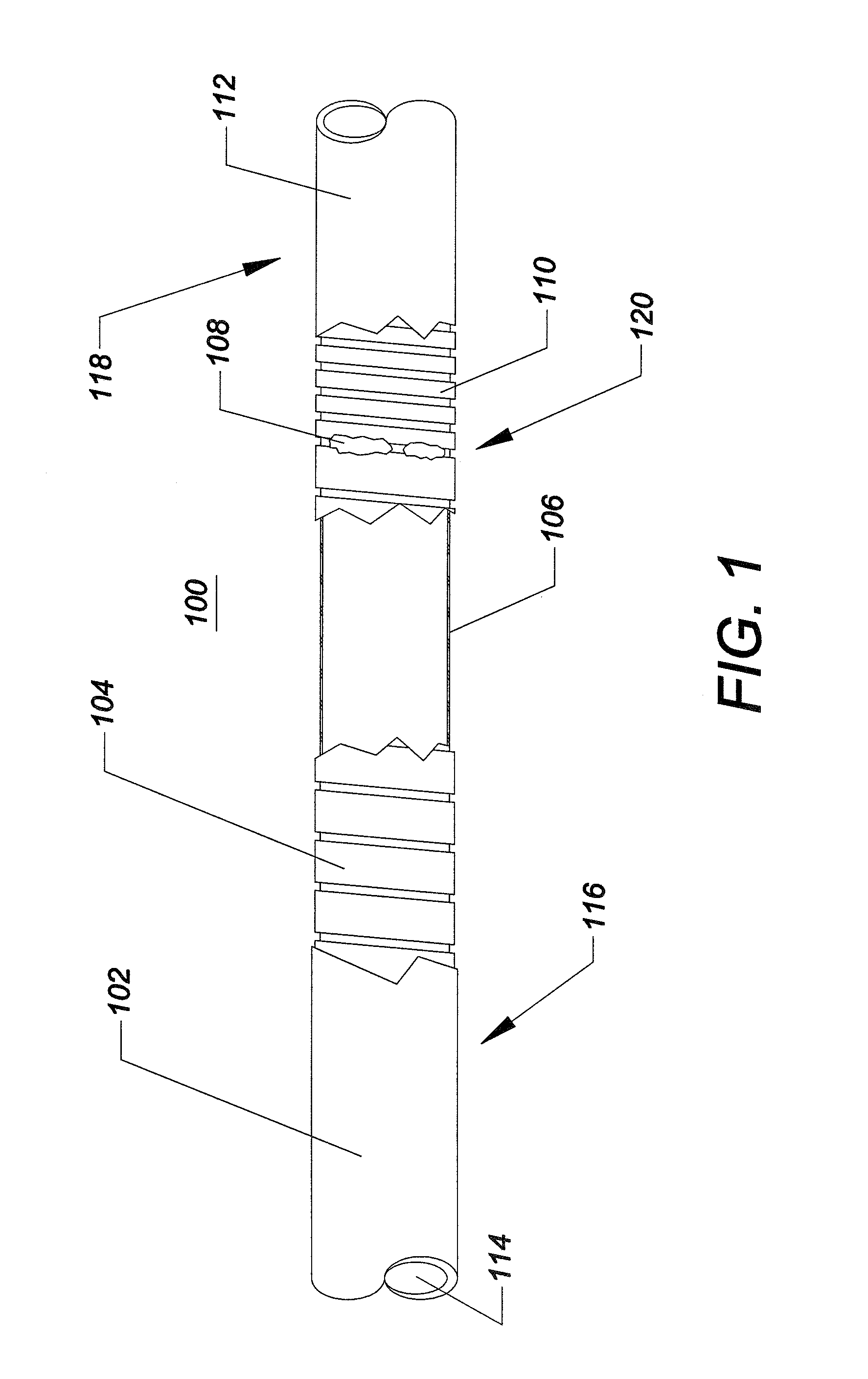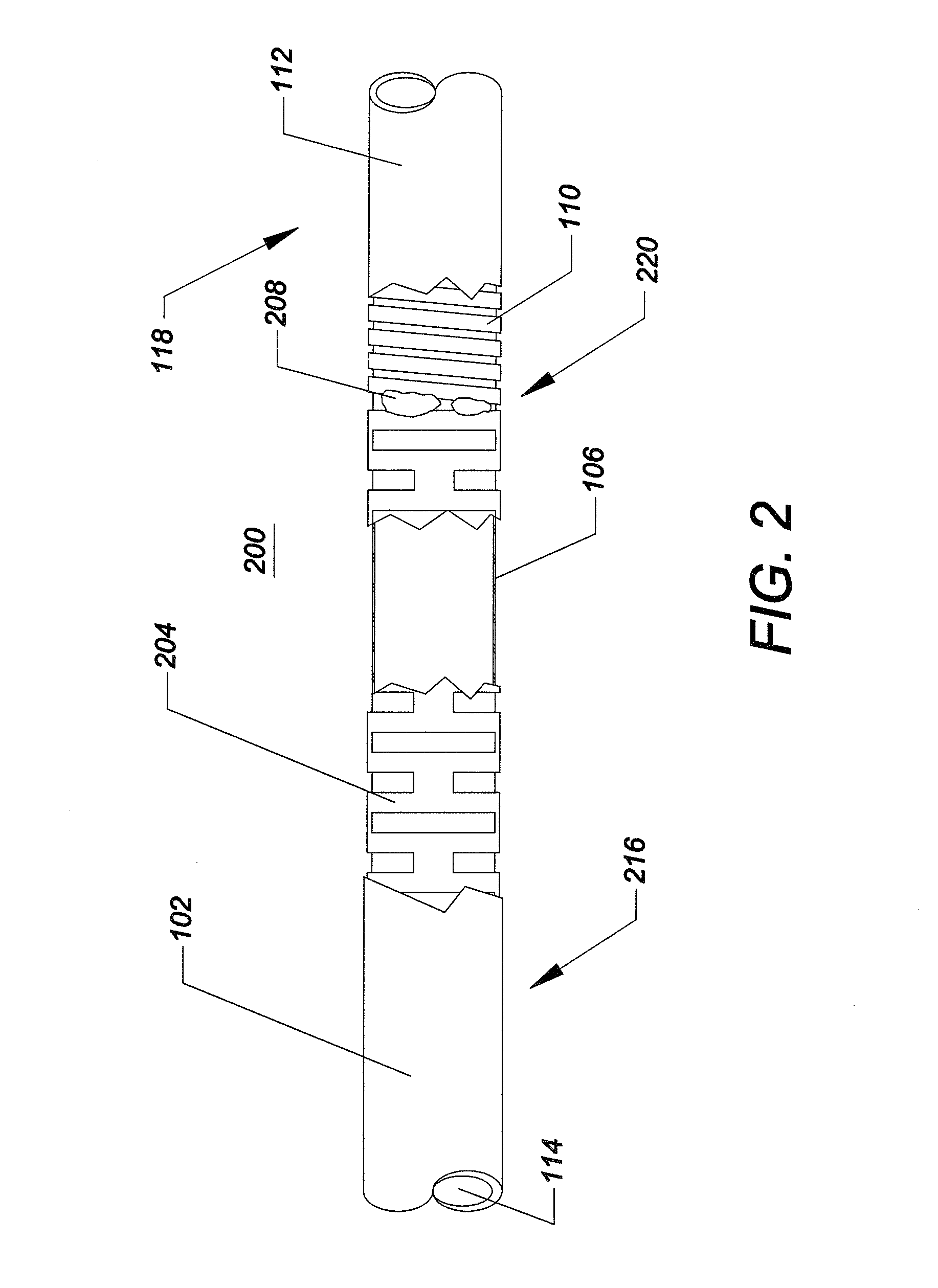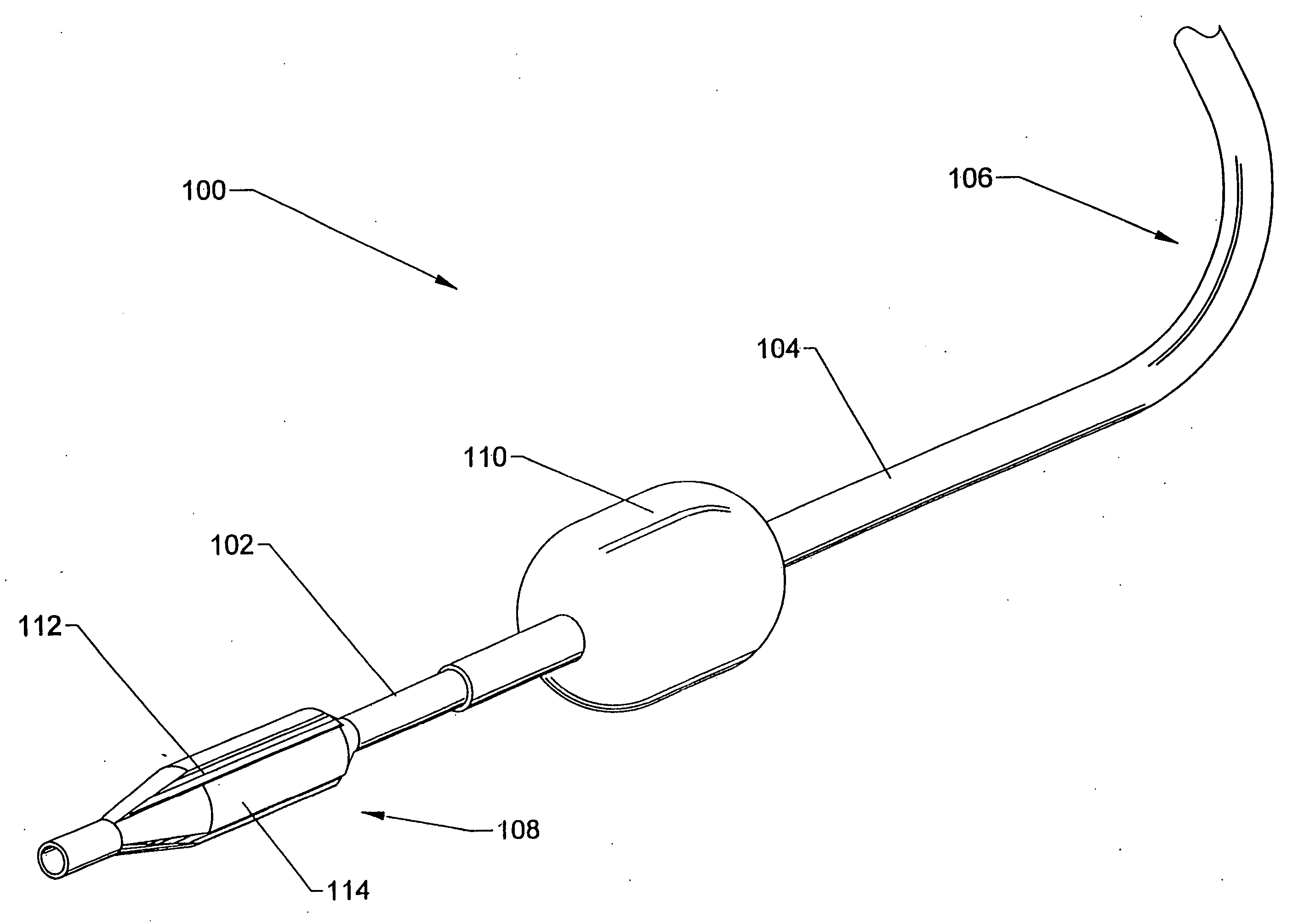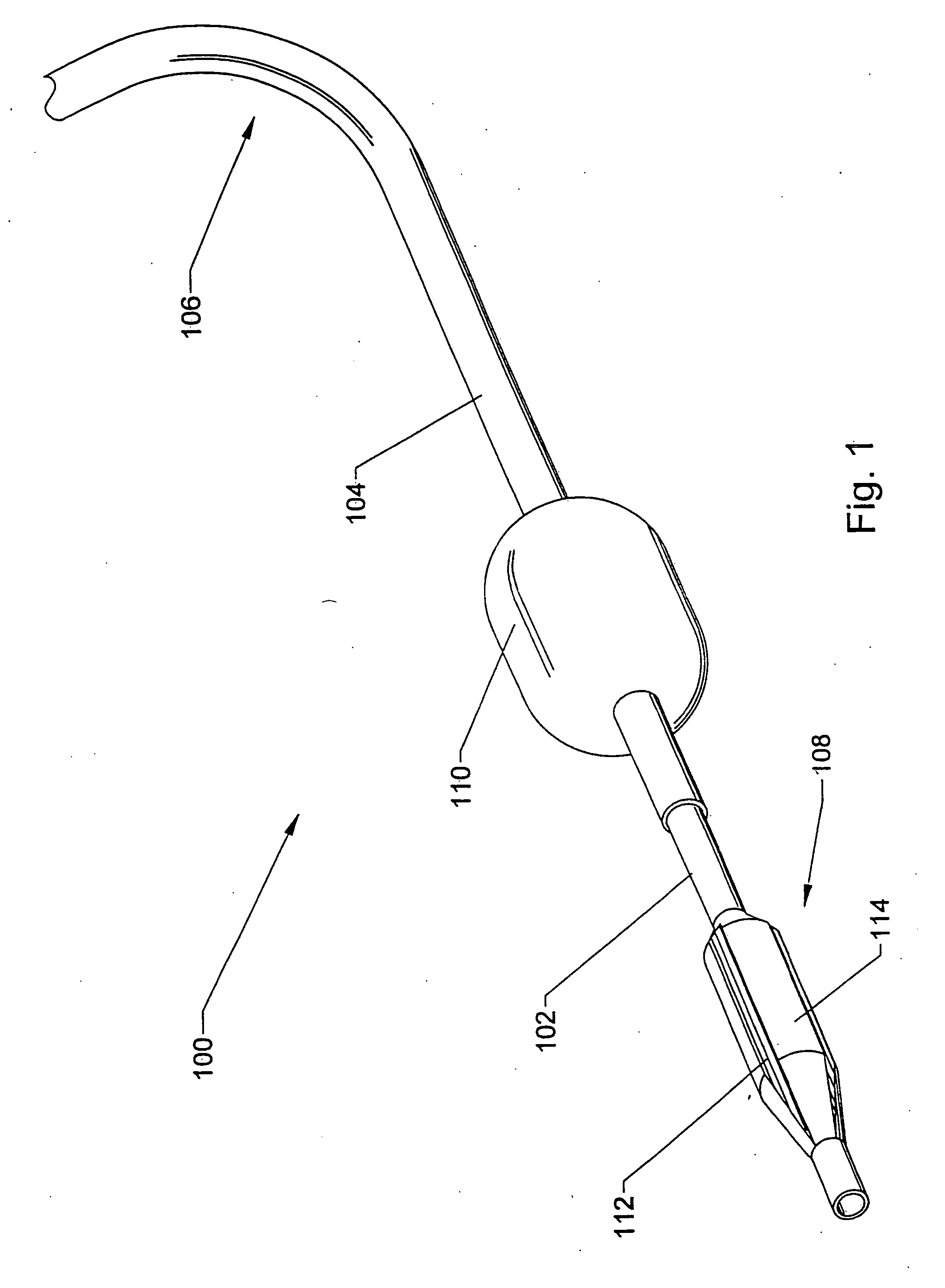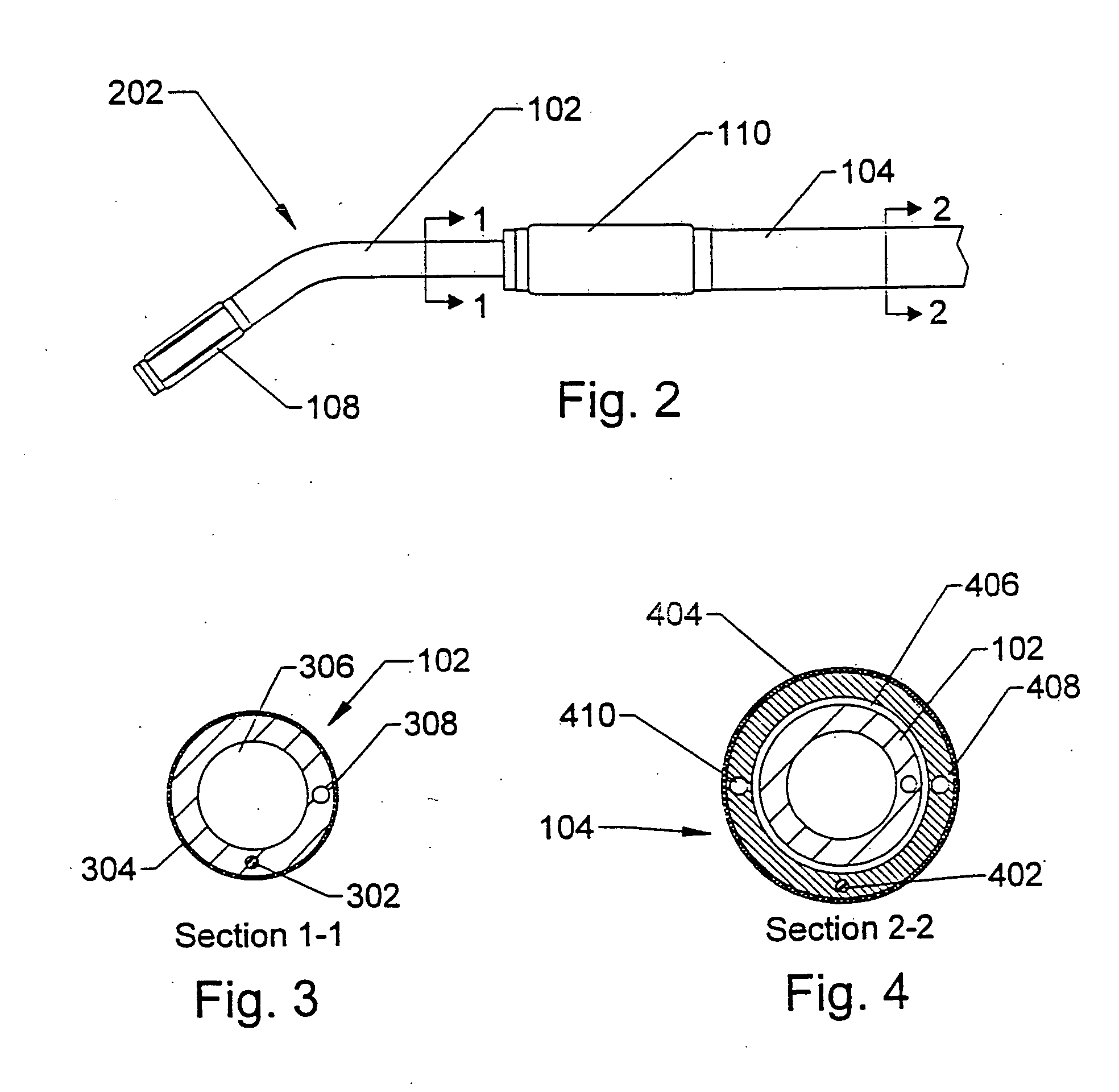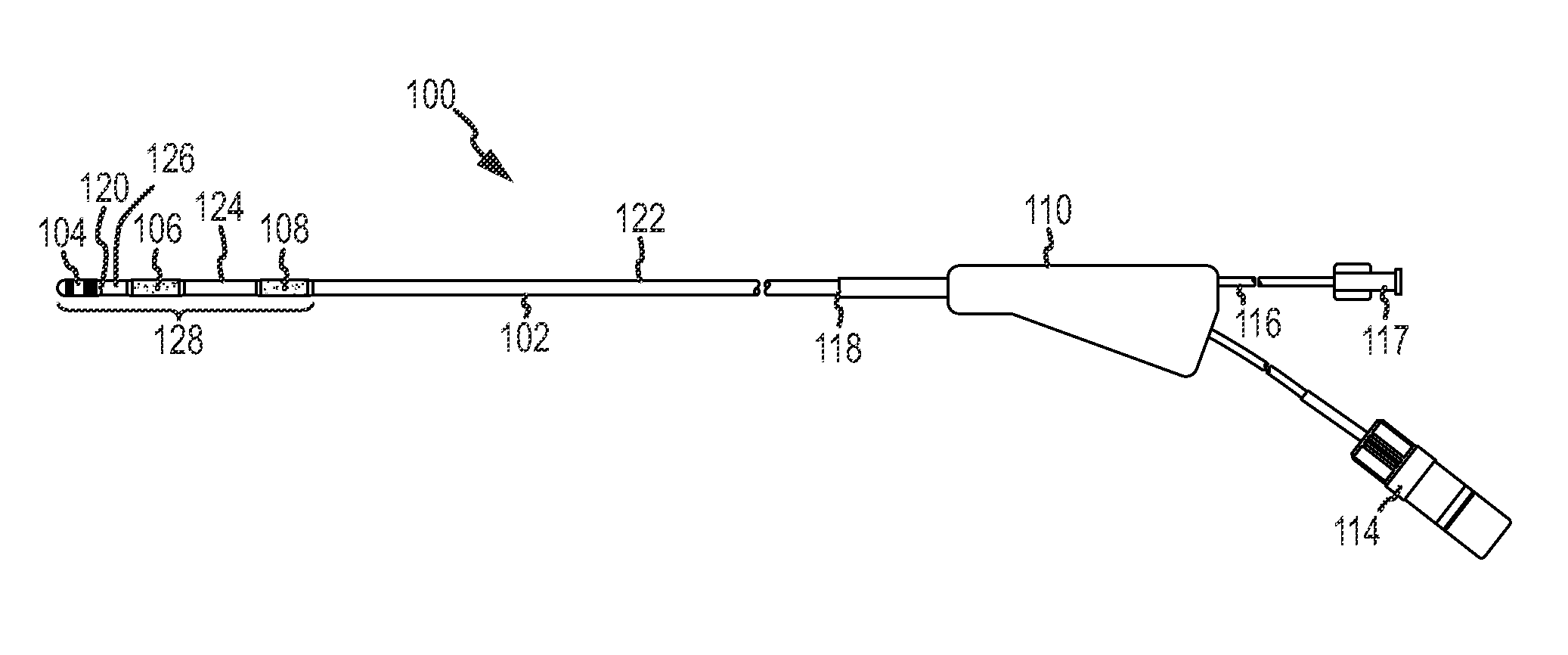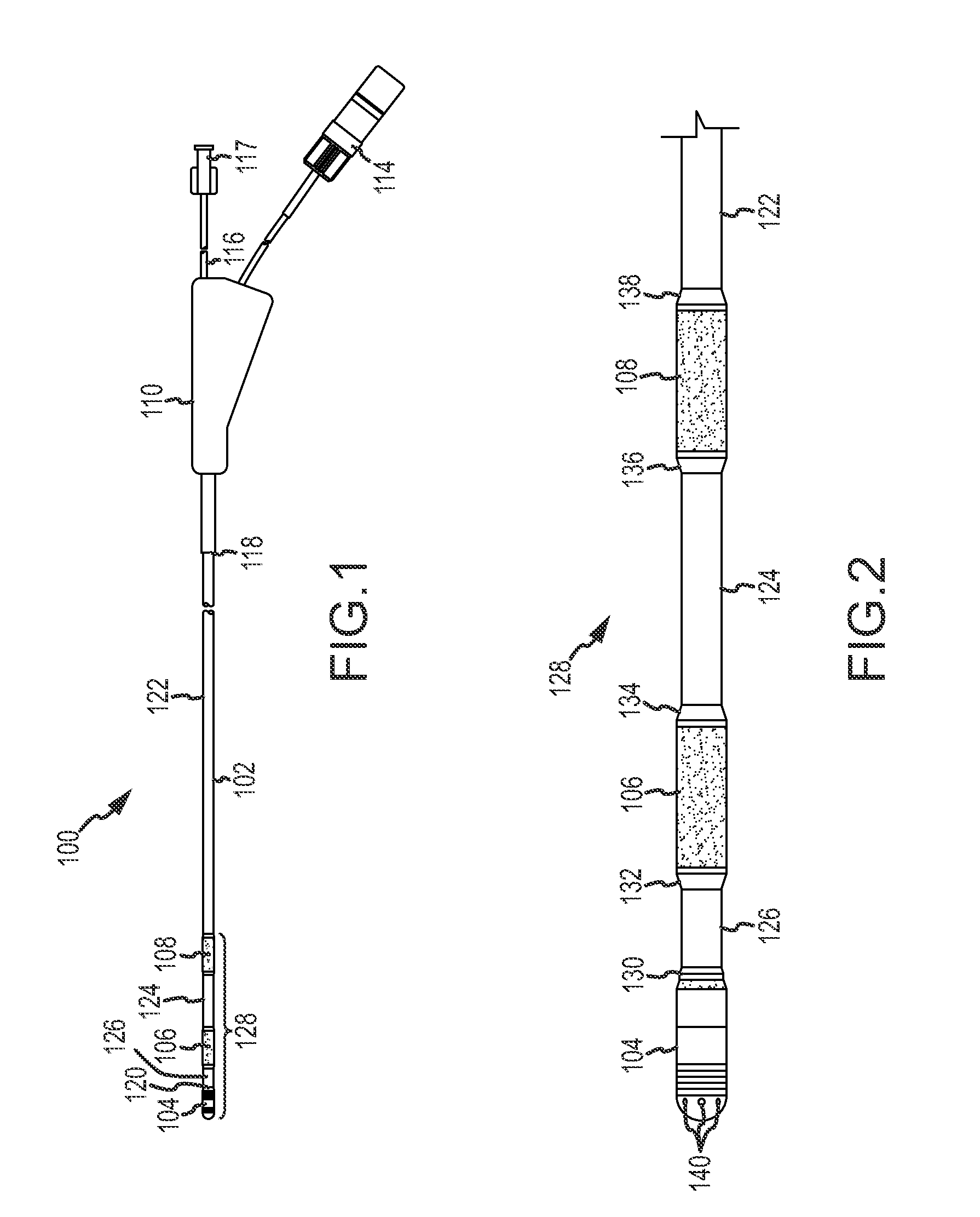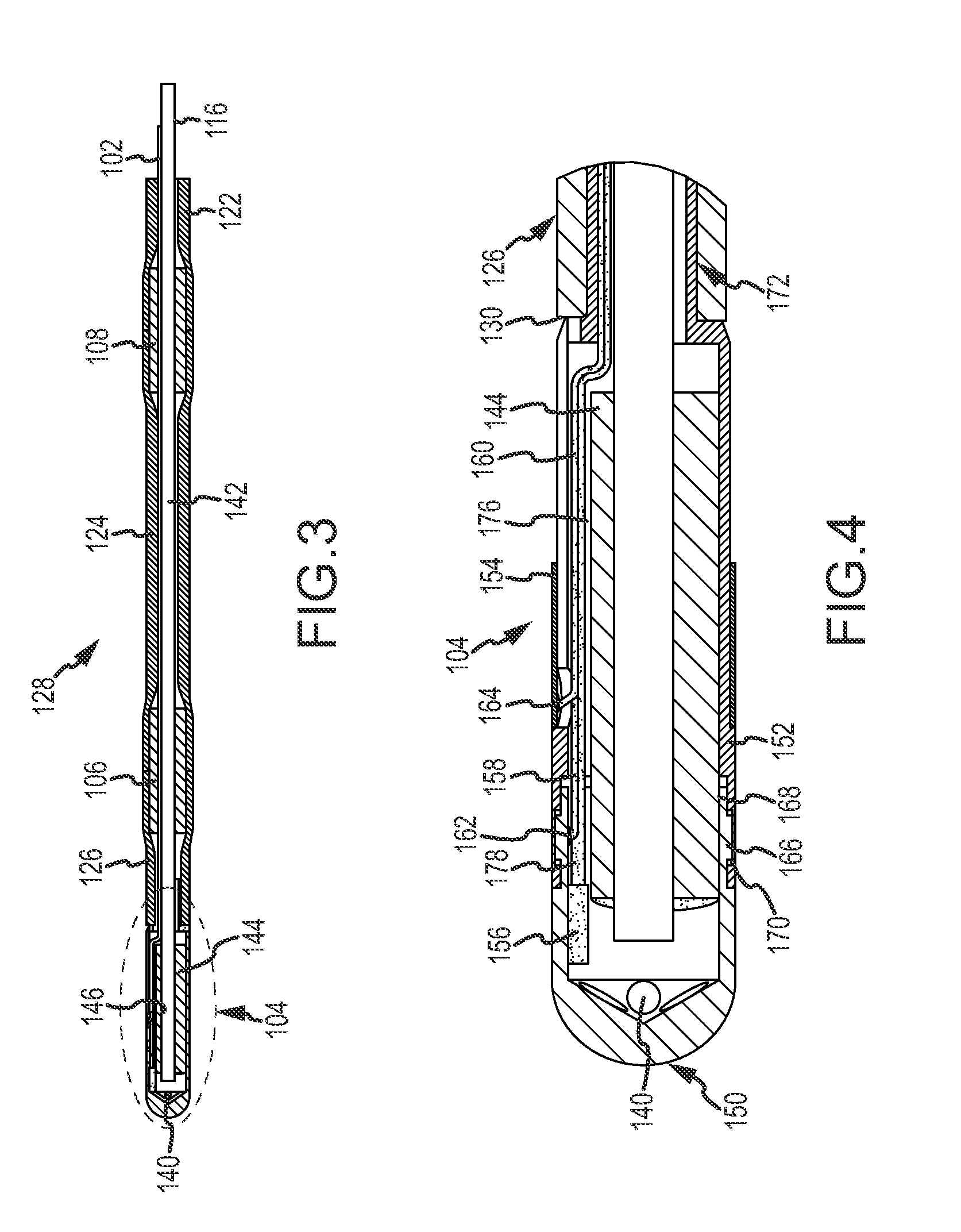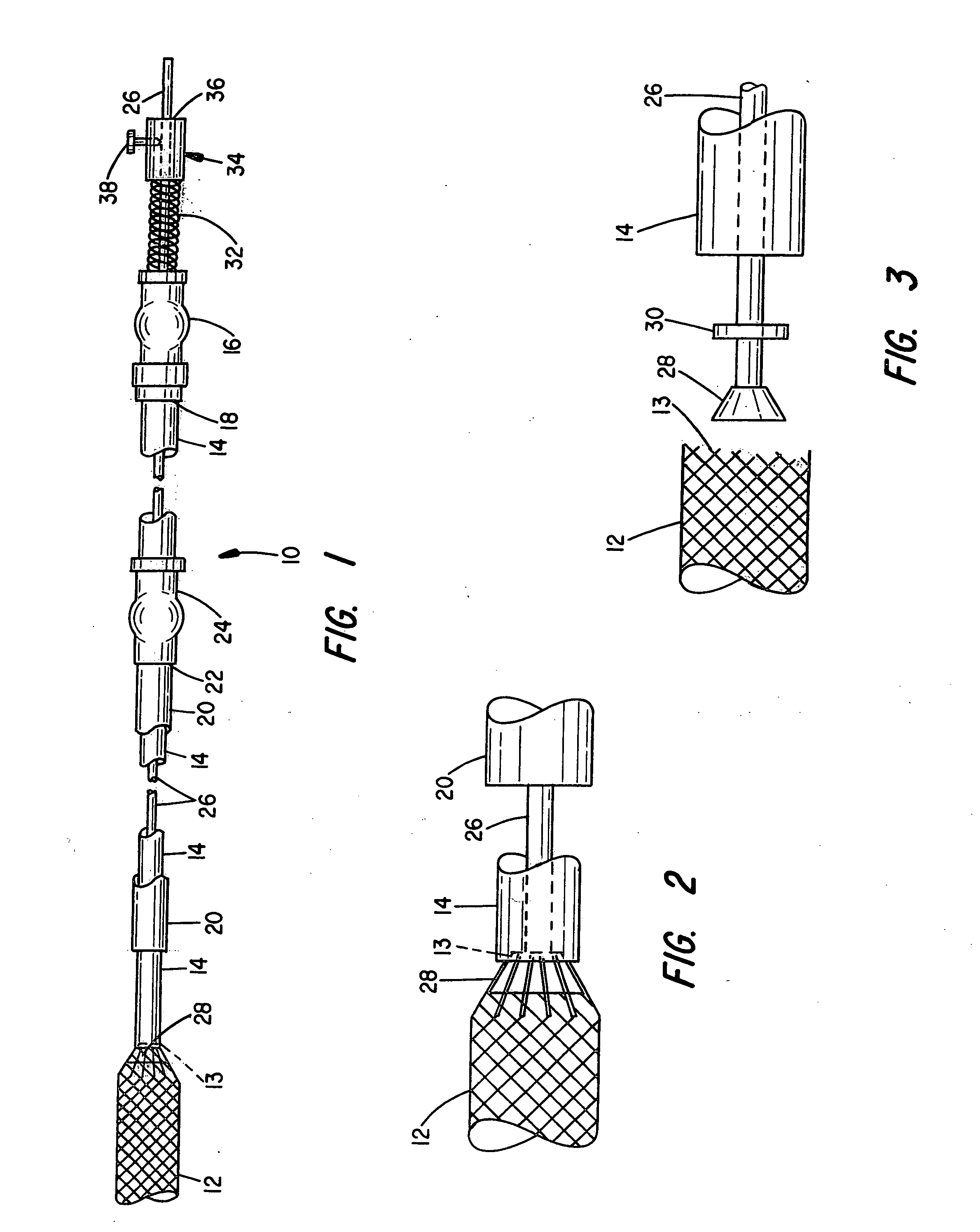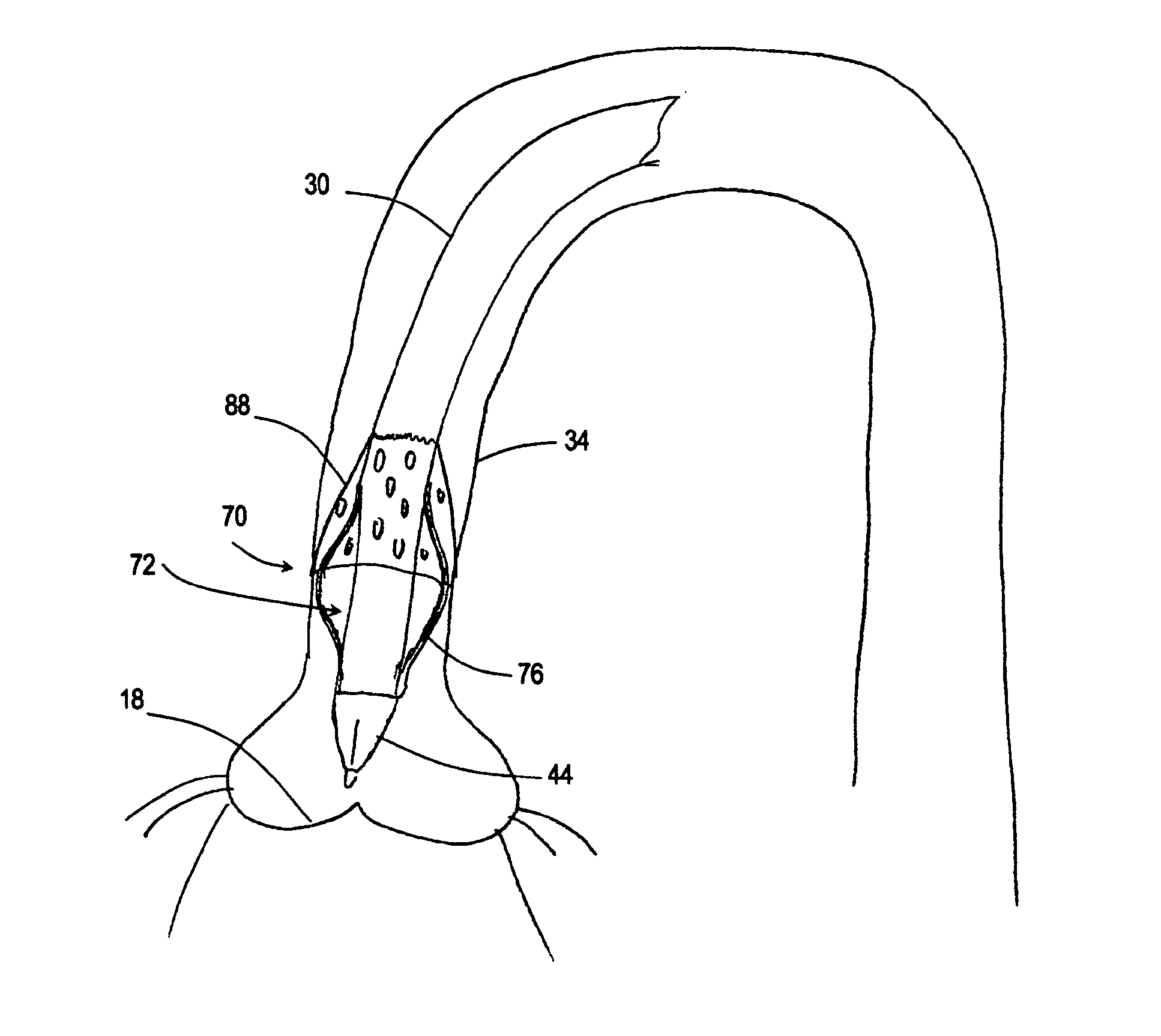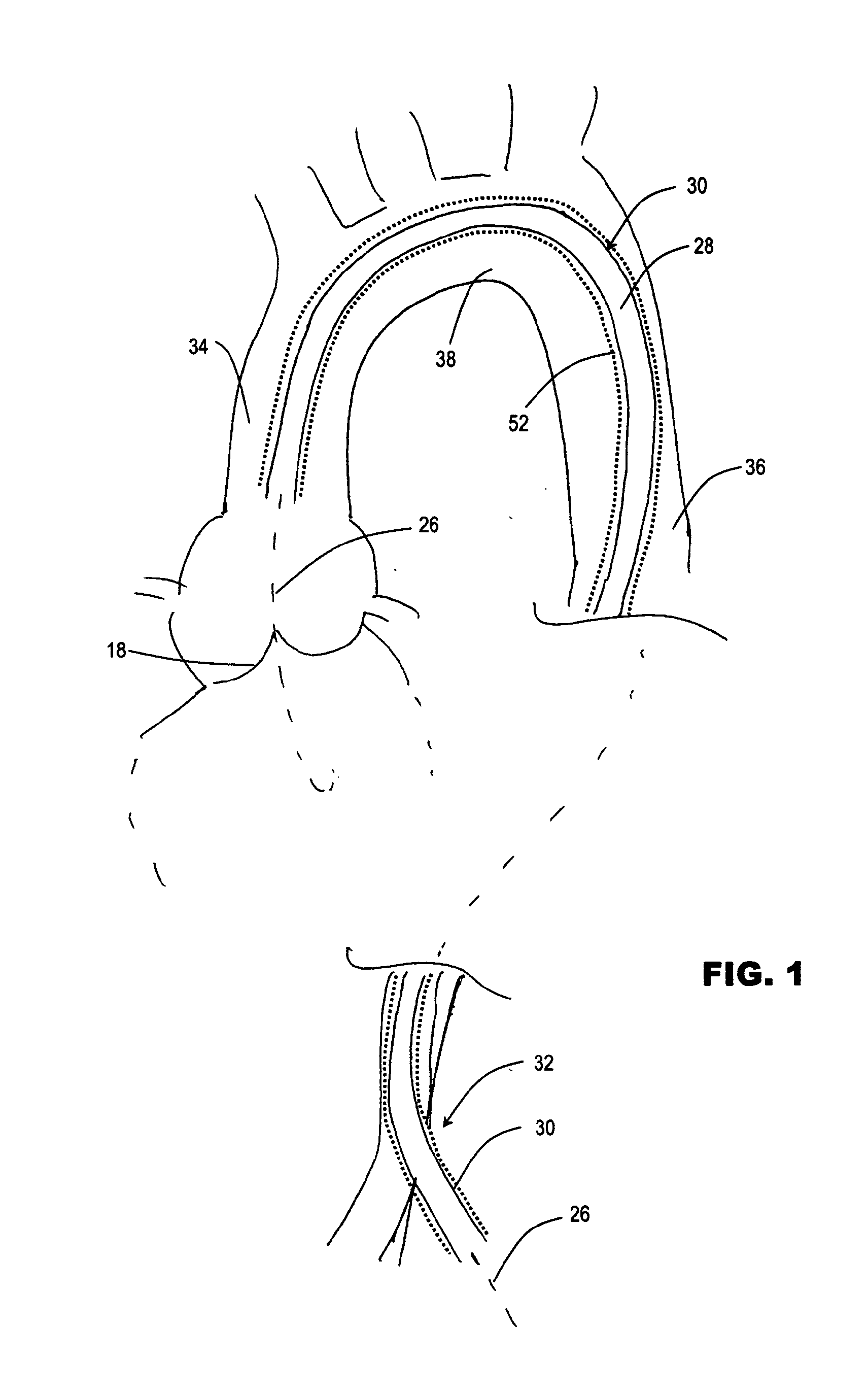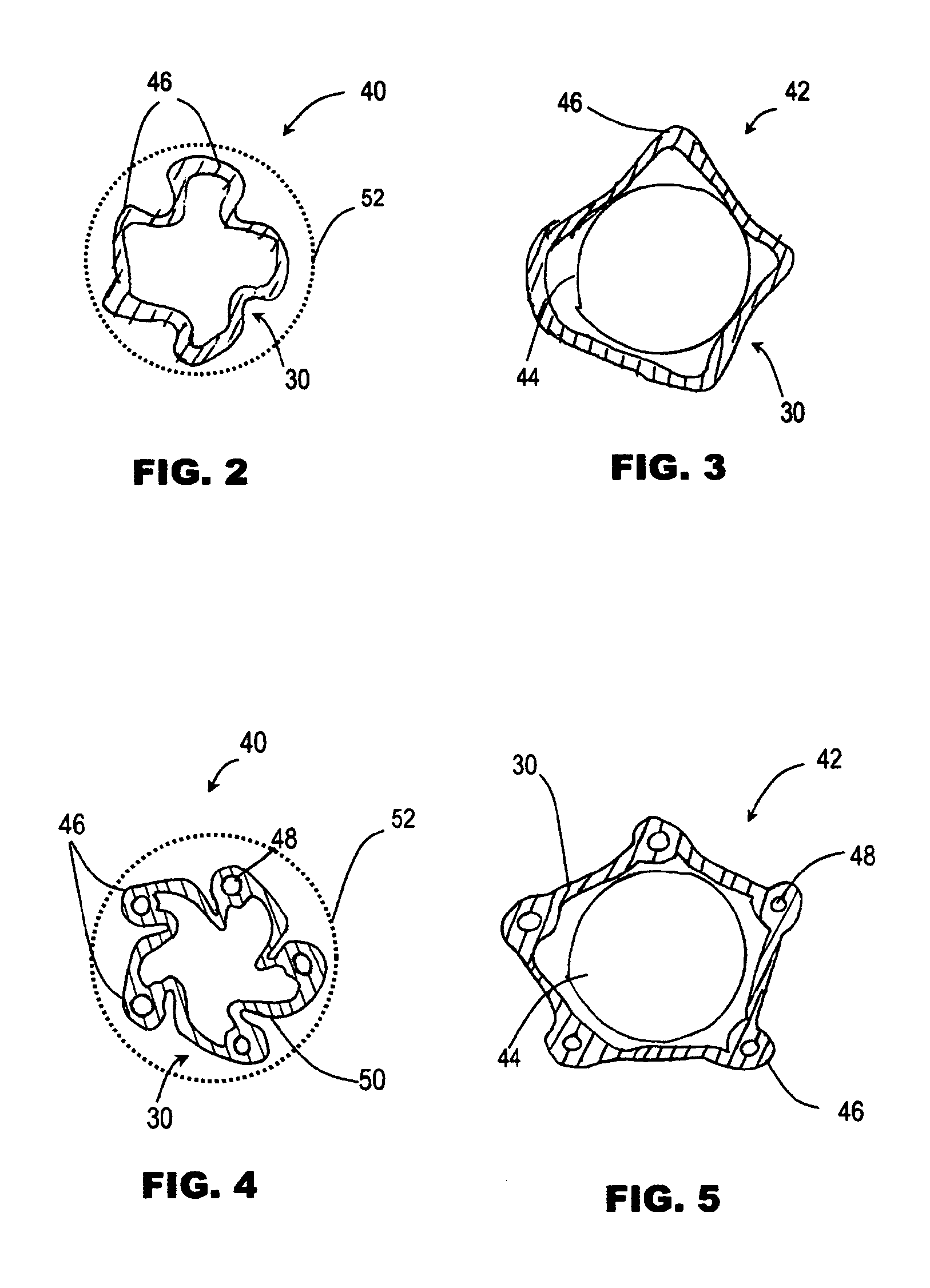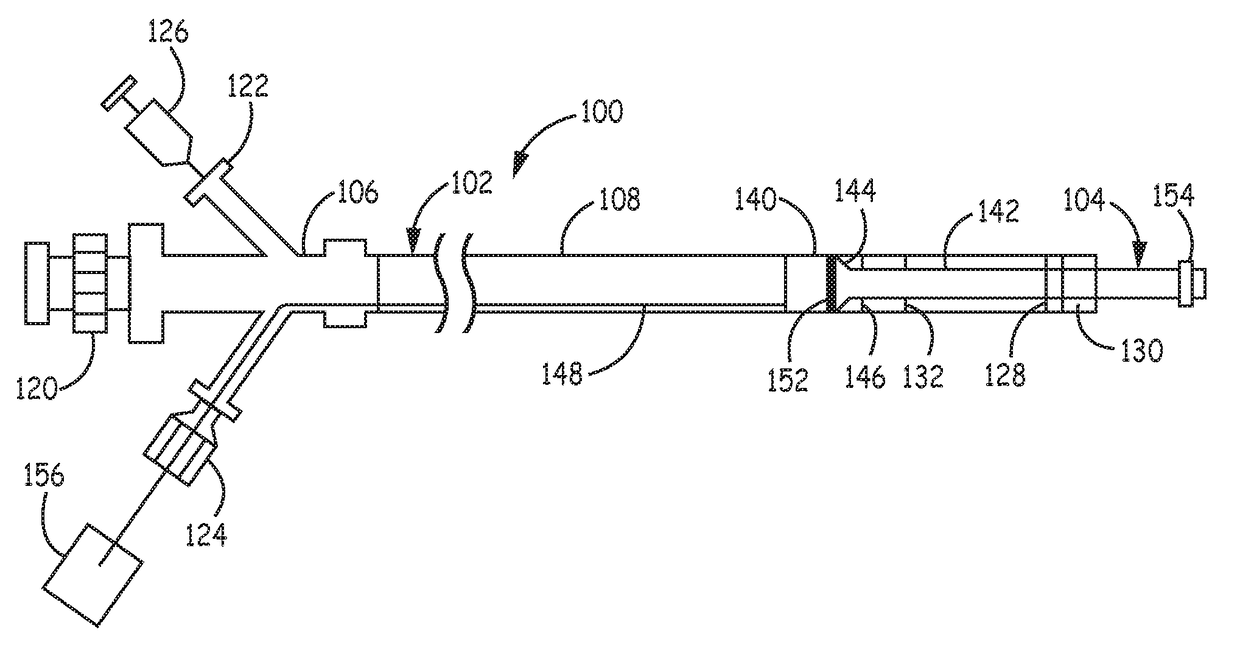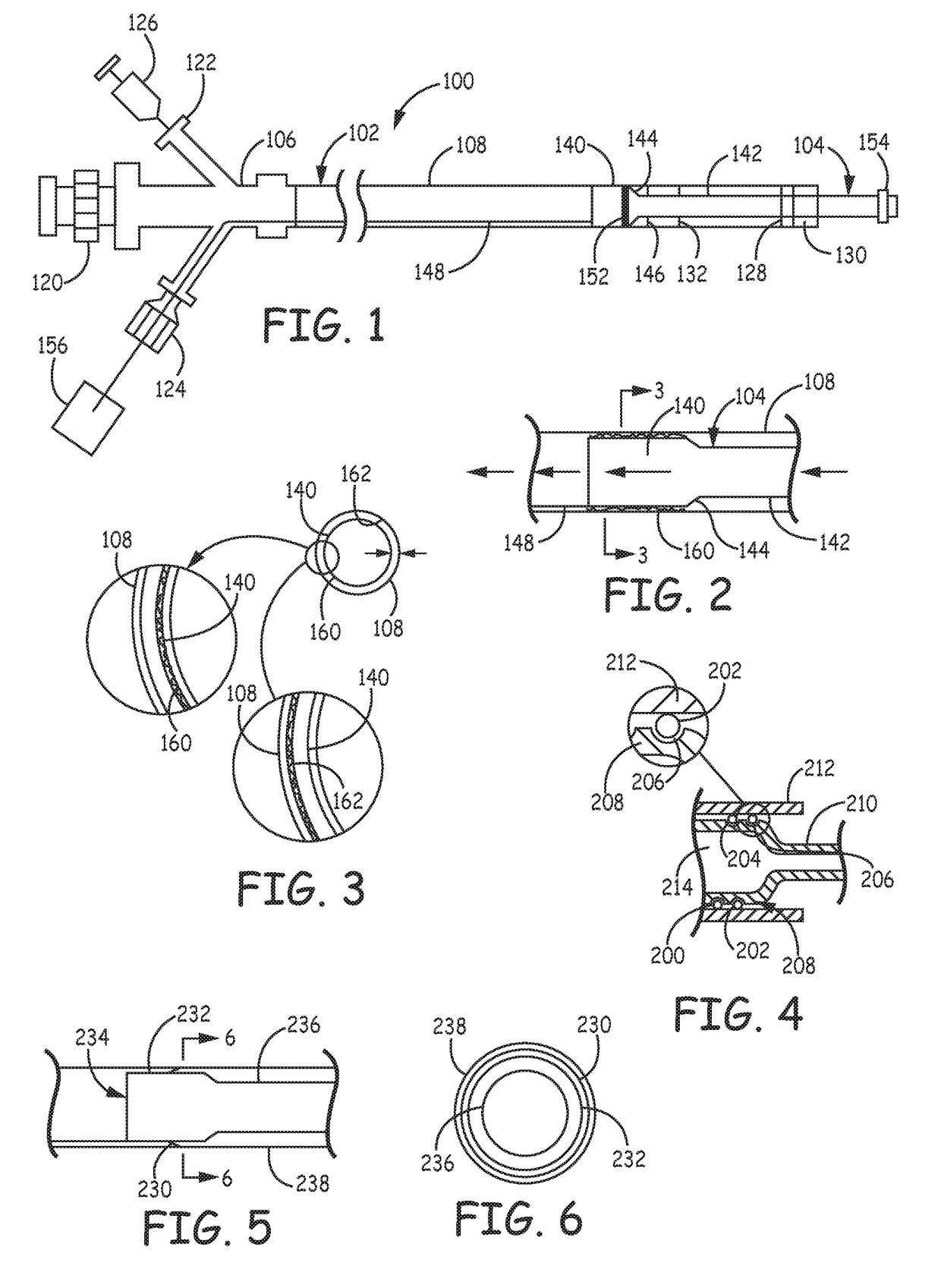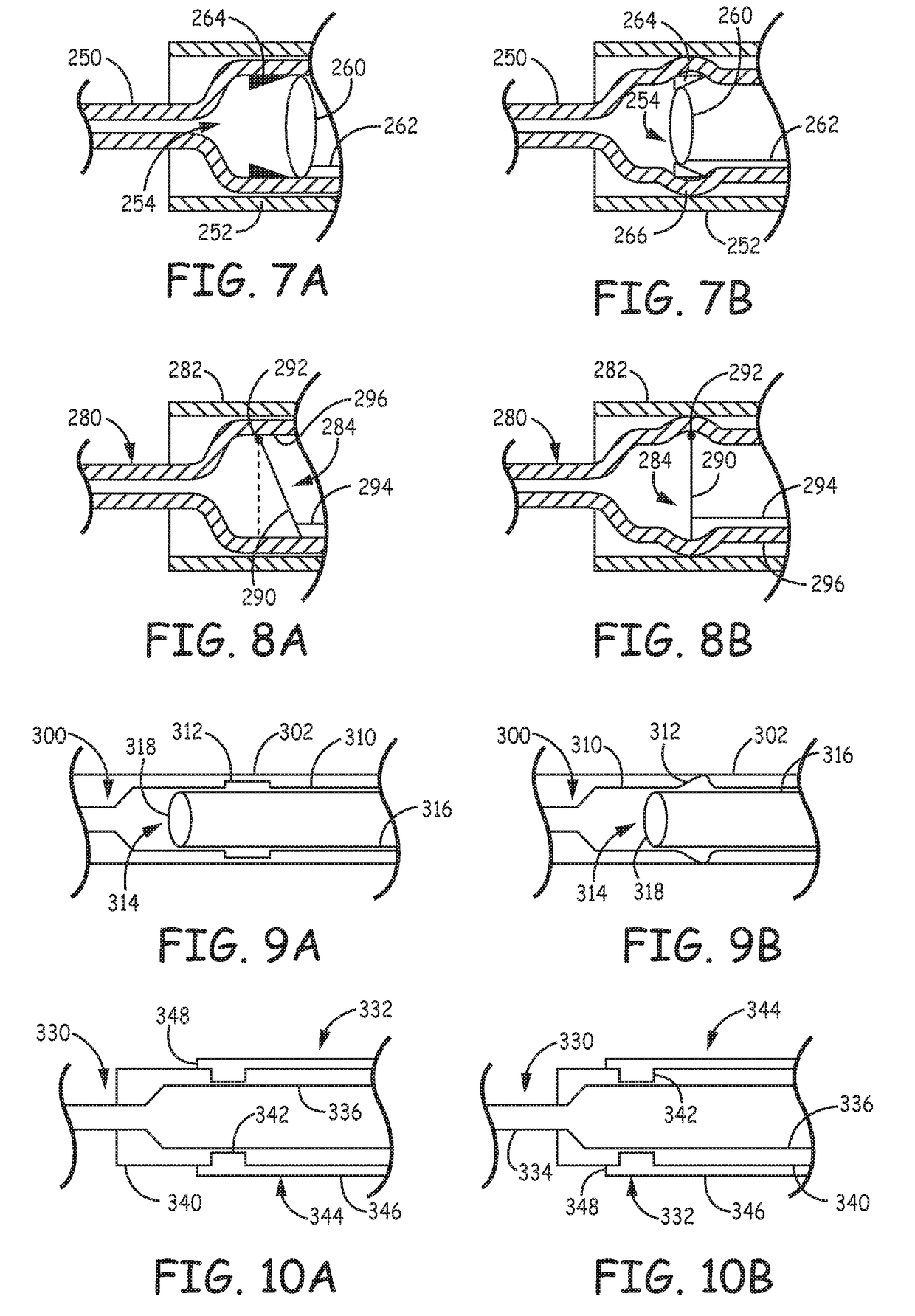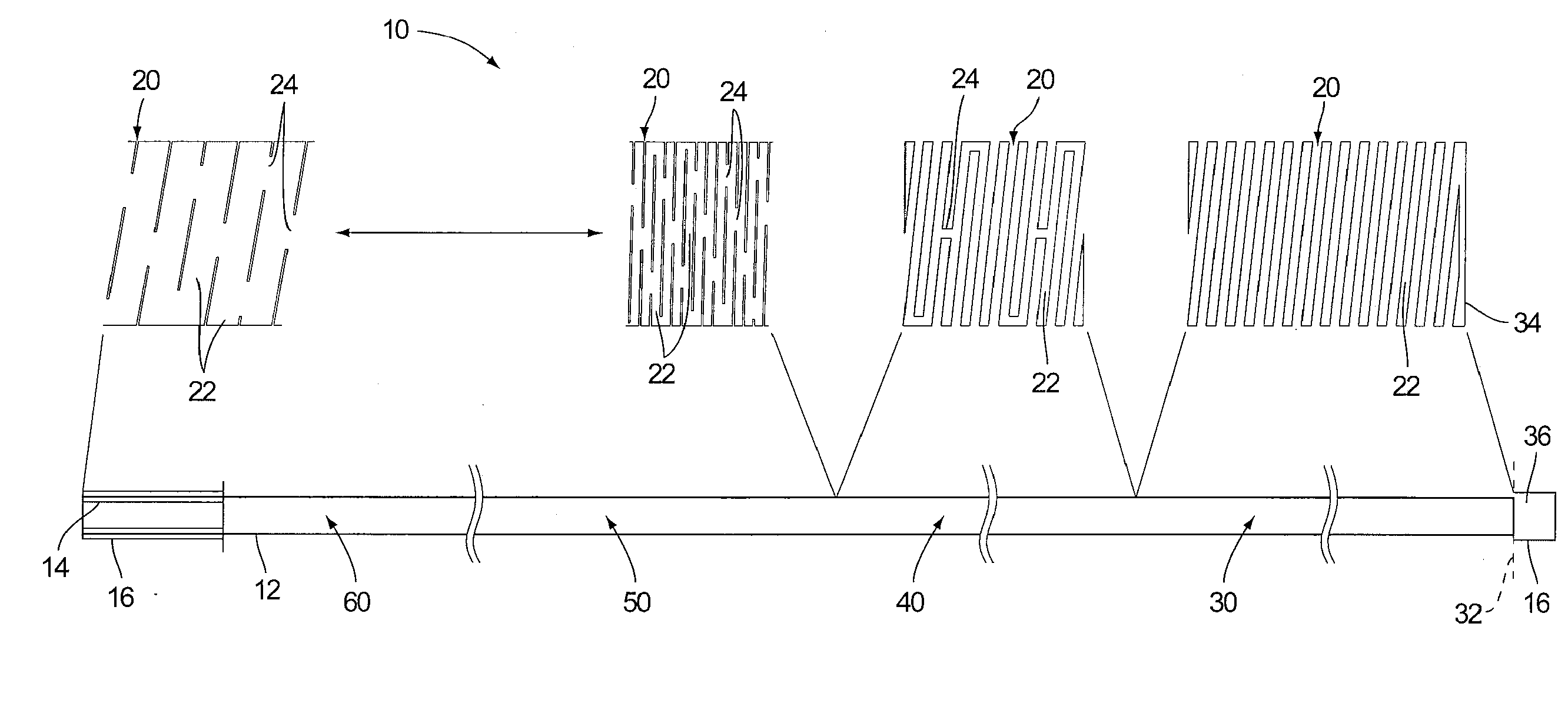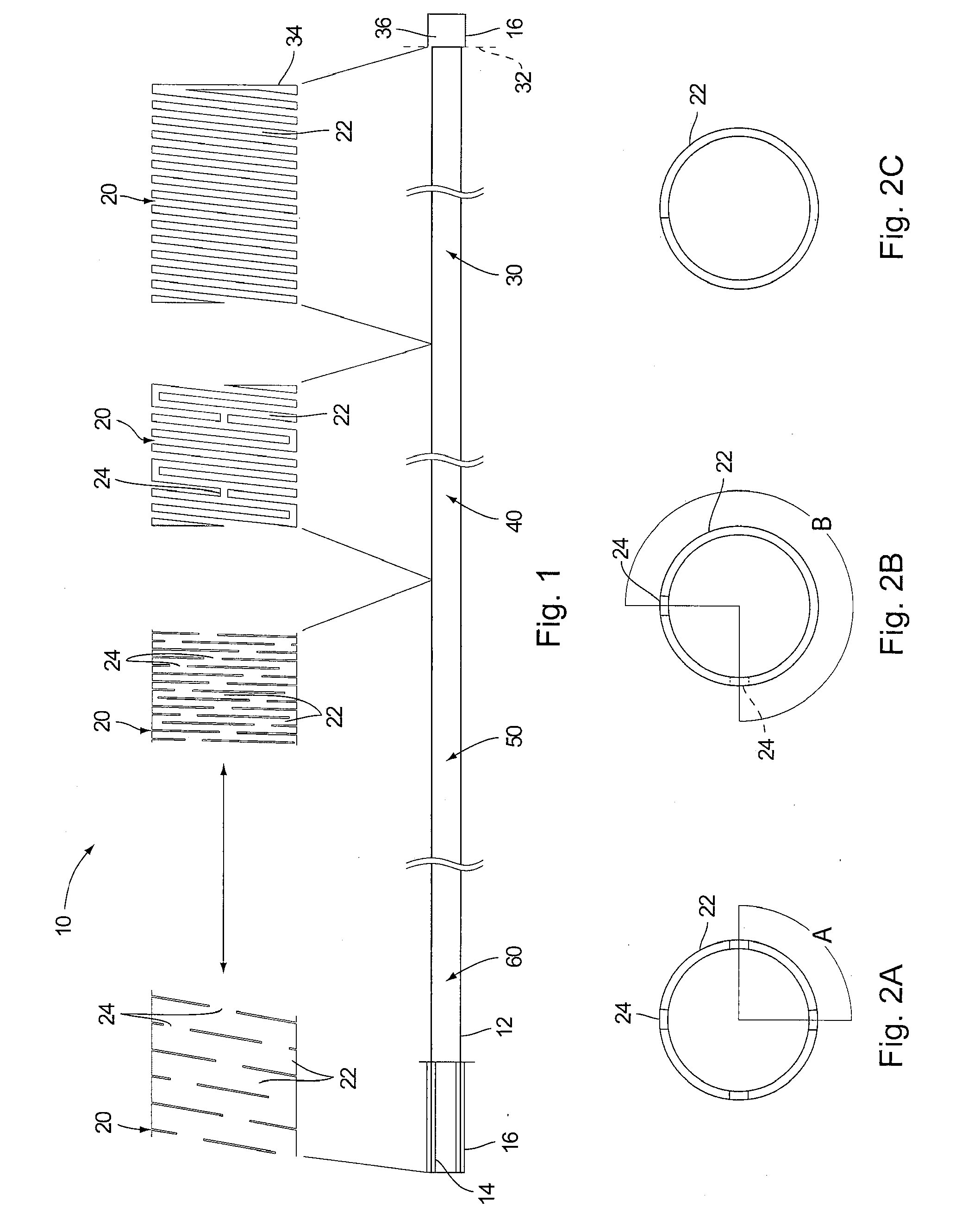Patents
Literature
Hiro is an intelligent assistant for R&D personnel, combined with Patent DNA, to facilitate innovative research.
352 results about "Guide catheter" patented technology
Efficacy Topic
Property
Owner
Technical Advancement
Application Domain
Technology Topic
Technology Field Word
Patent Country/Region
Patent Type
Patent Status
Application Year
Inventor
Steerable guide catheters and methods for their use
ActiveUS20060135961A1Improve navigabilityOptimal torque transferGuide needlesEar treatmentAccess routeTurning radius
Methods for easy, atraumatic access to areas of the vasculature that are otherwise difficult to access, using steerable guide catheters constructed with components that are selected to provide optimal navigability, torque transfer, and push ability for a variety of typical percutaneous access routes. The catheter wall thickness in the deflecting segment of the guide catheter is about 1 French (⅓ mm) or less, and includes a slotted deflection tube, and this construction allows a very tight turning radius which in turn enables guide catheter access to regions of the vasculature that are otherwise inaccessible.
Owner:BIOCARDIA
System and method for delivering a mitral valve repair device
InactiveUS20070073391A1Promote progressIncrease the diameterHeart valvesBlood vesselsCoronary sinusMitral valve leaflet
A system and method is provided for treating a mitral valve. The method preferably includes advancing a guide catheter to an ostium of the coronary sinus and advancing a delivery catheter containing a medical implant through the guide catheter and into the coronary sinus. The delivery catheter has an inner member on which the medical implant is held and an outer sheath which is retractable for deploying and releasing the medical implant. In one embodiment, the medical implant has proximal and distal anchors and a bridge containing resorbable material. The inner member may have a flexible sleeve for gripping and holding a portion of the outer sheath, thereby providing a releasable attachment mechanism. In another embodiment, the inner member may include an inflatable balloon having a tapered distal region which extends from the outer sheath for providing an atraumatic tip. The inflatable balloon may also be used to expand the medical implant and to grip the outer sheath.
Owner:EDWARDS LIFESCIENCES CORP
Intravascular system for occluded blood vessels and guidewire for use therein
A system and method for opening a lumen in an occluded blood vessel, e.g., a coronary bypass graft, of a living being. The system comprises an atherectomy catheter having a working head, e.g., a rotary impacting impeller, and a debris extraction sub-system. The atherectomy catheter is located within a guide catheter. The working head is arranged to operate on, e.g., impact, the occlusive material in the occluded vessel to open a lumen therein, whereupon some debris may be produced. The debris extraction sub-system introduces an infusate liquid at a first flow rate adjacent the working head and withdraws that liquid and some blood at a second and higher flow rate, through the guide catheter to create a differential flow adjacent the working head, whereupon the debris is withdrawn in the infusate liquid and blood for collection outside the being's body. The introduction of the infusate liquid may also be used to establish an unbalanced flow adjacent the working head to enable the atherectomy catheter to be steered hydrodynamically. A guide wire having an inflatable balloon on its distal end may be used with the atherectomy catheter to block the flow of debris distally, while enabling distal tissues to be perfused with an oxygenating liquid. At least one flow control port may be provided in the guide catheter to prevent collapse of the vessel being revascularized. A cradle is provided to fix the guide catheter and guide wire in position within the body of the being while enabling the atherectomy catheter to be advanced along the guide wire and through the guide catheter. The guide catheter includes a wear resistant coating and is constructed so that its distal end includes plural sections of different outside diameters, with the distal most section being of the smallest outside diameter. A control console is provided to establish various modes of operation of the system based on manual inputs via switches or voice commands via voice recognition circuitry. A video panel displays the various modes of operation and instructions to the operator.
Owner:KENSEY NASH CORP
Optical fiber shape sensing systems
A medical instrument system includes an elongate flexible instrument body with an optical fiber substantially encapsulated in a wall of the instrument body, the optical fiber including one or more fiber gratings. A detector is operatively coupled to the optical fiber and configured to detect respective light signals reflected by the one or more fiber gratings. A controller is operatively coupled to the detector, and configured to determine a twist of at least a portion of the instrument body based on detected reflected light signals. The instrument may be a guide catheter and may be robotically or manually controlled.
Owner:KONINKLIJKE PHILIPS ELECTRONICS NV
Subcutaneous port catheter system and associated method
A subcutaneous port catheter system includes a reservoir defining a chamber therein. The catheter system also includes a guide catheter attached to the reservoir. The guide catheter has a guide lumen and a distal guide orifice. The catheter system further includes an inner catheter attached to the reservoir. The inner catheter is positioned within the guide lumen and extends through the distal guide orifice. A method of advancing fluid into a blood vessel of a body of a patient is also disclosed.
Owner:MAGINOT CATHETER TECH
System for controlled delivery of stents and grafts
The present invention provides a delivery mechanism for percutaneously routing a stent or graft through the vascular system and procedures for addressing an aneurysm or an otherwise damaged vessel. The delivery system includes an outer tubular guide catheter 20, an inner tubular delivery (pusher) catheter 14 coaxially disposed and slidable relative to the outer guide catheter and an elongated flexible wire or cable 26 that is coaxially insertable through the lumen of the inner tubular catheter and that has a frusto-conical bead affixed at the distal end thereof which is sized to at least partially fit within the lumen of the inner pusher catheter when a proximally directed tension force is applied between the elongated flexible wire or cable 26 with respect to the pusher catheter 14. By inserting a compressed coil spring between a proximal end portion of the pusher catheter 14 and the proximal end portion of the cable 26, the requisite clamping force is maintained to secure the stent or graft to the distal end of the pusher catheter until the compression spring force is removed. With the stent or graft clamped to the distal end of the inner pusher catheter, it can be drawn within the lumen of the outer guide catheter for delivery therewith to the target site.
Owner:AGA MEDICAL CORP MS US
System and method of use for agent delivery and revascularizing of grafts and vessels
InactiveUS6905505B2Effectively revascularizingAvoid flowBalloon catheterCannulasImpellerBiological body
A system and method for opening a lumen in an occluded blood vessel, e.g., a coronary bypass graft, of a living being. The system comprises an atherectomy catheter having a working head, e.g., a rotary impacting impeller, and a debris extraction sub-system. The atherectomy catheter is located within a guide catheter. The working head is arranged to operate on, e.g., impact, the occlusive material in the occluded vessel to open a lumen therein, whereupon some debris may be produced. The debris extraction sub-system introduces an infusate liquid at a first flow rate adjacent the working head and withdraws that liquid and some blood at a second and higher flow rate, through the guide catheter to create a differential flow adjacent the working head, whereupon the debris is withdrawn in the infusate liquid and blood for collection outside the being's body. The introduction of the infusate liquid may also be used to establish an unbalanced flow adjacent the working head to enable the atherectomy catheter to be steered hydrodynamically. A guide wire having an inflatable balloon on its distal end may be used with the atherectomy catheter to block the flow of debris distally, while enabling distal tissues to be perfused with an oxygenating liquid. At least one flow control port may be provided in the guide catheter to prevent collapse of the vessel being revascularized. A cradle is provided to fix the guide catheter and guide wire in position within the body of the being while enabling the atherectomy catheter to be advanced along the guide wire and through the guide catheter.
Owner:KENSEY NASH CORP
Optical fiber shape sensing systems
A medical instrument system includes an elongate flexible instrument body with an optical fiber substantially encapsulated in a wall of the instrument body, the optical fiber including one or more fiber gratings. A detector is operatively coupled to the optical fiber and configured to detect respective light signals reflected by the one or more fiber gratings. A controller is operatively coupled to the detector, and configured to determine a twist of at least a portion of the instrument body based on detected reflected light signals. The instrument may be a guide catheter and may be robotically or manually controlled.
Owner:KONINKLIJKE PHILIPS ELECTRONICS NV
Guide catheter having selected flexural modulus segments
InactiveUS6858024B1Prevent guide catheter back-outIncreasing back-out resistanceGuide needlesFlexible pipesFlexural modulusAortic arch
A guiding catheter for use in coronary angioplasty and other cardiovascular interventions which incorporates a plurality of segment of selected flexural modulus in the shaft of the device. The segments which have a different flexibility than the sections immediately proximal and distal to them, creating zones in the catheter shaft which are either more or less flexible than other zones of the shaft. The flexibility and length of the shaft in a given zone is then matched to its clinical function and role. A mid-shaft zone is significantly softer than a proximal shaft or distal secondary curve to better traverse the aortic arch shape without storing too much energy. A secondary zone section is designed to have maximum stiffness to provide optimum backup support and stability.
Owner:BOSTON SCI SCIMED INC
Replenishable stent and delivery system
InactiveUS6344028B1Simple and inexpensive to produceSimple and inexpensive to and useStentsBalloon catheterDelivery systemBlood vessel
Apparatus and a method for treating an irregularity in a wall of a vessel of a patient defined by an irregular or afflicted wall portion with adjacent normal wall portions comprises a catheter having a distal end portion for being guided through the vessel to the site of the irregularity. A balloon associated with said distal end portion of the catheter for selective inflating to contact the walls of the vessel urges a stent carried by the distal end portion of the catheter in a constricted condition for passage through the vessel into an expanded form with the stent spanning the afflicted wall portion and contacting the adjacent wall portions. The catheter is formed with lumens for inflating the balloon, for receiving a guidewire for guiding the catheter through the vessel, and for connecting a port in the catheter proximate the afflicted wall portion to enable delivery of a therapeutic agent into the vessel to contact the stent and the irregular wall portion.
Owner:BOSTON SCI CORP
Soft tip guiding catheter and method of fabrication
The present invention relates to medical vascular catheters adapted to be inserted into a blood vessel from an incision through the skin of a patient for introducing ther devices or fluids for diagnostic or therapeutic purposes, and particularly to an improved distal soft tip or segment attachment with a relatively stiff proximal catheter shaft. A tubular sleeve is bonded through the application of pressure and heat to a distal portion of the catheter shaft and a proximal portion of the distal segment of soft distal tip bridging the attachment junction. In the preferred method, the catheter shaft distal end is aligned with the distal segment or soft tip proximal end and the sleeve is fitted over the attachment junction. A heat shrink tube is fitted over the sleeve and adjoining portions of the catheter shaft and the distal segment or distal soft tip and heat is applied. The shrinkage force of the heat shrink tube over the assembly of the tubular sleeve overlying and bridging the attachment junction and the applied heat melts and force the materials of the tubular sleeve and the catheter shaft and the distal segment or distal soft tip together to fill interstitial spaces of the attachment junction and reduces the outer diameter of the sleeve. The heat shrink tube is removed after the assembly cools and solidifies. Preferably, the catheter shaft distal end and the soft tip or intermediate segment proximal end are each formed with a like plurality of ungular cut sections that are complementary in shape to one another, whereby the ungular cut sections are aligned with and mated together along the attachment junction.
Owner:MEDTRONIC INC
Everting stent and stent delivery system
Devices and methods for delivering stents to target vessel regions, including stent delivery through microcatheters to narrow cerebral arteries. One stent delivery device includes a stent having the distal region everted over the distal end of a delivery tube, having the everted stent distal end captured by a distal element of a elongate release member disposed through the delivery tube. The delivery tube can have a distal taper to a small profile distal end. The everted stent distal region can be captured between the release member distal element and the surrounding delivery tube distal region walls. The captured and everted stent can be distally advanced to a target site, followed by manipulating the release member to free the captured stent. Some devices utilize distal advancement of the release member while other devices use proximal retraction of the release member to free the captured stent distal end. Once released, the stent is free to self-expand or be expanded against the surrounding blockage and / or vessel walls. In some methods, a guide catheter or microcatheter is also included and disposed about the everted and captured stent to advance the stent, delivery tube, and release member to a location near the site to be stented. The devices and methods provide stent delivery not requiring an enclosing delivery sheath about the stent. The everted stent can thus have a very small distal profile enabling small diameter vessels to be crossed and treated.
Owner:TYCO HEALTHCARE GRP LP
Microwave ablation catheter and method of utilizing the same
A microwave ablation system configured for use in luminal network is provided. The microwave ablation system includes a microwave energy source. A tool for treating tissue is provided with the microwave ablation system. An extended working channel is configured to provide passage for the tool. A locatable guide catheter is positionable through the extended working channel and configured to navigate the extended working channel adjacent the target tissue. The microwave ablation system includes a navigation system that is configured for guiding the tool, extended working channel or the locatable guide through a luminal network following a predetermined determined pathway to the target tissue. One or more imaging modalities may be utilized for confirming placement of the tool within target tissue.
Owner:TYCO HEALTHCARE GRP LP
Self-contained power-assisted syringe
A self-contained and hand-held power-assisted syringe is provided which is suitable for the controlled injection of fluid material during medical procedures such as coronary angiography procedures which utilize small-bore and small sized guide catheter systems. The present invention provides a greater degree of injection power on-demand than was previously possible in a portable and hand-held syringe; and it can deliver larger volumes of radiopaque contrast medium at greater pressures than was previously possible using a conventional manual syringe. The power assisted syringe, along with all components necessary for its effective use and operation, may be pre-packaged and steriled within a single container and then disposed of after use.
Owner:KIM DUCKSOO +2
Method and System for Image Based Device Tracking for Co-registration of Angiography and Intravascular Ultrasound Images
ActiveUS20120059253A1Ultrasonic/sonic/infrasonic diagnosticsImage enhancementVascular ultrasoundFluorescence
A method and system for co-registration of angiography data and intra vascular ultrasound (IVUS) data is disclosed. A vessel branch is detected in an angiogram image. A sequence of IVUS images is received from an IVUS transducer while the IVUS transducer is being pulled back through the vessel branch. A fluoroscopic image sequence is received while the IVUS transducer is being pulled back through the vessel branch. The IVUS transducer and a guiding catheter tip are detected in each frame of the fluoroscopic image sequence. The IVUS transducer detected in each frame of the fluoroscopic image sequence is mapped to a respective location in the detected vessel branch of the angiogram image. Each of the IVUS images is registered to a respective location in the detected vessel branch of the angiogram image based on the mapped location of the IVUS transducer detected in a corresponding frame of the fluoroscopic image sequence.
Owner:SIEMENS HEALTHCARE GMBH
Torquing device delivered over a guidewire to rotate a medical fastener
The invention provides an endovascular torquing device for a rotational fastener and a system and method for endovascular delivery of a rotational fastener to a treatment site within a patient. The torquing device comprises a flexible body portion having a guidewire lumen extending longitudinally there through. A coupling portion formed on a distal end of the body portion interfaces with a rotational fastener positioned within a vessel. The system comprises a guide catheter, at least one guidewire, at least one rotational fastener disposed on the guidewire, and a torquing device. The guide catheter is positioned adjacent to a treatment site, and the rotational fastener and guidewire are delivered through the guide catheter to the treatment site. The torquing device, which has a guidewire lumen extending longitudinally through at least a portion of the device, tracks over the guidewire to engage and rotate the fastener.
Owner:MEDTRONIC VASCULAR INC
Catheter pull wire actuation mechanism
A catheter has an elongate tubular component that defines a pull wire lumen, which extends along at least a portion of a length thereof. A pull wire extends within the pull wire lumen with a distal end of the pull wire being secured near a distal end of the catheter. The catheter includes a pull wire actuation mechanism slidably disposed thereon that is operably coupled to a proximal end of the pull wire. The pull wire actuation mechanism includes a first or upper housing portion that is longitudinally translatable in a first direction relative to the guide catheter and a second or lower housing portion that is longitudinally translatable in an opposite, second direction relative to the catheter to actuate the pull wire and selectively operate the distal end thereof.
Owner:MEDTRONIC VASCULAR INC
Sheathless Guide Catheter Assembly
A guide catheter assembly includes a dilator and a guide catheter. The dilator includes a dilator lumen extending from a distal opening at a distal end to a proximal opening at a proximal end, and a side exit port proximal of the distal opening and in communication with the dilator lumen. The guide catheter includes a proximal end, a distal end, and a guide lumen extending therebetween. The dilator and the guide lumen are sized such that the dilator can pass through the guide lumen. The dilator and the guide catheter are sized such that with the proximal end of the dilator generally aligned along an axis with the proximal end of the guide catheter, the distal end of the dilator extends distally past the distal end of the guide catheter and the side exit port is disposed distal of the distal end of the guide catheter.
Owner:MEDTRONIC VASCULAR INC
Cardiac vein lead and guide catheter
InactiveUS6871085B2Easy steeringSmall sizeTransvascular endocardial electrodesSurgical instrument detailsWalking around obstaclesDistal segment
A guide catheter and medical lead are provided wherein the lead may be used as a pull wire to steer the guide catheter. The guide catheter is provided with a flexible distal segment and the lead is provided with a distal engaging member, which may also serve as an electrode. The distal engaging member interacts with the distal catheter end such that traction applied to the proximal lead end causes flexion of the distal segment of the catheter to advance the flexible distal segment between a non-flexed position and a flexed position, allowing the catheter to be steered around obstacles.
Owner:MEDTRONIC INC
Medical Device and Method for Treatment of a Sinus Opening
A medical device and method for the treatment of a sinus opening includes a handle, a guide catheter, a guide wire, a balloon catheter, a guide wire movement mechanism and a balloon catheter movement mechanism. The handle has proximal and distal ends and a longitudinal axis along the length of the handle. The guide catheter is attached to the distal end of the handle and has a catheter lumen. The guide wire and balloon catheter are both disposed at least partially in the handle and catheter lumen. The guide wire movement mechanism and the balloon catheter movement mechanism are both operatively disposed on the handle. In addition, the guide wire movement mechanism is configured for advancement and retraction of the guide wire through the handle and catheter lumen by user operation of the guide wire movement mechanism. Moreover, the guide wire movement mechanism includes an integrated guide wire locking and rotation mechanism configured for rotation of the guide wire and for securely locking and unlocking the guide wire to the guide wire movement mechanism. Furthermore, the balloon catheter movement mechanism is configured for advancement and retraction of the balloon catheter through the handle and catheter lumen by user operation of the balloon catheter movement mechanism.
Owner:ACCLARENT INC
Occlusion balloon catheter with longitudinally expandable balloon
ActiveUS7198632B2Increase expansionConstant radial expansionStentsBalloon catheterBalloon catheterBalloon dilatation
Owner:BOSTON SCI SCIMED INC
Magnetic navigation manipulation apparatus
InactiveUS20060144407A1Shorten the timeEasy accessCatheterSurgical manipulatorsMarine navigationBlood vessel
The inventive apparatus may be inserted into a guiding catheter or other thru-lumen catheters and tubing to assist in navigating and placing the distal end of the guiding catheter or other thru-lumen catheters and tubing at a target location within a patient, by utilizing an externally applied magnetic field to align a plurality of magnetically responsive elements on the apparatus towards the target location. The guiding catheter or other thru-lumen catheters and tubing is then advanced and guided by the apparatus, which facilitates access of the guiding catheter or other thru-lumen catheters and tubing to the target vessel to save time during the catheter placement procedure. The apparatus in combination with magnetic navigation also provides support to hold the guiding catheter or other thru-lumen catheters and tubing in place to resist back out of the catheter.
Owner:STEREOTAXIS
Implant delivery device
InactiveUS7758624B2Minimize traumaRobust and simple for placementStentsBile ductsMedical treatmentGuide catheter
Disclosed is a system for delivering self-expanding stents to stenting sites within the body, which minimizes trauma to the affected tissue of the patient yet, at the same time, offers the medical practitioner a robust and simple system for stent placement. These technical effects are achieved by providing a catheter which receives the stent at its proximal end and guides it to the stenting site. The catheter serves as a guide catheter and has a tapered distal tip from which the stent emerges at the site of stenting. A stent pusher can be used which abuts the proximal end of the stent inside the guide catheter. The tapered tip can be molded and can be integral with the catheter shaft or bonded to it. The guide catheter can include a figurated portion towards its distal tip. The system has particular application to stenting the carotid artery.
Owner:ANGIOMED GMBH & CO MEDIZINTECHNIK KG
Translation dilator and stand alone vascular guide catheter
Systems and methods for delivering implantable devices, catheters, or substances in or near and / or restoring flow through body lumens, such as blood vessel lumens are described. A catheter having a proximal portion of a first diameter and a distal portion of a second diameter (smaller than the first diameter) is advanced into a body lumen. The distal portion of the catheter is caused to expand to a diameter that is larger than the second diameter but no larger than the first diameter. A working device is then advanced out of the distal end of the catheter and used to remove obstructive matter, deliver an implantable device or substance and / or restore flow. The distal portion can be reduced in diameter prior to removal from the body. A stand alone, guide catheter is also disclosed possessing high resistance to kinking even with a very thin wall.
Owner:TYCO HEALTHCARE GRP LP
Methods using a dual balloon telescoping guiding catheter
A guiding catheter comprises an outer guide having a guide lumen and an annular balloon mounted to a distal end of the outer guide, and an inner guide movably disposed within the guide lumen of the outer guide, the inner guide comprising a fluted balloon mounted to a distal end of the inner guide. A method involves selectably pressurizing and depressurizing the annular balloon to control occlusion of fluid flow relative to the annular balloon, and selectably pressurizing and depressurizing the fluted balloon independently of pressurizing and depressurizing the annular balloon to permit perfusion of fluid flow relative to the fluted balloon and control anchoring of the fluted balloon within a generally tubular structure.
Owner:CARDIAC PACEMAKERS INC
Magnetically guided catheter
ActiveUS20100174177A1Low costHigh performanceCatheterDiagnostic recording/measuringElectrically conductiveGuiding catheter
A catheter comprising a flexible tubing having a proximal end and a distal end. An electrode assembly is attached to the distal end of the flexible tubing. The electrode assembly includes an electrically conductive tip electrode and a coupler which is connected between the tip electrode and the distal end of the flexible tubing. The coupler and the tip electrode are coupled by an interlocking connection. A first magnet is at least partially housed in the coupler. A fluid lumen extends through the flexible tubing to the coupler. The fluid lumen extends completely through the first magnet and connects to at least one port formed in the electrode assembly. A second magnet is spaced from the electrode assembly along a longitudinal axis of the tubing. The first magnet and the second magnet are responsive to an external magnetic field to selectively position and guide the electrode assembly within a body of a patient.
Owner:ST JUDE MEDICAL ATRIAL FIBRILLATION DIV
System for the controlled delivery of stents and grafts
The present invention provides a delivery mechanism for percutaneously routing a stent or graft through the vascular system and procedures for addressing an aneurysm or an otherwise damaged vessel. The delivery system includes an outer tubular guide catheter 20, an inner tubular delivery (pusher) catheter 14 coaxially disposed and slidable relative to the outer guide catheter and an elongated flexible wire or cable 26 that is coaxially insertable through the lumen of the inner tubular catheter and that has a frusto-conical bead affixed at the distal end thereof which is sized to at least partially fit within the lumen of the inner pusher catheter when a proximally directed tension force is applied between the elongated flexible wire or cable 26 with respect to the pusher catheter 14. By inserting a compressed coil spring between a proximal end portion of the pusher catheter 14 and the proximal end portion of the cable 26, the requisite clamping force is maintained to secure the stent or graft to the distal end of the pusher catheter until the compression spring force is removed. With the stent or graft clamped to the distal end of the inner pusher catheter, it can be drawn within the lumen of the outer guide catheter for delivery therewith to the target site.
Owner:AMPLATZ KURT
Method and Apparatus Useful for Transcatheter Aortic Valve Implantation
InactiveUS20140018912A1Reduce contactReduce riskBalloon catheterHeart valvesAscending aortaGuide tube
A guide catheter (30) is described for introduction into a patient's vasculature, to provide a substantially continuous guide lumen (28) within the vasculature to the ascending aorta (34), through which one or more other functional catheters (44) may be introduced and removed during the procedure. The guide catheter includes an aligner (70) at its distal region for aligning the position and / or inclination of the distal region of the guide catheter with respect to the ascending aorta. The aligner includes an embolic protection filter (88). The guide catheter is made of material collapsible / distensible in cross section to adopt a small shape when no catheter is present inside, and to distend to a large shape to accommodate passage of functional catheter therethrough. The cross-section shape collapses / distends by folding / unfolding of material without elastic stretching of the material.
Owner:SYMETIS
Catheter systems for applying effective suction in remote vessels and thrombectomy procedures facilitated by catheter systems
A suction catheter system is described with a suction nozzle that can extend from a guide catheter of the like. The suction nozzle can be positioned by tracking the suction nozzle through a vessel while moving a proximal portion of the suction extension within the lumen of the guide catheter. A suction lumen extends from the proximal end of the guide catheter through at least part of the guide catheter central lumen and through the suction tip. Desirable suction flow can be established using the guide lumen to facilitate the suction. Also, a delivery catheter is described with an elastic tip that can track closely over a guidewire. The elastic tip of the delivery catheter can be expanded to provide for the delivery of medical devices past the tip.
Owner:MIVI NEUROSCI INC
Guide Catheters
InactiveUS20110077620A1High strengthIncrease flexibilityMedical devicesCatheterMedicineBiomedical engineering
Owner:NFOCUS NEUROMEDICAL
Features
- R&D
- Intellectual Property
- Life Sciences
- Materials
- Tech Scout
Why Patsnap Eureka
- Unparalleled Data Quality
- Higher Quality Content
- 60% Fewer Hallucinations
Social media
Patsnap Eureka Blog
Learn More Browse by: Latest US Patents, China's latest patents, Technical Efficacy Thesaurus, Application Domain, Technology Topic, Popular Technical Reports.
© 2025 PatSnap. All rights reserved.Legal|Privacy policy|Modern Slavery Act Transparency Statement|Sitemap|About US| Contact US: help@patsnap.com
